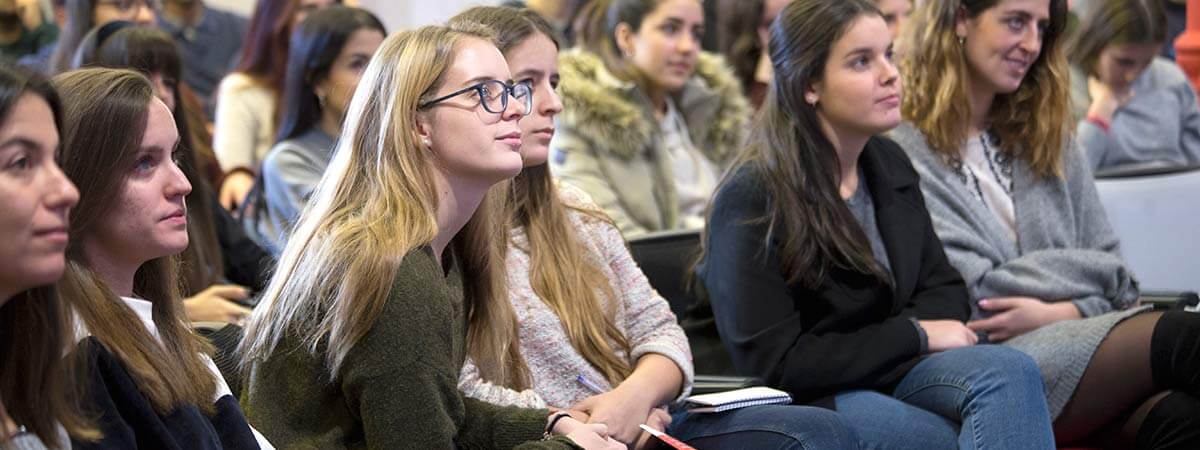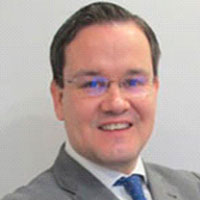Master’s Degree in Behavioral Problems in Educational Centers

Innovative program to train professionals capable of working on coexistence plans and school mediation
The program offers the professors specific guidelines for confronting the principal behavioral problems that can be found in the classroom (lack of discipline, challenging authority, attention deficit / hyperactivity disorder, etc.), becoming an expert in conflict mediation.
Currently in the different Autonomous Regions, diverse actions aimed at the improvement of school coexistence are being put into motion. With this master’s degree the student will be capable of responding to the demands established in the legislation with respect to the Center’s Coexistence Plan.
The pedagogical model of the master's degree is based on research in executive intelligence. The program offers teachers specific guidelines to deal with the main behavior problems that they may encounter in the classroom (lack of discipline, defiance of authority, attention deficit hyperactivity disorder, etc.), becoming an expert in conflict mediation.
Student profile: Master’s degree aimed at professionals of education concerned with the improvement in coexistence and the reduction of conflicts in educational centers.
Admission profile: The admission profile for the University Master's Degree in Behavior Problems in Educational Centers from the Antonio de Nebrija University is defined as follows: All applicants who meet the requirements imposed by current legislation may access the Master's Program in Behavior Problems in Educational Centers; candidates must be graduates of an associate’s degree, bachelor's degree, or master's degree in Education, Social Work or Psychology.
Graduate profile: The graduate profile is defined in the following terms: Professionals with solid training in preventing and addressing conflicts in educational centers through the use of different intervention techniques aimed at the management and resolution of conflicts at various educational levels and contexts. Graduates of the University Master's Degree in Behavior Problems in Educational Centers will have the knowledge, skills and abilities necessary to prevent and address different conflicts in educational contexts, promoting and improving school coexistence, which will have an impact on the improvement of their teaching. This is, therefore, a well-defined graduate profile, that of someone who will be able to carry out his/her work in the educational field, in a formal or non-formal setting, complementing the training received in preventing and responding to the different behavioral problems that can be found in educational contexts (lack of discipline, defiance of authority, disruptive behavior in the classroom, school violence, bullying, attention deficit disorder, behavioral disorder, etc.). In addition, through this postgraduate training, students will acquire skills to perform advisory functions and/or work on the Coexistence Plan, as well as to adapt the knowledge and skills acquired to other professional fields. Thus, they will be able to carry out their professional career in Early Childhood, Primary and/or Secondary Education centers, psychopedagogical consulting offices, school coexistence commissions, mediation teams, leisure and free time centers, among others.
Official Degree:Master’s Degree in Behavioral Problems in Educational Centers
Center responsible:School of Language and Education
Branch of knowledge: Social and Legal Sciences
Academic year it was introduced: 2020
Openings available:: 300
Total Credits:60 credits.
Minimum of 12 ECTS credits and maximum of 60 ECTS credits per enrollment and academic period.
Type of Education: Online
Academic Regulations: General student’s regulations. Credit transfer and recognition. Regulation of student participation. Common procedures for carrying out the Final Research Project
University Services: [+info]
Internal Quality Assurance System System managers Incidents, Suggestions and Complaints Job placement report and assessment of training received
Professional practices in pioneering institutions in the intervention of conduct problems
Curriculum
The student must complete 60 credits
First Semester 30 ECTS
- 6 ECTS | Principal behavioral problems in the classroom: causes and risk factors
- 6 ECTS | ADHD and Behavioral Disorders
- 6 ECTS | Social and emotional aspects of behavior
- 6 ECTS | Prevention and mediation of conflicts in the classroom
- 6 ECTS | Assertiveness and conflict resolution
Second Semester 30 ECTS
- 6 ECTS | Developing and maintaining appropriate behavior
- 6 ECTS | Cognitive techniques
- 6 ECTS | Physiological techniques
- 6 ECTS | External internships
- 6 ECTS | Final Research Project
Professors
| Profesores Professors | Porcentaje de Doctores Percentage of PhD holders |
| 95 | 75% |
 Nuria Camuñas Sánchez-Paulete
Vicedecana de la Facultad de Lenguas y Educación
Nuria Camuñas Sánchez-Paulete
Vicedecana de la Facultad de Lenguas y Educación Directora del Departamento de Educación
Directora de Trabajo Fin de Máster Vice Dean of the Faculty of Languages and Education
Director of the Department of Education
Director of the Master's Thesis Doctora en Psicología por la UCM. Máster en Intervención en la Ansiedad y el Estrés (UCM). Licenciada con grado en Psicología (UCM). Directora del Departamento de Educación, Facultad de Lenguas y Educación. Profesora de grado y postgrado en esa misma facultad. Docente de distintos cursos de formación y máster, sobre ansiedad, emociones y educación, estrés, modificación de conducta y dificultades del aprendizaje. Autora de distintas publicaciones y presentaciones en congresos relacionadas con procesos cognitivos, emoción y educación, prevención y control del estrés, etc. Miembro del grupo de investigación CEDI (Cognición, Educación y Diferencias Individuales). Otras líneas de investigación: Cognición, Emoción, Salud y Educación.
 Mónica Jiménez Astudillo
Directora del MU en Problemas de Conducta en Centros Educativos
Director of the MD in Behavior Problems in Educational Centers
Doctora en Ciencias de la Educación. Licenciada en Pedagogía Máster en educación especial y Máster universitario en formación del profesorado en la especialidad de orientación educativa por la Universidad Complutense de Madrid. Cuenta con el postgrado experto en formación y atención temprana en contextos diversos y vulnerables por la universidad nacional de educación a distancia. Posee experiencia en los ámbitos de atención temprana realizando funciones de detección, evaluación e intervención en niños con trastornos en el neurodesarrollo y riesgo de padecerlos y el asesoramiento a sus familias. Sus líneas de investigación y publicaciones se focalizan en la psicología del desarrollo las alteraciones y trastornos del neurodesarrollo el alto riesgo biopsico social y la atención a la primera infancia y sus familias. Ha participado en diversos congresos sobre educación y psicología.
Mónica Jiménez Astudillo
Directora del MU en Problemas de Conducta en Centros Educativos
Director of the MD in Behavior Problems in Educational Centers
Doctora en Ciencias de la Educación. Licenciada en Pedagogía Máster en educación especial y Máster universitario en formación del profesorado en la especialidad de orientación educativa por la Universidad Complutense de Madrid. Cuenta con el postgrado experto en formación y atención temprana en contextos diversos y vulnerables por la universidad nacional de educación a distancia. Posee experiencia en los ámbitos de atención temprana realizando funciones de detección, evaluación e intervención en niños con trastornos en el neurodesarrollo y riesgo de padecerlos y el asesoramiento a sus familias. Sus líneas de investigación y publicaciones se focalizan en la psicología del desarrollo las alteraciones y trastornos del neurodesarrollo el alto riesgo biopsico social y la atención a la primera infancia y sus familias. Ha participado en diversos congresos sobre educación y psicología.
 Camino Ruiz Rodríguez
Coordinadora del Máster en Problemas de Conducta en Centros Educativos
Coordinator of the MD in Behavior Problems in Educational Centers
Titulada en Psicopedagogía por la Universidad de Valladolid, con Magisterio en Educación Especial y Magisterio en Educación Primaria por la Universidad de Burgos. Especializada en Gestión de Recursos Humanos y Gestión Empresarial por la Universidad de Alcalá de Henares y como profesora de religión católica por el instituto superior de ciencias religiosas "San Jerónimo" vinculado a la facultad de Teología del Norte de España.
Profesora universitaria en el Grado de Educación Infantil, Grado de Educación Primaria, Máster en Psicopedagogía, Máster en Dirección y Gestión para la Calidad de Centros Educativos, Máster en Enseñanza del Español para Extranjeros y Máster en Educación Secundaria, en distintas universidades de ámbito nacional.
Es directora de TFM y TFG y participa como miembro de tribunal de evaluación de proyectos de investigación fin de Máster y fin de Grado.
Camino Ruiz Rodríguez
Coordinadora del Máster en Problemas de Conducta en Centros Educativos
Coordinator of the MD in Behavior Problems in Educational Centers
Titulada en Psicopedagogía por la Universidad de Valladolid, con Magisterio en Educación Especial y Magisterio en Educación Primaria por la Universidad de Burgos. Especializada en Gestión de Recursos Humanos y Gestión Empresarial por la Universidad de Alcalá de Henares y como profesora de religión católica por el instituto superior de ciencias religiosas "San Jerónimo" vinculado a la facultad de Teología del Norte de España.
Profesora universitaria en el Grado de Educación Infantil, Grado de Educación Primaria, Máster en Psicopedagogía, Máster en Dirección y Gestión para la Calidad de Centros Educativos, Máster en Enseñanza del Español para Extranjeros y Máster en Educación Secundaria, en distintas universidades de ámbito nacional.
Es directora de TFM y TFG y participa como miembro de tribunal de evaluación de proyectos de investigación fin de Máster y fin de Grado.
cruizro@nebrija.es
 Clara Díaz-Cordovés Verbo
Coordinadora de alumnos del Máster en Problemas de Conducta en Centros Educativos
Student coordinator of the MD in Behavior Problems in Educational Centers
Titulada en Grado de maestro en Educación Primaria con la especialidad de Lengua, Lectura y Multiculturalidad, interesada en factores que afectan de forma directa en el alumnado, realiza cursos de ampliación profesional relacionados con acoso escolar, prevención del acoso escolar. Interesada de forma especial en TDAH, realiza trabajos voluntarios para con éste grupo. Titulada en Psicomotricidad Infantil y con especial interés en la atención al alumnado con discapacidad sensorial. Titulada en Grado Superior de Lengua de Signos-Guía Intérprete. Máster Universitario en Enseñanza del español para Extranjeros, con experiencia docente en la materia en centro especialista de Enseñanza del Español en Irlanda. Con intereses artísticos, violonchelista con experiencia de 18 años y pianista desde hace 14. Profesora de prácticas del Máster Universitario en Enseñanza de Español para Extranjeros. Universidad Francisco de Vitoria y gestora de prácticas. Profesora de prácticas del Máster Universitario en Competencias Docentes Avanzadas Universidad Camilo José Cela. Profesora de prácticas del Grado de Primaria con la Universidad Antonio de Nebrija. Personal especialista en orientación en centro de Formación Docente.
Clara Díaz-Cordovés Verbo
Coordinadora de alumnos del Máster en Problemas de Conducta en Centros Educativos
Student coordinator of the MD in Behavior Problems in Educational Centers
Titulada en Grado de maestro en Educación Primaria con la especialidad de Lengua, Lectura y Multiculturalidad, interesada en factores que afectan de forma directa en el alumnado, realiza cursos de ampliación profesional relacionados con acoso escolar, prevención del acoso escolar. Interesada de forma especial en TDAH, realiza trabajos voluntarios para con éste grupo. Titulada en Psicomotricidad Infantil y con especial interés en la atención al alumnado con discapacidad sensorial. Titulada en Grado Superior de Lengua de Signos-Guía Intérprete. Máster Universitario en Enseñanza del español para Extranjeros, con experiencia docente en la materia en centro especialista de Enseñanza del Español en Irlanda. Con intereses artísticos, violonchelista con experiencia de 18 años y pianista desde hace 14. Profesora de prácticas del Máster Universitario en Enseñanza de Español para Extranjeros. Universidad Francisco de Vitoria y gestora de prácticas. Profesora de prácticas del Máster Universitario en Competencias Docentes Avanzadas Universidad Camilo José Cela. Profesora de prácticas del Grado de Primaria con la Universidad Antonio de Nebrija. Personal especialista en orientación en centro de Formación Docente.
cdiazcordoves@nebrija.es
 María Cristina Adán Delgado
Directora de Trabajo Fin de Máster
Director of the Master's Thesis
Licenciada en química y doctora a través del Departamento de Ingeniería Química de la Universidad Autónoma de Madrid. Premio Extraordinario de Doctorado, 2008. Licenciada en Farmacia por la Universidad de Alcalá. Fue investigadora predoctoral en el Consejo Superior de Investigaciones Científicas (CSIC) en el que realizó el doctorado en el campo de la catálisis heterogénea para aplicaciones medioambientales y energéticas. En 2011, le fue concedido un contrato postdoctoral en el subprograma de investigación Juan de la Cierva del Ministerio de Economía y Competitividad para trabajar en el Departamento de Tecnología Química y Ambiental de la Universidad Rey Juan Carlos (URJC). Ha impartido clases en las licenciaturas de Ciencias Ambientales, Ingeniería Ambiental, Ciencia y Tecnología de los Alimentos e Ingeniería de Tecnologías Industriales y está acreditada para las figuras de ayudante doctor, contratado doctor y profesor de universidad privada por la ANECA. Ha participado en un total de 11 proyectos de investigación con diferentes centros de investigación y universidades, ha participado en un total de 35 congresos nacionales e internacionales y es autora de MUDTD_Dpto. Educación [4] 2020/21 30 publicaciones científicas en revistas internacionales de prestigio. En 2017 se registró como experto externo evaluador en la European Commission de propuestas de investigación.
María Cristina Adán Delgado
Directora de Trabajo Fin de Máster
Director of the Master's Thesis
Licenciada en química y doctora a través del Departamento de Ingeniería Química de la Universidad Autónoma de Madrid. Premio Extraordinario de Doctorado, 2008. Licenciada en Farmacia por la Universidad de Alcalá. Fue investigadora predoctoral en el Consejo Superior de Investigaciones Científicas (CSIC) en el que realizó el doctorado en el campo de la catálisis heterogénea para aplicaciones medioambientales y energéticas. En 2011, le fue concedido un contrato postdoctoral en el subprograma de investigación Juan de la Cierva del Ministerio de Economía y Competitividad para trabajar en el Departamento de Tecnología Química y Ambiental de la Universidad Rey Juan Carlos (URJC). Ha impartido clases en las licenciaturas de Ciencias Ambientales, Ingeniería Ambiental, Ciencia y Tecnología de los Alimentos e Ingeniería de Tecnologías Industriales y está acreditada para las figuras de ayudante doctor, contratado doctor y profesor de universidad privada por la ANECA. Ha participado en un total de 11 proyectos de investigación con diferentes centros de investigación y universidades, ha participado en un total de 35 congresos nacionales e internacionales y es autora de MUDTD_Dpto. Educación [4] 2020/21 30 publicaciones científicas en revistas internacionales de prestigio. En 2017 se registró como experto externo evaluador en la European Commission de propuestas de investigación.
cadan@nebrija.es
 Maríam Cristina Ait-Chaib Corchero
Profesora de la asignatura Desarrollar, mantener y reducir conductas
Maríam Cristina Ait-Chaib Corchero
Profesora de la asignatura Desarrollar, mantener y reducir conductasDirectora de Trabajo Fin de Máster Professor of the subject Develop, maintain and reduce behaviors
Director of the Master's Thesis Diplomada en Trabajo Social y Graduada en Psicología por la Universidad Nacional de Educación a Distancia. Posee el Máster en Psicología de Emergencias y Catástrofes de la Universidad Autónoma de Madrid; el Máster en Psicología del Trabajo y de las Organizaciones por la Universidad Rey Juan Carlos y el Máster en Neurocriminología por la Universidad de Valencia. Cuenta con 20 años de experiencia en el ámbito de la intervención psicoeducativa y comunitaria. Cuenta con experiencia en la enseñanza superior en las áreas de Psicología, Trabajo Social y Psicopedagogía. Doctoranda en Psicología de la Salud y Social en la Universidad Nacional de Educación a Distancia. Experta en intervención psico-educativa y psicosocial con colectivos en situación de vulnerabilidad. Actualmente desempeña su labor como Psicóloga General Sanitaria en el Centro Médico Milenium y el Hospital Virgen de la Salud.
maitchai@nebrija.es
 Lorena Aguilar Zapata
Directora de Trabajo Fin de Máster
Director of the Master's Thesis
Diplomada en Maestro de Educación Primaria. Profesora en el Máster Universitario en Enseñanza bilingüe y Máster en Enseñanza de Español para Extranjeros de la Universidad Francisco de Vitoria. Diplomada en Magisterio de Educación Primaria por la Universidad Complutense de Madrid y Grado en Educación Primaria con Mención en Lengua Extranjera. Imparte docencia en el Máster en Enseñanza Bilingüe, Máster en Educación Secundaria, Máster de Tecnología Aplicada a la práctica docente y Máster en Competencias Avanzadas en universidad a nivel Nacional.
Lorena Aguilar Zapata
Directora de Trabajo Fin de Máster
Director of the Master's Thesis
Diplomada en Maestro de Educación Primaria. Profesora en el Máster Universitario en Enseñanza bilingüe y Máster en Enseñanza de Español para Extranjeros de la Universidad Francisco de Vitoria. Diplomada en Magisterio de Educación Primaria por la Universidad Complutense de Madrid y Grado en Educación Primaria con Mención en Lengua Extranjera. Imparte docencia en el Máster en Enseñanza Bilingüe, Máster en Educación Secundaria, Máster de Tecnología Aplicada a la práctica docente y Máster en Competencias Avanzadas en universidad a nivel Nacional.
laguilar@nebrija.es
 Alicia Alvarado Escudero
Directora de Trabajo Fin de Máster
Director of the Master's Thesis
Doctora en Historia de América por la Universidad Pablo de Olavide, estudios de postgrado en la Universidad Complutense de Madrid con el Diploma de Estudios Avanzados y Curso de Adaptación Pedagógica. Imparte docencia en la Universidad Camilo José Cela, Antonio de Nebrija y Unir. Ha impartido docencia en cursos de formación de la Comunidad de Madrid sobre herramientas digitales aplicadas a la educación, gamificacion y TICs aplicadas a la innovación educativa, y diferentes asignaturas pertenecientes al área de humanidades en el IES Iturralde y Colegio Gredos San Diego. Ha llevado a cabo una investigación científica internacional en la Pontificia Universidad Católica del Perú. Participa y ha participado en numerosos congresos nacionales e internacionales: como ponente y miembro del comité Científico y Organizador. Ha publicado artículos científicos tanto en revistas nacionales como internacionales.
Alicia Alvarado Escudero
Directora de Trabajo Fin de Máster
Director of the Master's Thesis
Doctora en Historia de América por la Universidad Pablo de Olavide, estudios de postgrado en la Universidad Complutense de Madrid con el Diploma de Estudios Avanzados y Curso de Adaptación Pedagógica. Imparte docencia en la Universidad Camilo José Cela, Antonio de Nebrija y Unir. Ha impartido docencia en cursos de formación de la Comunidad de Madrid sobre herramientas digitales aplicadas a la educación, gamificacion y TICs aplicadas a la innovación educativa, y diferentes asignaturas pertenecientes al área de humanidades en el IES Iturralde y Colegio Gredos San Diego. Ha llevado a cabo una investigación científica internacional en la Pontificia Universidad Católica del Perú. Participa y ha participado en numerosos congresos nacionales e internacionales: como ponente y miembro del comité Científico y Organizador. Ha publicado artículos científicos tanto en revistas nacionales como internacionales.
aalvarado@nebrija.es
 Marianna Amorim Chaves
Directora de Trabajo Fin de Máster
Director of the Master's Thesis
Doctora en Artes y Humanidades por la Universidad Rey Juan Carlos – Madrid. Diploma de Estudios Avanzados (DEA) en Antropología Social por la Universidad Complutense de Madrid y licenciada en Antropología y Sociología por la Universidad de Brasilia – Brasil. Su tesis doctoral versa sobre una metodología colaborativa y de participación social basada en el pensamiento del pedagogo Paulo Freire. En su trabajo de investigación del DEA estudió el fenómeno de las Doulas en España y su impacto en la atención sanitaria. Con una beca de la Cátedra Unesco de Bioética desarrolló una investigación sobre el concepto de salud del grupo étnico Mbyá Guaraní, Brasil. Experiencia en la ejecución de proyectos de desarrollo local con perspectiva de redes. A partir de tres residencias realizadas en los laboratorios artístico-científicos de Medialab-Prado Madrid, entre 2017 y 2018, empezó a involucrarse en proyectos artísticos relacionados a la propagación de relatos y narrativas subjetivas. Desde entonces realiza Antropología aplicada en el campo de las Artes además de investigaciones etnográficas a la carta para instituciones públicas. Entre ellas el Ministerio de Transición Ecológica, el Cabildo Insular de Lanzarote y el Gobierno Federal de Brasil. Se dedica además a escribir textos para catálogos expositivos. Ha publicado un libro sobre memoría histórica junto al grupo de estudios "El teatro contra el olvido", de la Escuela del Nuevo Teatro Fronterizo de Madrid, por la editorial Segundo Acto. Actualmente se interesa por la importancia de la Historia Oral para el estudio de la Literatura castellana y portuguesa. En ese ámbito está llevando a cabo un proyecto llamado el "Tapiz de Vocablos", solicitado por la Oficina de la Reserva de la Biosfera del Cabildo de Lanzarote y por la Secretaría MaB - Man and Biosphere de la UNESCO.
Marianna Amorim Chaves
Directora de Trabajo Fin de Máster
Director of the Master's Thesis
Doctora en Artes y Humanidades por la Universidad Rey Juan Carlos – Madrid. Diploma de Estudios Avanzados (DEA) en Antropología Social por la Universidad Complutense de Madrid y licenciada en Antropología y Sociología por la Universidad de Brasilia – Brasil. Su tesis doctoral versa sobre una metodología colaborativa y de participación social basada en el pensamiento del pedagogo Paulo Freire. En su trabajo de investigación del DEA estudió el fenómeno de las Doulas en España y su impacto en la atención sanitaria. Con una beca de la Cátedra Unesco de Bioética desarrolló una investigación sobre el concepto de salud del grupo étnico Mbyá Guaraní, Brasil. Experiencia en la ejecución de proyectos de desarrollo local con perspectiva de redes. A partir de tres residencias realizadas en los laboratorios artístico-científicos de Medialab-Prado Madrid, entre 2017 y 2018, empezó a involucrarse en proyectos artísticos relacionados a la propagación de relatos y narrativas subjetivas. Desde entonces realiza Antropología aplicada en el campo de las Artes además de investigaciones etnográficas a la carta para instituciones públicas. Entre ellas el Ministerio de Transición Ecológica, el Cabildo Insular de Lanzarote y el Gobierno Federal de Brasil. Se dedica además a escribir textos para catálogos expositivos. Ha publicado un libro sobre memoría histórica junto al grupo de estudios "El teatro contra el olvido", de la Escuela del Nuevo Teatro Fronterizo de Madrid, por la editorial Segundo Acto. Actualmente se interesa por la importancia de la Historia Oral para el estudio de la Literatura castellana y portuguesa. En ese ámbito está llevando a cabo un proyecto llamado el "Tapiz de Vocablos", solicitado por la Oficina de la Reserva de la Biosfera del Cabildo de Lanzarote y por la Secretaría MaB - Man and Biosphere de la UNESCO.
 Sandra María Anguis Puebla
Directora de Trabajo Fin de Máster
Director of the Master's Thesis
Diplomada en Magisterio de Educación Primaria, especialidad en alumnos con necesidades educativas especiales y Máster en Logopedia clínica y escolar. Amplia experiencia en educación y formación/orientación al profesorado en cursos de adaptación a grado y Máster.
Sandra María Anguis Puebla
Directora de Trabajo Fin de Máster
Director of the Master's Thesis
Diplomada en Magisterio de Educación Primaria, especialidad en alumnos con necesidades educativas especiales y Máster en Logopedia clínica y escolar. Amplia experiencia en educación y formación/orientación al profesorado en cursos de adaptación a grado y Máster.
sanguis@nebrija.es
 Tania Ariza Castilla
Profesora de la asignatura de Asertividad y resolución de conflictos
Tania Ariza Castilla
Profesora de la asignatura de Asertividad y resolución de conflictosDirectora de Trabajo Fin de Máster Professor of the subject of Assertiveness and conflict resolution
Director of the Master's Thesis Doctora acreditada. Licenciada en Pedagogía, Máster en Diseños de Investigación y Aplicaciones en Psicología y Salud, y Doctora en Psicología por la Universidad de Granada. Además, tiene el título de Experto Universitario en Aprendizaje y Enseñanza Universitaria Online. Ha impartido docencia en el departamento de Psicología evolutiva y de la educación y en el de Metodología de las Ciencias del Comportamiento de la Universidad de Granada, así como en el departamento de Psicología de la educación y psicobiología de la Universidad Internacional de La Rioja. También, pertenece al grupo de investigación “Procesamiento de la información y toma de decisiones” de la Universidad de Granada. Sus publicaciones científicas se centran en el estudio bibliométrico de revistas relacionadas con la educación, la evaluación de la educación superior y el síndrome de burnout en colectivos en riesgo de padecerlo. Ha sido miembro del comité científico y organizador de congresos internacionales sobre Educación Superior y es revisora de artículos de revistas de psicología y educación.
tariza@nebrija.es
 María Raquel Armas Zabaleta
Directora de Trabajo Fin de Máster
Director of the Master's Thesis
Profesora en el área de Métodos de Investigación y Diagnóstico. Ha colaborado en diferentes áreas de investigación en Ciencias de la Educación, financiadas con convocatorias competitivas en varias universidades españolas. Colaboradora del grupo de investigación complutense “Medida y Evaluación de Sistemas”. Se emplea como Evaluadora en el sistema de revisión por pares ciegos en el monográfico titulado "Escuelas Creativas" de la revista Creatividad y Sociedad, no 32, enero de 2020, con ISSN 1887-7370.
María Raquel Armas Zabaleta
Directora de Trabajo Fin de Máster
Director of the Master's Thesis
Profesora en el área de Métodos de Investigación y Diagnóstico. Ha colaborado en diferentes áreas de investigación en Ciencias de la Educación, financiadas con convocatorias competitivas en varias universidades españolas. Colaboradora del grupo de investigación complutense “Medida y Evaluación de Sistemas”. Se emplea como Evaluadora en el sistema de revisión por pares ciegos en el monográfico titulado "Escuelas Creativas" de la revista Creatividad y Sociedad, no 32, enero de 2020, con ISSN 1887-7370.
marmasz@nebrija.es
 Gerardo Arriaza Fernández
Director de Trabajo Fin de Máster
Director of the Master's Thesis
Doctor en Filosofía y Letras, Licenciado en Historia por la Universidad de Granada y Graduado en Educación Primaria con Mención TIC en Educación por la Universidad Internacional de Valencia. Ha cursado los másteres en Claves del Mundo Contemporáneo (UGR); Formación del Profesorado de Educación Secundaria Obligatoria, Bachillerato, Formación Profesional y Enseñanza de Idiomas (VIU); Educación Familiar (UIC) y Experto Universitario en Liderazgo y Competencias Directivas (Gestiónitas); actualmente está realizando el curso DAIP de Experto en Educación Familiar. Imparte docencia como profesor de primaria y secundaria de Lengua Castellana y de Cultura Digital en un colegio privado y en distintas universidades. Ha participado en proyectos de desarrollo del iPad en educación, Google for Education y en la implementación de las nuevas tecnologías en la docencia. Trabaja la pedagogía del aprendizaje-servicio y la gamificación dentro de entornos digitales.
Gerardo Arriaza Fernández
Director de Trabajo Fin de Máster
Director of the Master's Thesis
Doctor en Filosofía y Letras, Licenciado en Historia por la Universidad de Granada y Graduado en Educación Primaria con Mención TIC en Educación por la Universidad Internacional de Valencia. Ha cursado los másteres en Claves del Mundo Contemporáneo (UGR); Formación del Profesorado de Educación Secundaria Obligatoria, Bachillerato, Formación Profesional y Enseñanza de Idiomas (VIU); Educación Familiar (UIC) y Experto Universitario en Liderazgo y Competencias Directivas (Gestiónitas); actualmente está realizando el curso DAIP de Experto en Educación Familiar. Imparte docencia como profesor de primaria y secundaria de Lengua Castellana y de Cultura Digital en un colegio privado y en distintas universidades. Ha participado en proyectos de desarrollo del iPad en educación, Google for Education y en la implementación de las nuevas tecnologías en la docencia. Trabaja la pedagogía del aprendizaje-servicio y la gamificación dentro de entornos digitales.
garriaza@nebrija.es
 José Tomás Aznar Sánchez
Director de Trabajo Fin de Máster
Director of the Master's Thesis
Doctor en Historia Moderna (UCM). Director de proyectos del Centro de Educación Superior de Negocios, Innovación y Tecnología (IUNIT). Miembro de la Institución Internacional SEK desde 2009. Forma parte del Consejo Directivo de dicha institución desde diferentes cargos como Director, Subdirector, Asesor Pedagógico y Coordinador de Innovación. Director de diferentes colegios en España y el Extranjero. Profesor universitario de diferentes materias. Director del Máster Oficial en Alta Dirección.
José Tomás Aznar Sánchez
Director de Trabajo Fin de Máster
Director of the Master's Thesis
Doctor en Historia Moderna (UCM). Director de proyectos del Centro de Educación Superior de Negocios, Innovación y Tecnología (IUNIT). Miembro de la Institución Internacional SEK desde 2009. Forma parte del Consejo Directivo de dicha institución desde diferentes cargos como Director, Subdirector, Asesor Pedagógico y Coordinador de Innovación. Director de diferentes colegios en España y el Extranjero. Profesor universitario de diferentes materias. Director del Máster Oficial en Alta Dirección.
taznar@nebrija.es
 Caterine Bedoya Mejía
Directora de Trabajo Fin de Máster
Director of the Master's Thesis
Licenciada en Educación Especial y Especialista en Pedagogía para la Virtualidad, títulos obtenidos en Colombia; Máster en Intervención Social y Comunitaria, obtenido en España y Magíster en Educación obtenido en México. Durante más de 15 años, he laborado con universidades desde diferentes ámbitos, como profesora universitaria en modalidades presencial, virtual y a distancia, también como directora de trabajo de tesis y Jurado, estos cargos los he realizado para formación profesional, postgrados y Maestría en España y otras universidades internacionales como Colombia y Panamá.
Caterine Bedoya Mejía
Directora de Trabajo Fin de Máster
Director of the Master's Thesis
Licenciada en Educación Especial y Especialista en Pedagogía para la Virtualidad, títulos obtenidos en Colombia; Máster en Intervención Social y Comunitaria, obtenido en España y Magíster en Educación obtenido en México. Durante más de 15 años, he laborado con universidades desde diferentes ámbitos, como profesora universitaria en modalidades presencial, virtual y a distancia, también como directora de trabajo de tesis y Jurado, estos cargos los he realizado para formación profesional, postgrados y Maestría en España y otras universidades internacionales como Colombia y Panamá.
cbedoya@nebrija.es
 Guillermo Bermejo Ceñete
Director de Trabajo Fin de Máster
Director of the Master's Thesis
Guillermo Bermejo, diplomado en Magisterio de Educación Especial y licenciado en Psicopedagogía por la Universidad de Zaragoza. Posteriormente realizó estudios en especialidades de Dificultad del Aprendizaje y Competencias Digitales en la Universidad de San Jorge. Trabajado en diferentes puestos vinculados con el área Educativa y de la
Psicología relacionada con menores en sus diferentes etapas tanto en el ámbito privado como en el público. Ha trabajado en empresas e instituciones de iberoamérica, Alemania y España en estos ámbitos con excelentes resultados y un aprendizaje muy valioso.
Experiencia como docente universitario a nivel de grado y de máster, siempre en áreas relacionadas con la Educación, psicopedagogía, dificultades de aprendizaje y uso de las TIC en el entorno educativo.
Guillermo Bermejo Ceñete
Director de Trabajo Fin de Máster
Director of the Master's Thesis
Guillermo Bermejo, diplomado en Magisterio de Educación Especial y licenciado en Psicopedagogía por la Universidad de Zaragoza. Posteriormente realizó estudios en especialidades de Dificultad del Aprendizaje y Competencias Digitales en la Universidad de San Jorge. Trabajado en diferentes puestos vinculados con el área Educativa y de la
Psicología relacionada con menores en sus diferentes etapas tanto en el ámbito privado como en el público. Ha trabajado en empresas e instituciones de iberoamérica, Alemania y España en estos ámbitos con excelentes resultados y un aprendizaje muy valioso.
Experiencia como docente universitario a nivel de grado y de máster, siempre en áreas relacionadas con la Educación, psicopedagogía, dificultades de aprendizaje y uso de las TIC en el entorno educativo.
gbermejo@nebrija.es
 Jana Blanco Fernández
Directora de Trabajo Fin de Máster
Director of the Master's Thesis
Doctora en Psicología calificación “Cum Laude” por la Universidad de León en 2017. Licenciada en Psicopedagogía en 2011. Diplomado en Educación Infantil en 2009. Profesor asociado en la Universidad de León desde febrero de 2019 hasta julio de 2020. Profesor Universidad Internacional de la Rioja desde Octubre de 2019 de distintas asignaturas del área de Psicología y dirección de diferentes trabajos de TFM y TFG. Profesor Universidad Camilo José Cela desde octubre del 2019 en el Máster de Orientación, Secundaria y Competencias Docentes Avanzadas dirección de TFM. Profesor Universidad Francisco de Vitoria desde octubre del 2020 a la actualidad en diferentes asignaturas del Máster de Atención Temprana y dirección de TFM. Colaborador Honorífico en el Departamento de Psicología Evolutiva y de la Educación de 2012 a 2015.
Jana Blanco Fernández
Directora de Trabajo Fin de Máster
Director of the Master's Thesis
Doctora en Psicología calificación “Cum Laude” por la Universidad de León en 2017. Licenciada en Psicopedagogía en 2011. Diplomado en Educación Infantil en 2009. Profesor asociado en la Universidad de León desde febrero de 2019 hasta julio de 2020. Profesor Universidad Internacional de la Rioja desde Octubre de 2019 de distintas asignaturas del área de Psicología y dirección de diferentes trabajos de TFM y TFG. Profesor Universidad Camilo José Cela desde octubre del 2019 en el Máster de Orientación, Secundaria y Competencias Docentes Avanzadas dirección de TFM. Profesor Universidad Francisco de Vitoria desde octubre del 2020 a la actualidad en diferentes asignaturas del Máster de Atención Temprana y dirección de TFM. Colaborador Honorífico en el Departamento de Psicología Evolutiva y de la Educación de 2012 a 2015.
jblancof@nebrija.es
 José Manuel Blanco Gómez
Director de Trabajo Fin de Máster
Director of the Master's Thesis
José Manuel Blanco Gómez es Profesor Contratado Doctor por la Universidad Antonio de Nebrija en el Máster en Dirección y Transformación Digital de Centros Educativos y en el Máster en Psicopedagogía y por la Universidad Internacional de la Rioja (UNIR) en el Master de Prevención de Riesgos Laborales y en el Master de Sistemas Integrados de Gestión. Es doctor por la Universidad Rey Juan Carlos (2017) y Master en PRL, Postgrado en RRHH por la Universidad de Barcelona y EAE (2012) Postgrado En Planificación de Servicios Sociales y Postgrado en Animación Sociocultural, ambos por la Universidade da Coruña (2003) Postgrado en Integración Sociolaboral de Personas Discapacitadas por la Universidad de Córdoba (1999). También tiene la licenciatura de Psicopedagogía por la Universidad de Jaén (1995) y la diplomatura en Profesorado de EGB por la Universidad de Córdoba (1993). Su docencia se centra en la ergonomía, psicosociología y medicina del trabajo. También en la metodología de la integración social; en la animación sociocultural y en la orientación laboral. Tanto en el ámbito universitario, como de la formación profesional de grado superior y la formación profesional ocupacional. Sus intereses de investigación cubren desde los factores psicosociales relacionados con la PRL en personas con discapacidad; la recuperación y reinserción sociolaboral de personas con daño cerebral sobrevenido. Así como la influencia de los apoyos de la familia, compañeros/as, supervisores/as y organización en la mediación y moderación entre los factores psicosociales y la satisfacción laboral y vital.
José Manuel Blanco Gómez
Director de Trabajo Fin de Máster
Director of the Master's Thesis
José Manuel Blanco Gómez es Profesor Contratado Doctor por la Universidad Antonio de Nebrija en el Máster en Dirección y Transformación Digital de Centros Educativos y en el Máster en Psicopedagogía y por la Universidad Internacional de la Rioja (UNIR) en el Master de Prevención de Riesgos Laborales y en el Master de Sistemas Integrados de Gestión. Es doctor por la Universidad Rey Juan Carlos (2017) y Master en PRL, Postgrado en RRHH por la Universidad de Barcelona y EAE (2012) Postgrado En Planificación de Servicios Sociales y Postgrado en Animación Sociocultural, ambos por la Universidade da Coruña (2003) Postgrado en Integración Sociolaboral de Personas Discapacitadas por la Universidad de Córdoba (1999). También tiene la licenciatura de Psicopedagogía por la Universidad de Jaén (1995) y la diplomatura en Profesorado de EGB por la Universidad de Córdoba (1993). Su docencia se centra en la ergonomía, psicosociología y medicina del trabajo. También en la metodología de la integración social; en la animación sociocultural y en la orientación laboral. Tanto en el ámbito universitario, como de la formación profesional de grado superior y la formación profesional ocupacional. Sus intereses de investigación cubren desde los factores psicosociales relacionados con la PRL en personas con discapacidad; la recuperación y reinserción sociolaboral de personas con daño cerebral sobrevenido. Así como la influencia de los apoyos de la familia, compañeros/as, supervisores/as y organización en la mediación y moderación entre los factores psicosociales y la satisfacción laboral y vital.
jblanco@nebrija.es
 Lidia Cabello González
Directora de Trabajo Fin de Máster
Director of the Master's Thesis
Licenciada en Pedagogía. Doctora en el programa “Acción socioeducativa y Desarrollo local” de la Universidad de Sevilla. Actualmente trabaja como Técnica de Orientación y Empleo en el Ayuntamiento de Sevilla, compatibilizando este puesto con docencia universitaria. Sus ramas de experiencia se relacionan con la elaboración de itinerarios de inserción sociolaboral, Acciones información y sensibilización, Acciones de intermediación, orientación laboral e inserción, etc. teniendo amplia experiencia en el sector de la Orientación y en docencia en el ámbito universitario.
Lidia Cabello González
Directora de Trabajo Fin de Máster
Director of the Master's Thesis
Licenciada en Pedagogía. Doctora en el programa “Acción socioeducativa y Desarrollo local” de la Universidad de Sevilla. Actualmente trabaja como Técnica de Orientación y Empleo en el Ayuntamiento de Sevilla, compatibilizando este puesto con docencia universitaria. Sus ramas de experiencia se relacionan con la elaboración de itinerarios de inserción sociolaboral, Acciones información y sensibilización, Acciones de intermediación, orientación laboral e inserción, etc. teniendo amplia experiencia en el sector de la Orientación y en docencia en el ámbito universitario.
lgonzalezc@nebrija.es
 Beatriz Cabellos Elipe
Directora de Trabajo Fin de Máster
Director of the Master's Thesis
Doctora en Psicología por la Universidad Autónoma de Madrid. Ha impartido docencia en diversas asignaturas del grado de Psicología como Psicología del Pensamiento o Motivación y Emoción entre otras. En cuanto a su trayectoria científica, ha publicado 10 artículos en revistas científicas (9 JCR, 8 Q1 y 5 como primer autor) y participado en multitud de congresos de prestigio tanto nacionales como internacionales. También cuenta con varios capítulos de libro y divulgación científica. Ha sido miembro de 4 proyectos I+D, de los cuales 2 se encuentran actualmente en activo. También ha realizado más de 30 revisiones de pares en congresos y en revistas prestigiosas, la mayoría JCR y Q1. Su línea de investigación principal se focaliza en el análisis y mejora de las prácticas docentes usando recursos digitales.
Beatriz Cabellos Elipe
Directora de Trabajo Fin de Máster
Director of the Master's Thesis
Doctora en Psicología por la Universidad Autónoma de Madrid. Ha impartido docencia en diversas asignaturas del grado de Psicología como Psicología del Pensamiento o Motivación y Emoción entre otras. En cuanto a su trayectoria científica, ha publicado 10 artículos en revistas científicas (9 JCR, 8 Q1 y 5 como primer autor) y participado en multitud de congresos de prestigio tanto nacionales como internacionales. También cuenta con varios capítulos de libro y divulgación científica. Ha sido miembro de 4 proyectos I+D, de los cuales 2 se encuentran actualmente en activo. También ha realizado más de 30 revisiones de pares en congresos y en revistas prestigiosas, la mayoría JCR y Q1. Su línea de investigación principal se focaliza en el análisis y mejora de las prácticas docentes usando recursos digitales.
bcabello@nebrija.es
 Emilia Cabras
Directora de Trabajo Fin de Máster
Director of the Master's Thesis
Doctora en Psicología por la Universidad Autónoma de Madrid, Master universitario en Gerontología y posgrado en Neuropsicología por la Universidad de Salamanca; ha colaborado como ayudante de investigación en Fundació ACE en Barcelona. Licenciada en Psicología y Psicóloga General Sanitaria, ha trabajado como profesora en distintas titulaciones en centros universitarios y como docente en cursos de formación profesional. Es coautora de diferentes publicaciones y ha sido creadora de materiales de aprendizaje, especialmente dirigidos a alumnos del área de educación. Actualmente colabora en un grupo de investigación en innovación docente de UNED. Sus líneas de investigación son variables asociadas al rendimiento académico, uso de la tecnología y bienestar en la tercera edad, potencial de aprendizaje y plasticidad cognitiva.
Emilia Cabras
Directora de Trabajo Fin de Máster
Director of the Master's Thesis
Doctora en Psicología por la Universidad Autónoma de Madrid, Master universitario en Gerontología y posgrado en Neuropsicología por la Universidad de Salamanca; ha colaborado como ayudante de investigación en Fundació ACE en Barcelona. Licenciada en Psicología y Psicóloga General Sanitaria, ha trabajado como profesora en distintas titulaciones en centros universitarios y como docente en cursos de formación profesional. Es coautora de diferentes publicaciones y ha sido creadora de materiales de aprendizaje, especialmente dirigidos a alumnos del área de educación. Actualmente colabora en un grupo de investigación en innovación docente de UNED. Sus líneas de investigación son variables asociadas al rendimiento académico, uso de la tecnología y bienestar en la tercera edad, potencial de aprendizaje y plasticidad cognitiva.
ecabras@nebrija.es
 Noelia Carbonell Bernal
Directora de Trabajo Fin de Máster
Director of the Master's Thesis
Doctora en Psicología escolar y desarrollo por la Universidad Doctora en Psicología por la Universidad de Murcia, con el programa de prevención de bullying a partir del fomento de la Inteligencia Emocional a través del uso de entornos virtuales en alumnos de Educación primaria y Secundaria. (programa CIE elaboración propia). Participó en colaboración con la Conserjería de Educación de la CARM y la universidad de Murcia en un proyecto de I+D, sobre el Programa CIE. Ponente en varias Jornadas y Congresos nacionales.
Noelia Carbonell Bernal
Directora de Trabajo Fin de Máster
Director of the Master's Thesis
Doctora en Psicología escolar y desarrollo por la Universidad Doctora en Psicología por la Universidad de Murcia, con el programa de prevención de bullying a partir del fomento de la Inteligencia Emocional a través del uso de entornos virtuales en alumnos de Educación primaria y Secundaria. (programa CIE elaboración propia). Participó en colaboración con la Conserjería de Educación de la CARM y la universidad de Murcia en un proyecto de I+D, sobre el Programa CIE. Ponente en varias Jornadas y Congresos nacionales.
ncarbonell@nebrija.es
 Silvia Carrascal Domínguez
Directora de Trabajo Fin de Máster
Director of the Master's Thesis
Doctora en Bellas Artes por la Universidad Complutense de Madrid. Experta en Educación Artística, Creatividad y en Gestión de Políticas Sociales, Culturales y Educativas. Ha estado dedicada a tareas docentes en diversos centros educativos de la Consejería de Educación de la Comunidad de Madrid, en la Escuela de Magisterio ESCUNI, institución educativa adscrita a la Universidad Complutense de Madrid -desde septiembre de 1999-; y en los Grados de Educación Infantil y Primaria de la Universidad Internacional de la Rioja (UNIR). Directora de Investigación, Doctorado y Postgrados en la Facultad de Ciencias Sociales y de la Educación, en la Universidad Camilo José Cela (UCJC), entre 2012 y 2015. Asumió la Dirección del Master de Formación del Profesorado en Educación Secundaria, Bachillerato y Formación Profesional de la UCJC entre 2014 y 2015.
Silvia Carrascal Domínguez
Directora de Trabajo Fin de Máster
Director of the Master's Thesis
Doctora en Bellas Artes por la Universidad Complutense de Madrid. Experta en Educación Artística, Creatividad y en Gestión de Políticas Sociales, Culturales y Educativas. Ha estado dedicada a tareas docentes en diversos centros educativos de la Consejería de Educación de la Comunidad de Madrid, en la Escuela de Magisterio ESCUNI, institución educativa adscrita a la Universidad Complutense de Madrid -desde septiembre de 1999-; y en los Grados de Educación Infantil y Primaria de la Universidad Internacional de la Rioja (UNIR). Directora de Investigación, Doctorado y Postgrados en la Facultad de Ciencias Sociales y de la Educación, en la Universidad Camilo José Cela (UCJC), entre 2012 y 2015. Asumió la Dirección del Master de Formación del Profesorado en Educación Secundaria, Bachillerato y Formación Profesional de la UCJC entre 2014 y 2015.
scarrascal@nebrija.es
 Silvia Castellanos Cano
Directora de Trabajo Fin de Máster
Director of the Master's Thesis
Doctora en Psicología por la Universidad de Oviedo. Máster de Investigación en Psicología de Salud. Autora de diversos artículos sobre Personalidad Eficaz, Procesamiento Estratégico de la Información, elaboración de cuestionarios y aprendizaje multimedia. Doctora Internacional en Psicología por la Universidad de Oviedo (2014). Máster Universitario de Investigación en Psicología de la Salud (2010). En cuanto a la trayectoria profesional impartición de docencia en la Universidad de Psicología de Oviedo (2009-2014), la Universidad internacional de la Rioja (2015-2019), La Universidad Antonio de Nebrija (2019-2021), y la Universidad Camilo José Cela (2019-2021). Desempeño de otros puestos como directora Adjunta en Centro de día (2017- 2018) y Coordinadora de proyectos pedagógicos de Centros de Formación de Asturias (2018-actualidad) y Psicóloga de Centro de día (2021-actualidad). Participación en proyectos de investigación sobre la personalidad eficaz, altas capacidades con la Universidad de Oviedo y APADAC (Asociación de padres de Alumnos De Altas Capacidades- APADAC) y de “Asistencia y dirección en los procesos de gestión, planificación, investigación, y redacción de trabajos conducentes” en la Universidad de Oviedo. Realizó Instancia investigativa en la subsecretaría, Área de Desarrollo curricular, del Ministerio de Educación de la Provincia de Córdoba (Argentina) y obtuvo mención de colaboradora honorífica del departamento de psicología evolutiva y de la educación de la Facultad de Educación de la Universidad Complutense de Madrid. Autora de distintos artículos científicos, tanto a nivel nacional como internacional, centradas en los campos de la Personalidad Eficaz, el Procesamiento Estratégico de la Información, elaboración de cuestionarios y el aprendizaje multimedia.
Silvia Castellanos Cano
Directora de Trabajo Fin de Máster
Director of the Master's Thesis
Doctora en Psicología por la Universidad de Oviedo. Máster de Investigación en Psicología de Salud. Autora de diversos artículos sobre Personalidad Eficaz, Procesamiento Estratégico de la Información, elaboración de cuestionarios y aprendizaje multimedia. Doctora Internacional en Psicología por la Universidad de Oviedo (2014). Máster Universitario de Investigación en Psicología de la Salud (2010). En cuanto a la trayectoria profesional impartición de docencia en la Universidad de Psicología de Oviedo (2009-2014), la Universidad internacional de la Rioja (2015-2019), La Universidad Antonio de Nebrija (2019-2021), y la Universidad Camilo José Cela (2019-2021). Desempeño de otros puestos como directora Adjunta en Centro de día (2017- 2018) y Coordinadora de proyectos pedagógicos de Centros de Formación de Asturias (2018-actualidad) y Psicóloga de Centro de día (2021-actualidad). Participación en proyectos de investigación sobre la personalidad eficaz, altas capacidades con la Universidad de Oviedo y APADAC (Asociación de padres de Alumnos De Altas Capacidades- APADAC) y de “Asistencia y dirección en los procesos de gestión, planificación, investigación, y redacción de trabajos conducentes” en la Universidad de Oviedo. Realizó Instancia investigativa en la subsecretaría, Área de Desarrollo curricular, del Ministerio de Educación de la Provincia de Córdoba (Argentina) y obtuvo mención de colaboradora honorífica del departamento de psicología evolutiva y de la educación de la Facultad de Educación de la Universidad Complutense de Madrid. Autora de distintos artículos científicos, tanto a nivel nacional como internacional, centradas en los campos de la Personalidad Eficaz, el Procesamiento Estratégico de la Información, elaboración de cuestionarios y el aprendizaje multimedia.
scastellanos@nebrija.es
 Marta Castillo Segura
Profesora de la asignatura Los aspectos sociales y emocionales de la conducta
Marta Castillo Segura
Profesora de la asignatura Los aspectos sociales y emocionales de la conductaDirectora de Trabajo Fin de Máster Professor of the subject The social and emotional aspects of behavior
Director of Master's Thesis Psicopedagoga y Logopeda por la Universidad Complutense de Madrid. Dirige un gabinete psicopedagógico formando y ayudando a pacientes con TDAH, Autismo, Asperger, Dislexia, Trastornos del Lengua y Trastornos de Conducta. Además de ofrecer apoyo escolar y formación en técnicas de estudio.
mcastill@nebrija.es
 Pilar Cercós Pita
Directora de Trabajo Fin de Máster
Director of Master's Thesis
Doctora en Ciencias Químicas por la Universidad Complutense de Madrid. También tiene un máster en química orgánica por la Universidad Complutense de Madrid y la licenciatura en Ciencias Químicas por la misma universidad. Ha participado en diferentes proyectos de investigación nacionales que cubren la fotoquímica aplicada, la ingeniería química, la química orgánica y la química médica. Además, ha participado en numerosos congresos nacionales: como comunicante y miembro del Comité Científico y Organizador.
Pilar Cercós Pita
Directora de Trabajo Fin de Máster
Director of Master's Thesis
Doctora en Ciencias Químicas por la Universidad Complutense de Madrid. También tiene un máster en química orgánica por la Universidad Complutense de Madrid y la licenciatura en Ciencias Químicas por la misma universidad. Ha participado en diferentes proyectos de investigación nacionales que cubren la fotoquímica aplicada, la ingeniería química, la química orgánica y la química médica. Además, ha participado en numerosos congresos nacionales: como comunicante y miembro del Comité Científico y Organizador.
pcercos@nebrija.es
 María Luisa Cervantes Duarte
Directora de Trabajo Fin de Máster
Director of Master's Thesis
Doctora por la Universidad de Granada y máster en Intervención Psicopedagógica. Tiene la licenciatura de Psicopedagogía, la diplomatura en Magisterio de Educación Infantil y el máster de Profesorado de Secundaria. Sus áreas de investigación están centradas en la resolución de conflictos. Sus publicaciones están orientadas al cambio social y a las consecuencias que los conflictos generan en la educación. Tiene varios años de experiencia como docente en contextos formales e informales en diferentes etapas educativas y en la enseñanza del idioma español a alumnado extranjero, incluida una estancia en un centro de secundaria en Rostrenen (Francia), así como una corta estancia en Budapest (Hungría) También ha colaborado en proyectos de coaching educativo, implementando técnicas de motivación para el alumnado. Ha sido becaria de colaboración en el Departamento de Métodos de Investigación y Diagnóstico en Educación en la Universidad de Granada. Cuenta con varios años de experiencia docente en diferentes universidades.
María Luisa Cervantes Duarte
Directora de Trabajo Fin de Máster
Director of Master's Thesis
Doctora por la Universidad de Granada y máster en Intervención Psicopedagógica. Tiene la licenciatura de Psicopedagogía, la diplomatura en Magisterio de Educación Infantil y el máster de Profesorado de Secundaria. Sus áreas de investigación están centradas en la resolución de conflictos. Sus publicaciones están orientadas al cambio social y a las consecuencias que los conflictos generan en la educación. Tiene varios años de experiencia como docente en contextos formales e informales en diferentes etapas educativas y en la enseñanza del idioma español a alumnado extranjero, incluida una estancia en un centro de secundaria en Rostrenen (Francia), así como una corta estancia en Budapest (Hungría) También ha colaborado en proyectos de coaching educativo, implementando técnicas de motivación para el alumnado. Ha sido becaria de colaboración en el Departamento de Métodos de Investigación y Diagnóstico en Educación en la Universidad de Granada. Cuenta con varios años de experiencia docente en diferentes universidades.
lcervantes@nebrija.es
 Adela Encarnación Cortijo Cantos
Directora de Trabajo Fin de Máster
Director of Master's Thesis
Doctorada en Ciencias de la Educación, Licenciada en Psicopedagogía y Maestra especialista en Educación Física, por la Universidad de Granada. Ha finalizado varios másteres y estudios de posgrado tanto por la UGR como por la Universidad Antonio de Nebrija (Máster Universitario en Educación musical: una perspectiva multidisciplinar; Máster Propio en Nuevas perspectivas en el ámbito de la actividad física del S. XIX: la promoción de estilos de vida activos; Pedagogía Terapéutica…). Ha disfrutado de dos becas de investigación (una propia de la UGR y otra del ministerio) y colaborado en diversos proyectos de investigación del departamento de Didáctica de la Expresión Musical, Plástica y Corporal de la Facultad de Ciencias de la Educación y del Deporte de Melilla perteneciente a la Universidad de Granada. Dispone de varias publicaciones en revistas de reconocido prestigio.
Adela Encarnación Cortijo Cantos
Directora de Trabajo Fin de Máster
Director of Master's Thesis
Doctorada en Ciencias de la Educación, Licenciada en Psicopedagogía y Maestra especialista en Educación Física, por la Universidad de Granada. Ha finalizado varios másteres y estudios de posgrado tanto por la UGR como por la Universidad Antonio de Nebrija (Máster Universitario en Educación musical: una perspectiva multidisciplinar; Máster Propio en Nuevas perspectivas en el ámbito de la actividad física del S. XIX: la promoción de estilos de vida activos; Pedagogía Terapéutica…). Ha disfrutado de dos becas de investigación (una propia de la UGR y otra del ministerio) y colaborado en diversos proyectos de investigación del departamento de Didáctica de la Expresión Musical, Plástica y Corporal de la Facultad de Ciencias de la Educación y del Deporte de Melilla perteneciente a la Universidad de Granada. Dispone de varias publicaciones en revistas de reconocido prestigio.
acortijo@nebrija.es
 María Criado Crespo
Directora de Trabajo Fin de Máster
Director of Master's Thesis
Maestra en Educación Primaria por la Universidad de Salamanca. Ha realizado diferentes cursos sobre la elaboración de proyectos socioeducativos para asociaciones y ONG, así como de atención al alumnado con problemas de comportamiento. Ha colaborado con diferentes asociaciones participando en proyectos con personas con discapacidad. Cuenta con experiencia realizando intervenciones en el aula con alumnado con necesidades educativas especiales, concretamente con terapias como las aulas sensoriales y la musicoterapia.
María Criado Crespo
Directora de Trabajo Fin de Máster
Director of Master's Thesis
Maestra en Educación Primaria por la Universidad de Salamanca. Ha realizado diferentes cursos sobre la elaboración de proyectos socioeducativos para asociaciones y ONG, así como de atención al alumnado con problemas de comportamiento. Ha colaborado con diferentes asociaciones participando en proyectos con personas con discapacidad. Cuenta con experiencia realizando intervenciones en el aula con alumnado con necesidades educativas especiales, concretamente con terapias como las aulas sensoriales y la musicoterapia.
mcriado@nebrija.es
 Tania Cuervo Rodríguez
Directora de Trabajo Fin de Máster
Director of Master's Thesis
Diplomada en Magisterio de Educación Especial y Licenciada en Pedagogía. Ha realizado un Máster en Intervención e Investigación Socioeducativa y, en el año 2019, ha defendido su tesis doctoral dentro del programa de Doctorado en Educación y Psicología, en el que ha obtenido la mención Cum Laude. Todo ello en la Universidad de Oviedo. Así mismo, se ha ido formando a lo largo de los años realizando cursos específicos complementarios como el demExperta en Programación Didáctica y Metodologías Innovadoras en la Universidad Pablo demOlavide. Está especializada en el ámbito social y, concretamente, en Discapacidad Intelectual. Ha impartido docencia en varias universidades nacionales en asignaturas tales como “Educación Personalizada”, “Niveles de Intervención en Atención Temprana” y “Sociedad, Familia y Educación”. Además, ha tutorizado diversos Trabajos Fin de Máster en diferentes másteres de carácter socioeducativo.
Tania Cuervo Rodríguez
Directora de Trabajo Fin de Máster
Director of Master's Thesis
Diplomada en Magisterio de Educación Especial y Licenciada en Pedagogía. Ha realizado un Máster en Intervención e Investigación Socioeducativa y, en el año 2019, ha defendido su tesis doctoral dentro del programa de Doctorado en Educación y Psicología, en el que ha obtenido la mención Cum Laude. Todo ello en la Universidad de Oviedo. Así mismo, se ha ido formando a lo largo de los años realizando cursos específicos complementarios como el demExperta en Programación Didáctica y Metodologías Innovadoras en la Universidad Pablo demOlavide. Está especializada en el ámbito social y, concretamente, en Discapacidad Intelectual. Ha impartido docencia en varias universidades nacionales en asignaturas tales como “Educación Personalizada”, “Niveles de Intervención en Atención Temprana” y “Sociedad, Familia y Educación”. Además, ha tutorizado diversos Trabajos Fin de Máster en diferentes másteres de carácter socioeducativo.
tcuervo@nebrija.es
 Laura Cuesta García
Directora de Trabajo Fin de Máster
Director of Master's Thesis
Graduada en Derecho por la Universidad de Oviedo, con estudios de Master en Sistemas Integrados de Gestión por la Universidad Nacional de Educación a Distancia (UNED) y Master de Profesorado en la especialidad de Formación y Orientación Laboral por la Universidad Isabel I.
Ha desarrollado su trayectoria profesional dentro de la Administración Pública en puestos de dirección de entidades locales, tanto a nivel de asesoramiento legal como fiscalización interna de la gestión económica y presupuestaria. Dentro del ámbito educativo, trabaja como personal
docente de empresa en la Escuela Universitaria de Diseño, Innovación y Tecnología (ESNE). También posee experiencia previa en la creación y gestión de contenidos e-learning dentro del ámbito jurídico.
Laura Cuesta García
Directora de Trabajo Fin de Máster
Director of Master's Thesis
Graduada en Derecho por la Universidad de Oviedo, con estudios de Master en Sistemas Integrados de Gestión por la Universidad Nacional de Educación a Distancia (UNED) y Master de Profesorado en la especialidad de Formación y Orientación Laboral por la Universidad Isabel I.
Ha desarrollado su trayectoria profesional dentro de la Administración Pública en puestos de dirección de entidades locales, tanto a nivel de asesoramiento legal como fiscalización interna de la gestión económica y presupuestaria. Dentro del ámbito educativo, trabaja como personal
docente de empresa en la Escuela Universitaria de Diseño, Innovación y Tecnología (ESNE). También posee experiencia previa en la creación y gestión de contenidos e-learning dentro del ámbito jurídico.
lcuesta@nebrija.es
 Raquel De la Fuente Gutiérrez
Directora de Trabajo Fin de Máster
Director of Master's Thesis
Licenciada en Historia del Arte. Cuenta además con el Grado de Maestro en Educación Primaria y con el Máster en Formación del Profesorado. Máster de Neuropsicología y Educación. Cuenta además con un título propio de Psicopedagogía y diferentes cursos relacionados con la enseñanza, incluida bilingüe. En relación con mis conocimientos de otras lenguas, cuenta con acreditación B2 en inglés y francés.
Su experiencia profesional, ha sido docente en talleres de empleo y escuelas taller para adultos. Ha realizado también conferencias y cursos para adultos de manera presencial. Trabaja en la educación pública y concertada desde 2016.
Raquel De la Fuente Gutiérrez
Directora de Trabajo Fin de Máster
Director of Master's Thesis
Licenciada en Historia del Arte. Cuenta además con el Grado de Maestro en Educación Primaria y con el Máster en Formación del Profesorado. Máster de Neuropsicología y Educación. Cuenta además con un título propio de Psicopedagogía y diferentes cursos relacionados con la enseñanza, incluida bilingüe. En relación con mis conocimientos de otras lenguas, cuenta con acreditación B2 en inglés y francés.
Su experiencia profesional, ha sido docente en talleres de empleo y escuelas taller para adultos. Ha realizado también conferencias y cursos para adultos de manera presencial. Trabaja en la educación pública y concertada desde 2016.
rfuente@nebrija.es
 César De la Hoz Pérez
Director de Trabajo Fin de Máster
Director of Master's Thesis
Licenciado en psicopedagogía (UCM). Master en salud mental y en psicología clínica. Experto en psicopatología y psicodiagnóstico. Experto en resolución de conflictos y mediación. Tengo más de 15 años de experiencia en la dirección, gestión e intervención en programas de infancia y familia y en la intervención con menores con trastornos de conducta. Soy profesor del máster y experto de mediación y orientación familiar de la UPSA, y profesor de modificación de conducta en el grado de Magisterio y Máster Universitario en Problemas de Conducta en Centros Educativos de la Universidad Antonio Nebrija. Colaboro en el periódico el país escribiendo sobre educación, infancia y familia.
César De la Hoz Pérez
Director de Trabajo Fin de Máster
Director of Master's Thesis
Licenciado en psicopedagogía (UCM). Master en salud mental y en psicología clínica. Experto en psicopatología y psicodiagnóstico. Experto en resolución de conflictos y mediación. Tengo más de 15 años de experiencia en la dirección, gestión e intervención en programas de infancia y familia y en la intervención con menores con trastornos de conducta. Soy profesor del máster y experto de mediación y orientación familiar de la UPSA, y profesor de modificación de conducta en el grado de Magisterio y Máster Universitario en Problemas de Conducta en Centros Educativos de la Universidad Antonio Nebrija. Colaboro en el periódico el país escribiendo sobre educación, infancia y familia.
choz@nebrija.es
 Ana Lucía De Vega Martín
Profesora de las asignaturas Técnicas Cognitivas y Técnicas Fisiológicas
Ana Lucía De Vega Martín
Profesora de las asignaturas Técnicas Cognitivas y Técnicas FisiológicasDirectora de Trabajo Fin de Máster Professor of the of the Cognitive Techniques and Physiological Techniques subjects
Director of Master's Thesis Doctora en Educación por la Universidad de Valladolid, ha estado dedicada a la docencia desde hace más de 13 años. Especializada en el área de la Educación Mediática, ha vinculado toda su vida profesional al mundo de la educación, la comunicación y la innovación docente. Autora de varios manuales relacionados con la tecnología, la imagen y el sonido, actualmente pertenece al grupo de investigación de la Universidad de Valladolid "Verdad y ética en las redes sociales. Percepciones e influencias educativas en jóvenes usuarios de Twitter, Instagram y Youtube (INTERNÉTICA)".
avegama@nebrija.es
 María Del Mar Díaz Castela
Directora de Trabajo Fin de Máster
Director of Master's Thesis
Doctora Internacional por la Universidad de Jaén y Licenciada en Psicología por dicha Universidad. Ha impartiendo docencia en varias universidades públicas de ámbito nacional, como la Universidad de Jaén y la Universidad de Almería. Participa y ha participado en diferentes investigaciones en colaboración con equipos de investigación de varias universidades nacionales, con quienes comparte una red de trabajo para la elaboración de diferentes investigaciones y publicaciones en el ámbito de la infancia y adolescencia y la atención a la diversidad. Ha participado en numerosos congresos nacionales e internacionales como comunicante y miembro del Comité Científico y Organizador. Así como, es revisora en varias revistas científicas de prestigio nacionales e internacionales.
María Del Mar Díaz Castela
Directora de Trabajo Fin de Máster
Director of Master's Thesis
Doctora Internacional por la Universidad de Jaén y Licenciada en Psicología por dicha Universidad. Ha impartiendo docencia en varias universidades públicas de ámbito nacional, como la Universidad de Jaén y la Universidad de Almería. Participa y ha participado en diferentes investigaciones en colaboración con equipos de investigación de varias universidades nacionales, con quienes comparte una red de trabajo para la elaboración de diferentes investigaciones y publicaciones en el ámbito de la infancia y adolescencia y la atención a la diversidad. Ha participado en numerosos congresos nacionales e internacionales como comunicante y miembro del Comité Científico y Organizador. Así como, es revisora en varias revistas científicas de prestigio nacionales e internacionales.
mdiaz@nebrija.es
 María Del Mar Olavarría Berenguer
Directora de Trabajo Fin de Máster
Director of Master's Thesis
Maestra especialista en Audición y Lenguaje, y Licenciada en Psicopedagogía por la Universidad Autónoma de Madrid (UAM). Máster en Comunicación Aumentativa y Alternativa en la Universidad de La Salle. Certificado de capacitación para la dirección de Centros de Servicios Sociales de la Comunidad de Madrid. A lo largo de su trayectoria profesional ha desarrollado su labor en el campo de la educación, atención a la diversidad y necesidades educativas especiales. En el ámbito clínico más de 15 años dedicada a la intervención terapéutica con personas con Daño Cerebral Adquirido, Trastorno del Espectro del Autismo y Trastorno Específico de Lenguaje. Actualmente coordinadora de servicios de atención y asesoramiento a familias. Especializada en la evaluación y diagnóstico diferencial de trastornos del neurodesarrollo (acreditada en ADOS-2). Más de diez años como formadora de profesionales del ámbito docente y sociosanitario para entidades privadas y Centros Públicos de Formación de Profesorado en distintas Comunidades Autónomas. Profesora en el Máster de Trastornos del Espectro del Autismo del Instituto Superior de Estudios Psicológicos (ISEP).
María Del Mar Olavarría Berenguer
Directora de Trabajo Fin de Máster
Director of Master's Thesis
Maestra especialista en Audición y Lenguaje, y Licenciada en Psicopedagogía por la Universidad Autónoma de Madrid (UAM). Máster en Comunicación Aumentativa y Alternativa en la Universidad de La Salle. Certificado de capacitación para la dirección de Centros de Servicios Sociales de la Comunidad de Madrid. A lo largo de su trayectoria profesional ha desarrollado su labor en el campo de la educación, atención a la diversidad y necesidades educativas especiales. En el ámbito clínico más de 15 años dedicada a la intervención terapéutica con personas con Daño Cerebral Adquirido, Trastorno del Espectro del Autismo y Trastorno Específico de Lenguaje. Actualmente coordinadora de servicios de atención y asesoramiento a familias. Especializada en la evaluación y diagnóstico diferencial de trastornos del neurodesarrollo (acreditada en ADOS-2). Más de diez años como formadora de profesionales del ámbito docente y sociosanitario para entidades privadas y Centros Públicos de Formación de Profesorado en distintas Comunidades Autónomas. Profesora en el Máster de Trastornos del Espectro del Autismo del Instituto Superior de Estudios Psicológicos (ISEP).
molavarr@nebrija.es
 Jonathan Delgado Adámez
Director de Trabajo Fin de Máster
Director of Master's Thesis
Doctor en Ciencias (Biología) por la Universidad de Extremadura. Premio Extraordinario de Doctorado. Estancia de investigación (4 meses) en el Centro de Apoio Tecnológico Agro-Alimentar (CATAA) de Castelo Branco (Portugal). Participación en numerosos Proyectos de investigación regionales, nacionales e internacionales, con una producción de más de 60 artículos científicos en revistar indexadas en JCR, así como en libros (5) y capítulos de libros (13). Experiencia docente a nivel universitario, en los Grados Educación Primaria y Educación Infantil, así como en diversos másteres.
Jonathan Delgado Adámez
Director de Trabajo Fin de Máster
Director of Master's Thesis
Doctor en Ciencias (Biología) por la Universidad de Extremadura. Premio Extraordinario de Doctorado. Estancia de investigación (4 meses) en el Centro de Apoio Tecnológico Agro-Alimentar (CATAA) de Castelo Branco (Portugal). Participación en numerosos Proyectos de investigación regionales, nacionales e internacionales, con una producción de más de 60 artículos científicos en revistar indexadas en JCR, así como en libros (5) y capítulos de libros (13). Experiencia docente a nivel universitario, en los Grados Educación Primaria y Educación Infantil, así como en diversos másteres.
jdelgadoa@nebrija.es
 Fernando Evaristo Díaz Manzano
Director de Trabajo Fin de Máster
Director of Master's Thesis
Doctor En Ciencias por la Universidad de Castilla La Mancha, acreditado por ANECA. Máster en Biotecnología por la Universidad Autónoma de Madrid. Máster en Profesorado por la Universidad de Castilla La Mancha.
Destacar su docencia desde 2010 a alumnos universitarios del Grado de Bioquímica (Fundamentos de Biología Celular, 1er curso) y del Grado de Ciencias Ambientales (Fisiología Vegetal, 2º curso) en la Universidad de Castilla-La Mancha; desde 2018, en el Grado de Educación Primaria (Didáctica de las Ciencias Experimentales, 4º curso) y Máster en Procesos Educativos (Cerebro y Aprendizaje) en la Universidad de Antonio de Nebrija; y a alumnos de Secundaria y Bachillerato en Institutos de la Consejería de Educación de Castilla La Mancha (Biología y Geología; Cultura Científica; Ciencias de la Tierra); y por último, desde 2019, a alumnos del Máster en Profesorado de la Universidad Internacional de La Rioja (especialidad en Ciencias Experimentales).
Fernando Evaristo Díaz Manzano
Director de Trabajo Fin de Máster
Director of Master's Thesis
Doctor En Ciencias por la Universidad de Castilla La Mancha, acreditado por ANECA. Máster en Biotecnología por la Universidad Autónoma de Madrid. Máster en Profesorado por la Universidad de Castilla La Mancha.
Destacar su docencia desde 2010 a alumnos universitarios del Grado de Bioquímica (Fundamentos de Biología Celular, 1er curso) y del Grado de Ciencias Ambientales (Fisiología Vegetal, 2º curso) en la Universidad de Castilla-La Mancha; desde 2018, en el Grado de Educación Primaria (Didáctica de las Ciencias Experimentales, 4º curso) y Máster en Procesos Educativos (Cerebro y Aprendizaje) en la Universidad de Antonio de Nebrija; y a alumnos de Secundaria y Bachillerato en Institutos de la Consejería de Educación de Castilla La Mancha (Biología y Geología; Cultura Científica; Ciencias de la Tierra); y por último, desde 2019, a alumnos del Máster en Profesorado de la Universidad Internacional de La Rioja (especialidad en Ciencias Experimentales).
fdiazman@nebrija.es
 Javier Diz Casal
Director de Trabajo Fin de Máster
Director of Master's Thesis
Licenciado en psicología con la especialización en clínica por la Universidad Pontificia de Salamanca (UPSA). Dos títulos propios (Instituto Europeo de Psicología Dinámica): “Master en psicología clínica, psicopatología y psicoterapia” (520 horas) y “Master en psicogerontología y psicogeriatría” (420 horas). Máster oficial en “Investigación Psicosocioeducativa con Adolescentes en Contextos Escolares” en la Universidad de Vigo. Doctor por la Universidad de Vigo, tesis: Imaginarios sociales de la emigración en una comunidad tutelada de niños, niñas y jóvenes tetuaníes, en el programa doctoral en “Gestión y resolución de conflictos, Justicia terapéutica.” Se trata de una tesis fundamentalmente antropológica. Máster Universitario en “Formación del Profesorado de Educación Secundaria Obligatoria y Bachillerato, Formación Profesional y Enseñanzas de Idiomas. Universidad Nacional de Educación a Distancia (UNED).» Ha sido docente en el Programa para Mayores de la Universidad de Vigo (Asignatura Cultura y pensamiento). Ha colaborado como evaluador externo de manuscritos para las revista TRABAJO SOCIAL GLOBAL, Imagonautas y Runae. Ha participado en diferentes congresos y publicaciones. En 2017 he impulsado el espacio terapeútico “Terapias para la Tribu» en Santiago de Compostela. Coordino junto a dos compañeros la Red Iberoamericana de Divulgación e Investigación Crítica en Migraciones y Educación (RIDICME).
Javier Diz Casal
Director de Trabajo Fin de Máster
Director of Master's Thesis
Licenciado en psicología con la especialización en clínica por la Universidad Pontificia de Salamanca (UPSA). Dos títulos propios (Instituto Europeo de Psicología Dinámica): “Master en psicología clínica, psicopatología y psicoterapia” (520 horas) y “Master en psicogerontología y psicogeriatría” (420 horas). Máster oficial en “Investigación Psicosocioeducativa con Adolescentes en Contextos Escolares” en la Universidad de Vigo. Doctor por la Universidad de Vigo, tesis: Imaginarios sociales de la emigración en una comunidad tutelada de niños, niñas y jóvenes tetuaníes, en el programa doctoral en “Gestión y resolución de conflictos, Justicia terapéutica.” Se trata de una tesis fundamentalmente antropológica. Máster Universitario en “Formación del Profesorado de Educación Secundaria Obligatoria y Bachillerato, Formación Profesional y Enseñanzas de Idiomas. Universidad Nacional de Educación a Distancia (UNED).» Ha sido docente en el Programa para Mayores de la Universidad de Vigo (Asignatura Cultura y pensamiento). Ha colaborado como evaluador externo de manuscritos para las revista TRABAJO SOCIAL GLOBAL, Imagonautas y Runae. Ha participado en diferentes congresos y publicaciones. En 2017 he impulsado el espacio terapeútico “Terapias para la Tribu» en Santiago de Compostela. Coordino junto a dos compañeros la Red Iberoamericana de Divulgación e Investigación Crítica en Migraciones y Educación (RIDICME).
jdiz@nebrija.es
 Miguela Domingo Centeno
Directora de Trabajo Fin de Máster
Director of Master's Thesis
Doctora en Ciencias de la Educación y Filosofía por la Universidad. Complutense de Madrid (Cum Laude, por Unanimidad). Doctora en Derechos Humanos, por la Universidad Complutense de Madrid. Ha realizado varios másteres en diversos centros educativos, así como cursos de formación intensivos, entre los que destaca la Universidad de Münster (Westfallen, Alemania). Ha sido evaluada Positivamente para la figura de Profesor Contratado Doctor -ANECA- Humanidades y Univ. Privada. Es experta en resiliencia en la infancia y adolescencia; inteligencia emocional, cognitiva y ejecutiva en niños y jóvenes, entre otros.
Miguela Domingo Centeno
Directora de Trabajo Fin de Máster
Director of Master's Thesis
Doctora en Ciencias de la Educación y Filosofía por la Universidad. Complutense de Madrid (Cum Laude, por Unanimidad). Doctora en Derechos Humanos, por la Universidad Complutense de Madrid. Ha realizado varios másteres en diversos centros educativos, así como cursos de formación intensivos, entre los que destaca la Universidad de Münster (Westfallen, Alemania). Ha sido evaluada Positivamente para la figura de Profesor Contratado Doctor -ANECA- Humanidades y Univ. Privada. Es experta en resiliencia en la infancia y adolescencia; inteligencia emocional, cognitiva y ejecutiva en niños y jóvenes, entre otros.
mdomingo@nebrija.es
 Jon Andoni Duñabeitia Landaburu
Director de Trabajo Fin de Máster
Director of Master's Thesis
Doctor en Psicología por la Universidad de La Laguna, Licenciado en Psicopedagogía por la Universidad de Deusto y Diplomado en Magisterio por la Universidad del País Vasco. Es experto en neurociencia cognitiva del lenguaje. Es Profesor Director e Investigador Principal de la Facultad de Lenguas y Educación de la Universidad Nebrija donde dirige el Grupo de Investigación CEDI, y además es científico asociado al Basque Center on Cognition, Brain and Language (BCBL), donde durante los últimos años ha dirigido el Grupo de Investigación Multilingual Literacy. También es miembro del panel de profesores de posgrado de diferentes universidades nacionales e internacionales, y forma parte de la Junta Directiva de la Sociedad Española de Psicología Experimental. Desde que inició su carrera investigadora, ha publicado más de 80 artículos en las principales revistas científicas internacionales, y es miembro del consejo editorial de varias revistas científicas con impacto internacional. Ha actuado como Investigador Principal en varios proyectos de investigación financiados por el Gobierno Vasco, el Gobierno Provincial de Gipuzkoa y el Gobierno de España. Además, participa activamente en el equipo de investigación de diferentes proyectos internacionales financiados por diferentes agencias europeas. Su trabajo de investigación se centra en el estudio científico de los aspectos relacionados con la adquisición de lenguas nativas y extranjeras a lo largo del ciclo vital, explorando el papel de la alfabetización multilingüe y el rol de la alternancia de lenguas como medio de instrucción.
Jon Andoni Duñabeitia Landaburu
Director de Trabajo Fin de Máster
Director of Master's Thesis
Doctor en Psicología por la Universidad de La Laguna, Licenciado en Psicopedagogía por la Universidad de Deusto y Diplomado en Magisterio por la Universidad del País Vasco. Es experto en neurociencia cognitiva del lenguaje. Es Profesor Director e Investigador Principal de la Facultad de Lenguas y Educación de la Universidad Nebrija donde dirige el Grupo de Investigación CEDI, y además es científico asociado al Basque Center on Cognition, Brain and Language (BCBL), donde durante los últimos años ha dirigido el Grupo de Investigación Multilingual Literacy. También es miembro del panel de profesores de posgrado de diferentes universidades nacionales e internacionales, y forma parte de la Junta Directiva de la Sociedad Española de Psicología Experimental. Desde que inició su carrera investigadora, ha publicado más de 80 artículos en las principales revistas científicas internacionales, y es miembro del consejo editorial de varias revistas científicas con impacto internacional. Ha actuado como Investigador Principal en varios proyectos de investigación financiados por el Gobierno Vasco, el Gobierno Provincial de Gipuzkoa y el Gobierno de España. Además, participa activamente en el equipo de investigación de diferentes proyectos internacionales financiados por diferentes agencias europeas. Su trabajo de investigación se centra en el estudio científico de los aspectos relacionados con la adquisición de lenguas nativas y extranjeras a lo largo del ciclo vital, explorando el papel de la alfabetización multilingüe y el rol de la alternancia de lenguas como medio de instrucción.
jdunabeitia@nebrija.es
 Victor Alfonso Echeverry Alzate
Director de Trabajo Fin de Máster
Director of Master's Thesis
Licenciado en Psicología, en la especialidad de Psicología y Ciencia Cognitiva, máster y Doctor en Psicofarmacología y drogas de abuso, por la Universidad Complutense de Madrid. Investigador Post-doctoral “Sara Borrell” (Instituto IBIMA, Málaga). Ha participado en labores docentes en la Facultad de Psicología de la Universidad Complutense de Madrid desde el año 2010, en las asignaturas de Fundamentos de Psicobiología I y II, Psicología Fisiológica y Aspectos Neurobiológicos y Cognitivos de las Adicciones. Además, desde ese mismo año, y formando parte del grupo de investigación del profesor Dr. Jose Antonio López Moreno, ha participado en la organización de más de once actividades de I+D+i, así como en la supervisión de varios trabajos fin de grado o máster y, actualmente, es codirector de dos tesis doctorales en curso. En el año 2009 realizó una estancia predoctoral en el Instituto Cajal (CSIC), en el laboratorio de Neurobiología de los Ganglios Basales, con la Dra. Rosario Moratalla; y en el año 2017 una estancia postdoctoral en Francia, en el "Groupe de Recherche sur l’Alcool & les Pharmacodépendances (GRAP, INSERM 1247)", dirigido por el profesor Dr. Mickael Naassila. En enero de 2018, se incorporó al Grupo de Neuropsicofarmacología, de la Fundación Pública Andaluza para la Investigación de Málaga en Biomedicina y Salud (FIMABIS), dirigido por el profesor Dr. Fernando Rodríguez de Fonseca, gracias a la concesión de un contrato como investigador postdoctoral "Sara Borrell" (2018-2021). En sus años de investigación, pre y postdoctoral, ha colaborado en más de 15 proyectos de investigación de ámbito nacional e internacional, llevados a cabo tanto en roedores como en humanos. Esto ha dado lugar a 25 publicaciones en revistas indexadas (60.9% en Q1), y más de 35 trabajos presentados en congresos nacionales e internacionales. Dentro de las áreas temáticas de sus publicaciones se encuentran la psicofarmacología, genética, enfermedades neurodegenerativas, conducta, y neurobiología de la adicción. Índice h: 11 (Scopus). Desde el año 2019 forma parte del equipo docente e investigador de la Universidad Nebrija, impartiendo docencia en los Departamentos de Psicología y Educación.
Victor Alfonso Echeverry Alzate
Director de Trabajo Fin de Máster
Director of Master's Thesis
Licenciado en Psicología, en la especialidad de Psicología y Ciencia Cognitiva, máster y Doctor en Psicofarmacología y drogas de abuso, por la Universidad Complutense de Madrid. Investigador Post-doctoral “Sara Borrell” (Instituto IBIMA, Málaga). Ha participado en labores docentes en la Facultad de Psicología de la Universidad Complutense de Madrid desde el año 2010, en las asignaturas de Fundamentos de Psicobiología I y II, Psicología Fisiológica y Aspectos Neurobiológicos y Cognitivos de las Adicciones. Además, desde ese mismo año, y formando parte del grupo de investigación del profesor Dr. Jose Antonio López Moreno, ha participado en la organización de más de once actividades de I+D+i, así como en la supervisión de varios trabajos fin de grado o máster y, actualmente, es codirector de dos tesis doctorales en curso. En el año 2009 realizó una estancia predoctoral en el Instituto Cajal (CSIC), en el laboratorio de Neurobiología de los Ganglios Basales, con la Dra. Rosario Moratalla; y en el año 2017 una estancia postdoctoral en Francia, en el "Groupe de Recherche sur l’Alcool & les Pharmacodépendances (GRAP, INSERM 1247)", dirigido por el profesor Dr. Mickael Naassila. En enero de 2018, se incorporó al Grupo de Neuropsicofarmacología, de la Fundación Pública Andaluza para la Investigación de Málaga en Biomedicina y Salud (FIMABIS), dirigido por el profesor Dr. Fernando Rodríguez de Fonseca, gracias a la concesión de un contrato como investigador postdoctoral "Sara Borrell" (2018-2021). En sus años de investigación, pre y postdoctoral, ha colaborado en más de 15 proyectos de investigación de ámbito nacional e internacional, llevados a cabo tanto en roedores como en humanos. Esto ha dado lugar a 25 publicaciones en revistas indexadas (60.9% en Q1), y más de 35 trabajos presentados en congresos nacionales e internacionales. Dentro de las áreas temáticas de sus publicaciones se encuentran la psicofarmacología, genética, enfermedades neurodegenerativas, conducta, y neurobiología de la adicción. Índice h: 11 (Scopus). Desde el año 2019 forma parte del equipo docente e investigador de la Universidad Nebrija, impartiendo docencia en los Departamentos de Psicología y Educación.
vecheverry@nebrija.es
 Maitane Elorriaga Rubio
Profesora de la asignatura Prácticas Profesionales
Maitane Elorriaga Rubio
Profesora de la asignatura Prácticas ProfesionalesDirectora de Trabajo Fin de Máster Professor of the subject Professional Internships
Director of the Master's Thesis Doctora en la Psicología de la toma de decisiones por la Universidad Danesa Copenhagen Business School. Allí ha creado e impartido varias asignaturas interdisciplinares en inglés de Psicología básica y aplicada, a nivel de grado y máster. Actualmente, ejerce como docente en Universidad Nebrija. También ha impartido docencia en el máster de Educación Bilingüe de la Universidad Francisco de Vitoria, así como en la Universidad Camilo Jose Cela, en los másteres de Competencias Docentes Avanzadas y Orientación e Intervención Psicopedagógica. En cuanto a su actividad investigadora, cabe destacar que fue galardonada con el Premio Fonnesbech al Doctorado en 2017, y sus investigaciones han sido publicadas así como presentadas en congresos internacionales.
melorriaga@nebrija.es
 María Pilar Esther Mariñoso
Directora de Trabajo Fin de Máster
Director of the Master's Thesis
Doctora en Psicología. Especialista en Psicología evolutiva y en el desarrollo del pensamiento matemático en la primera infancia. Investigadora en la línea de didáctica de las matemáticas en pensamiento numérico y resolución de problemas. Autora de distintas publicaciones y presentaciones a congresos relacionados con la enseñanza de las matemáticas en Educación Infantil y Primaria, así como procesos cognitivos implicados en el aprendizaje de las mismas. Actualmente colaboradora de la Universidad de Arizona.
María Pilar Esther Mariñoso
Directora de Trabajo Fin de Máster
Director of the Master's Thesis
Doctora en Psicología. Especialista en Psicología evolutiva y en el desarrollo del pensamiento matemático en la primera infancia. Investigadora en la línea de didáctica de las matemáticas en pensamiento numérico y resolución de problemas. Autora de distintas publicaciones y presentaciones a congresos relacionados con la enseñanza de las matemáticas en Educación Infantil y Primaria, así como procesos cognitivos implicados en el aprendizaje de las mismas. Actualmente colaboradora de la Universidad de Arizona.
mester@nebrija.es
 Odiel Estrada Molina
Director de Trabajo Fin de Máster
Director of the Master's Thesis
Doctor en Ciencias de la Educación por la Universidad de la Habana, Cuba, título homologado por la Universidad de Huelva (UHU). Ingeniero en Ciencias Informáticas por la Universidad de las Ciencias Informáticas, Cuba (UCI). Cuenta con acreditación de la ANECA como Profesor Contratado Doctor y Profesor de Universidad Privada. Ha cursado las siguientes Maestrías: (1) Comunicación y Educación Audiovisual por la Universidad Internacional de Andalucía (UNIA) y la Universidad de Huelva (UHU), y (2) Ciencias de la Educación Superior por la Universidad de La Habana, Cuba (UH). Ha sido director de diversos proyectos I+D relacionados con TIC, Educación, formación del profesorado y alfabetización digital, siendo estas a su vez sus líneas de investigación. Fue jefe de departamento docente en la UCI-Cuba (2018-2021) y ha impartido impartida docencia en el Máster de Educación Virtual (2020-2021) de la UCI-Cuba y en el Máster de Educación, mención Gestión de las TIC (2022-2023), en la Universidad Técnica de Manabí, Ecuador (UTM). Ha recibido diversos premios y reconocimientos nacionales por su labor en favor de la educación en Cuba. Editor en la Revista IPSA Scientia y Editor Asociado en la revista IAES International Journal of Artificial Intelligence (IJ-AI). Colabora como Comité técnico en la Revista Comunicar.
Odiel Estrada Molina
Director de Trabajo Fin de Máster
Director of the Master's Thesis
Doctor en Ciencias de la Educación por la Universidad de la Habana, Cuba, título homologado por la Universidad de Huelva (UHU). Ingeniero en Ciencias Informáticas por la Universidad de las Ciencias Informáticas, Cuba (UCI). Cuenta con acreditación de la ANECA como Profesor Contratado Doctor y Profesor de Universidad Privada. Ha cursado las siguientes Maestrías: (1) Comunicación y Educación Audiovisual por la Universidad Internacional de Andalucía (UNIA) y la Universidad de Huelva (UHU), y (2) Ciencias de la Educación Superior por la Universidad de La Habana, Cuba (UH). Ha sido director de diversos proyectos I+D relacionados con TIC, Educación, formación del profesorado y alfabetización digital, siendo estas a su vez sus líneas de investigación. Fue jefe de departamento docente en la UCI-Cuba (2018-2021) y ha impartido impartida docencia en el Máster de Educación Virtual (2020-2021) de la UCI-Cuba y en el Máster de Educación, mención Gestión de las TIC (2022-2023), en la Universidad Técnica de Manabí, Ecuador (UTM). Ha recibido diversos premios y reconocimientos nacionales por su labor en favor de la educación en Cuba. Editor en la Revista IPSA Scientia y Editor Asociado en la revista IAES International Journal of Artificial Intelligence (IJ-AI). Colabora como Comité técnico en la Revista Comunicar.
oestrada@nebrija.es
 Iván Fernández Suárez
Director de Trabajo Fin de Máster
Director of the Master's Thesis
Doctor en Psicosociología Aplicada por la Universidad Pública de Navarra y Licenciado en Pedagogía por la Universidad Nacional de Educación a Distancia (UNED). Profesor asociado en la Universidad Internacional de la Rioja desde 2010 especializado en la docencia online en grados y posgrados, así como en la dirección y evaluación de Trabajos Finales de Máster.
Ha participado en diferentes congresos y es autor de distintas publicaciones. Asimismo, ha realizado labores de divulgación científica en distintas conferencias de índole nacional e internacional.
Iván Fernández Suárez
Director de Trabajo Fin de Máster
Director of the Master's Thesis
Doctor en Psicosociología Aplicada por la Universidad Pública de Navarra y Licenciado en Pedagogía por la Universidad Nacional de Educación a Distancia (UNED). Profesor asociado en la Universidad Internacional de la Rioja desde 2010 especializado en la docencia online en grados y posgrados, así como en la dirección y evaluación de Trabajos Finales de Máster.
Ha participado en diferentes congresos y es autor de distintas publicaciones. Asimismo, ha realizado labores de divulgación científica en distintas conferencias de índole nacional e internacional.
ifernándezsu@nebrija.es
 Alice Foucart
Directora de Trabajo Fin de Máster
Director of the Master's Thesis
Doctora por la University of Edinburgh (Reino Unido) y por la Université de Provence (Francia), cuenta con un Máster en Ciencias del Lenguaje por la Université de Provence y la University of York (Reino Unido) y es licenciada en Filología Inglesa por la Université de Lille (Francia). A lo largo de su trayectoria profesional ha trabajado como investigadora postdoctoral en tres instituciones del Reino Unido: Heriot-Watt University, University of Edinburgh y University of Bangor. Además, ha formado parte del claustro de la Universitat Pompeu Fabra y ha dirigido un proyecto Marie Sklodowska-Curie en Ghent University (Bélgica). Es editora asociada de las revistas Second Language Research y Frontiers in Psychology. Como docente, imparte clases en los ámbitos de Lingüística Francesa, Psicología y Neurociencia.
Alice Foucart
Directora de Trabajo Fin de Máster
Director of the Master's Thesis
Doctora por la University of Edinburgh (Reino Unido) y por la Université de Provence (Francia), cuenta con un Máster en Ciencias del Lenguaje por la Université de Provence y la University of York (Reino Unido) y es licenciada en Filología Inglesa por la Université de Lille (Francia). A lo largo de su trayectoria profesional ha trabajado como investigadora postdoctoral en tres instituciones del Reino Unido: Heriot-Watt University, University of Edinburgh y University of Bangor. Además, ha formado parte del claustro de la Universitat Pompeu Fabra y ha dirigido un proyecto Marie Sklodowska-Curie en Ghent University (Bélgica). Es editora asociada de las revistas Second Language Research y Frontiers in Psychology. Como docente, imparte clases en los ámbitos de Lingüística Francesa, Psicología y Neurociencia.
afoucart@nebrija.es
 Pedro Antonio García Tudela
Director de Trabajo Fin de Máster
Director of the Master's Thesis
Doctor en Tecnología Educativa por la Universidad de Murcia (UM) con Mención Internacional (Universidad de Lisboa y Anti-Bullying Centre de la Dublin City University). Miembro del Grupo de Investigación en Tecnología Educativa de la UM y miembro de la red de investigación “Educación y tecnología Siglo XXI” de la Universidad Central del Ecuador. Hasta el momento, es (co)autor de una veintena de artículos científicos, algunos de ellos publicados en revistas de alto impacto académico, también ha participado en más de cuarenta congresos internacionales. Sus principales líneas de investigación son las metodologías activas enriquecidas con TIC: aprendizaje servicio, ABP, gamificación, ABJ, aula invertida, etc.; los entornos educativos emergentes: aulas del futuro, entornos inteligentes de aprendizaje, espacios maker, etc., y también, los recursos digitales y tecnologías avanzadas para la educación, como la inteligencia artificial, la robótica, la impresión 3D, la RA, la RV, entre otros. Por otro lado, ha participado en diferentes proyectos naciones e internacionales de investigación orientados al uso de las TIC para la potenciación de las soft skills; el desarrollo de la competencia de emprendimiento digital en estudiantes, y otros proyectos relacionados con la Competencia Digital. Por último, en cuanto a la innovación docente, ha recibido el premio SIMO 2023 a mejor proyecto TIC de educación inclusiva, igualdad y diversidad, y también, mejor acción de innovación 2023 por la UM.
Pedro Antonio García Tudela
Director de Trabajo Fin de Máster
Director of the Master's Thesis
Doctor en Tecnología Educativa por la Universidad de Murcia (UM) con Mención Internacional (Universidad de Lisboa y Anti-Bullying Centre de la Dublin City University). Miembro del Grupo de Investigación en Tecnología Educativa de la UM y miembro de la red de investigación “Educación y tecnología Siglo XXI” de la Universidad Central del Ecuador. Hasta el momento, es (co)autor de una veintena de artículos científicos, algunos de ellos publicados en revistas de alto impacto académico, también ha participado en más de cuarenta congresos internacionales. Sus principales líneas de investigación son las metodologías activas enriquecidas con TIC: aprendizaje servicio, ABP, gamificación, ABJ, aula invertida, etc.; los entornos educativos emergentes: aulas del futuro, entornos inteligentes de aprendizaje, espacios maker, etc., y también, los recursos digitales y tecnologías avanzadas para la educación, como la inteligencia artificial, la robótica, la impresión 3D, la RA, la RV, entre otros. Por otro lado, ha participado en diferentes proyectos naciones e internacionales de investigación orientados al uso de las TIC para la potenciación de las soft skills; el desarrollo de la competencia de emprendimiento digital en estudiantes, y otros proyectos relacionados con la Competencia Digital. Por último, en cuanto a la innovación docente, ha recibido el premio SIMO 2023 a mejor proyecto TIC de educación inclusiva, igualdad y diversidad, y también, mejor acción de innovación 2023 por la UM.
pgarcitu@nebrija.es
 Daniel Gómez Castro
Director de Trabajo Fin de Máster
Director of the Master's Thesis
Doctor. Investigador posdoctoral del programa Beatriu de Pinós en la Universidad de Girona e investigador principal del proyecto (BP2017 00311), el cual contó con una dotación de 6.000 € destinados a investigación. En 2012 obtuvo una beca posdoctoral de una fundación privada (CASB) para llevar a cabo una estancia de investigación en una universidad de Estados Unidos, específicamente en la Universidad de Columbia (N.Y.). Beca posdoctoral de una institución privada estadounidense (Alexander S. Onassis Public Benefit Foundation) para llevar a cabo una estancia de investigación en el Institute of Historical Research perteneciente a la National Hellenic Research Foundation. Tercera beca posdoctoral de una institución internacional pública (Japan Society for the Promotion of Science) como investigador posdoctoral en una universidad privada japonesa (Kwansei Gakuin University, Nishinomiya) bajo la supervisión del Dr. Takashi Fujii.
Cuenta con cinco proyectos de investigación dirigidos por cuatro investigadores principales distintos (IP: Toni Ñaco del Hoyo: 2011RICIP-0004: 8.400 €.; IP: Agustí Alemany, FESAMA 2009SGR-18: 30.000 €; IP: Jordi Principal Ponce: 2014SGR-1347; IP: Agustí Alemany: FFI2014-58878-P: 25.000 €; IP: Jordi Vidal: HAR2011-23572: 29.000 €). Ha participado en congresos nacionales e internacionales y ha sido profesor de diferentes asignaturas y TFG.
Daniel Gómez Castro
Director de Trabajo Fin de Máster
Director of the Master's Thesis
Doctor. Investigador posdoctoral del programa Beatriu de Pinós en la Universidad de Girona e investigador principal del proyecto (BP2017 00311), el cual contó con una dotación de 6.000 € destinados a investigación. En 2012 obtuvo una beca posdoctoral de una fundación privada (CASB) para llevar a cabo una estancia de investigación en una universidad de Estados Unidos, específicamente en la Universidad de Columbia (N.Y.). Beca posdoctoral de una institución privada estadounidense (Alexander S. Onassis Public Benefit Foundation) para llevar a cabo una estancia de investigación en el Institute of Historical Research perteneciente a la National Hellenic Research Foundation. Tercera beca posdoctoral de una institución internacional pública (Japan Society for the Promotion of Science) como investigador posdoctoral en una universidad privada japonesa (Kwansei Gakuin University, Nishinomiya) bajo la supervisión del Dr. Takashi Fujii.
Cuenta con cinco proyectos de investigación dirigidos por cuatro investigadores principales distintos (IP: Toni Ñaco del Hoyo: 2011RICIP-0004: 8.400 €.; IP: Agustí Alemany, FESAMA 2009SGR-18: 30.000 €; IP: Jordi Principal Ponce: 2014SGR-1347; IP: Agustí Alemany: FFI2014-58878-P: 25.000 €; IP: Jordi Vidal: HAR2011-23572: 29.000 €). Ha participado en congresos nacionales e internacionales y ha sido profesor de diferentes asignaturas y TFG.
dgomezca@nebrija.es
 María Isabel Gómez León
Directora de Trabajo Fin de Máster
Director of the Master's Thesis
Tiene a su cargo un centro de Neuropsicología infantil, especializado en niños con Altas Capacidades, niños con TDAH, niños con TEA, y niños con Trastornos del Lenguaje y la Comunicación. Cuenta con numerosas titulaciones: Altas Capacidades intelectuales, Neuropsicología de la Educación, Estimulación multisensorial, Estrategias didácticas para la mejora de las Capacidades, Inteligencia Creativa, Especialista en Neurorehabilitación, Especialista en Trastorno del Espectro Autista, Especialista en Neuropsicología del TDAH, Especialista en Fisioterapia Pediátrica y Escolar, Técnico en Neurología, Técnico en Educación Infantil, Técnico Profesional en Pedagogía Montessori, Máster en Atención Temprana, Máster en Logopedia Clínica y Escolar, Máster en Psicología Infantil, Máster en Programación Neurolingüística y Máster en Musicoterapia, entre otros.
María Isabel Gómez León
Directora de Trabajo Fin de Máster
Director of the Master's Thesis
Tiene a su cargo un centro de Neuropsicología infantil, especializado en niños con Altas Capacidades, niños con TDAH, niños con TEA, y niños con Trastornos del Lenguaje y la Comunicación. Cuenta con numerosas titulaciones: Altas Capacidades intelectuales, Neuropsicología de la Educación, Estimulación multisensorial, Estrategias didácticas para la mejora de las Capacidades, Inteligencia Creativa, Especialista en Neurorehabilitación, Especialista en Trastorno del Espectro Autista, Especialista en Neuropsicología del TDAH, Especialista en Fisioterapia Pediátrica y Escolar, Técnico en Neurología, Técnico en Educación Infantil, Técnico Profesional en Pedagogía Montessori, Máster en Atención Temprana, Máster en Logopedia Clínica y Escolar, Máster en Psicología Infantil, Máster en Programación Neurolingüística y Máster en Musicoterapia, entre otros.
mgomezle@nebrija.es
 Sara González de la Torre Muñoz
Directora de Trabajo Fin de Máster
Director of the Master's Thesis
Doctora en Psicología por la Universidad de Cádiz. Miembro del Laboratorio de Neuropsicología y Psicología Experimental (Neurotek Lab), perteneciente al Departamento de Psicología, Facultad de Ciencias de la Educación, Universidad de Cádiz. Miembro del Grupo PAIDI de Investigación Neuropsicología y Psicología Experimental HUM-1010. Y, miembro del grupo consolidado "Neurotek Lab" del Instituto de Investigación e Innovación Biomédica de Cádiz (INiBICA) dentro de la rama "Neurociencia y Comportamiento".
Sara González de la Torre Muñoz
Directora de Trabajo Fin de Máster
Director of the Master's Thesis
Doctora en Psicología por la Universidad de Cádiz. Miembro del Laboratorio de Neuropsicología y Psicología Experimental (Neurotek Lab), perteneciente al Departamento de Psicología, Facultad de Ciencias de la Educación, Universidad de Cádiz. Miembro del Grupo PAIDI de Investigación Neuropsicología y Psicología Experimental HUM-1010. Y, miembro del grupo consolidado "Neurotek Lab" del Instituto de Investigación e Innovación Biomédica de Cádiz (INiBICA) dentro de la rama "Neurociencia y Comportamiento".
sagonzalm@nebrija.es
 Sandra González Miguel
Directora de Trabajo Fin de Máster
Director of the Master's Thesis
Doctora en Ciencias de la Educación por la Universidad de Sevilla. Máster en Dirección, Evaluación y Calidad en Instituciones de Formación. Licenciada en Pedagogía. Nivel B2 de inglés. Personal docente e investigador en instituciones nacionales del ámbito privado. Colaboradora en varios programas internacionales y nacionales sobre iniciación a la práctica profesional docente, desarrollo profesional y asesoramiento. Ponente y participante en Jornadas, Congresos, Talleres y Simposios Internacionales y Nacionales en modalidad presencial y virtual.
Sandra González Miguel
Directora de Trabajo Fin de Máster
Director of the Master's Thesis
Doctora en Ciencias de la Educación por la Universidad de Sevilla. Máster en Dirección, Evaluación y Calidad en Instituciones de Formación. Licenciada en Pedagogía. Nivel B2 de inglés. Personal docente e investigador en instituciones nacionales del ámbito privado. Colaboradora en varios programas internacionales y nacionales sobre iniciación a la práctica profesional docente, desarrollo profesional y asesoramiento. Ponente y participante en Jornadas, Congresos, Talleres y Simposios Internacionales y Nacionales en modalidad presencial y virtual.
sagonzalezmi@nebrija.es
 Margarita González Peiteado
Directora de Trabajo Fin de Máster
Director of the Master's Thesis
Doctora en Ciencias de la Educación por la Universidad de Vigo. Licenciada en Ciencias de la Educación por la UNED. Diplomada en Formación del Profesorado de Educación General Básica. Ha impartido docencia en el CAP en la Universidad de Vigo y en la actualidad es profesora-tutora del Centro Asociado de la UNED en Pontevedra. Sus líneas de investigación están centradas en la Formación Inicial del Profesorado, los Estilos Docentes, motivación y la Atención a la Diversidad. Ha participado en Congresos y ha realizado numerosas investigaciones y publicaciones en revistas del ámbito educativo indizadas en prestigiosas bases de datos y con elevado índice de impacto.
Margarita González Peiteado
Directora de Trabajo Fin de Máster
Director of the Master's Thesis
Doctora en Ciencias de la Educación por la Universidad de Vigo. Licenciada en Ciencias de la Educación por la UNED. Diplomada en Formación del Profesorado de Educación General Básica. Ha impartido docencia en el CAP en la Universidad de Vigo y en la actualidad es profesora-tutora del Centro Asociado de la UNED en Pontevedra. Sus líneas de investigación están centradas en la Formación Inicial del Profesorado, los Estilos Docentes, motivación y la Atención a la Diversidad. Ha participado en Congresos y ha realizado numerosas investigaciones y publicaciones en revistas del ámbito educativo indizadas en prestigiosas bases de datos y con elevado índice de impacto.
mgonzalezp@nebrija.es
 Antonio Herrero Hernández
Director de Trabajo Fin de Máster
Director of the Master's Thesis
Profesor Asociado de Estratigrafía y de Geodinámica Externa en las Universidades de Alcalá de Henares y de León. Profesor Ayudante Doctor de Geodinámica Externa en esa última universidad y también Profesor Asociado de Paleontología (curso 2013-14). Desde 2013 imparte docencia en los Másteres de Formación de Profesorado de Enseñanza Secundaria y en el de Procesos Educativos de Enseñanza y Aprendizaje. Ha dirigido un conjunto numeroso de TFM. La experiencia profesional es amplia en Sedimentología y Subsuelo, Cartografía Geológica y Geomorfológica. Es coautor de más de 25 Hojas Geológicas. Experto en análisis de la información cartográfica utilizando diferente GIS software. Es autor y coautor de un conjunto numeroso de publicaciones en revistas nacionales e internacionales.
Antonio Herrero Hernández
Director de Trabajo Fin de Máster
Director of the Master's Thesis
Profesor Asociado de Estratigrafía y de Geodinámica Externa en las Universidades de Alcalá de Henares y de León. Profesor Ayudante Doctor de Geodinámica Externa en esa última universidad y también Profesor Asociado de Paleontología (curso 2013-14). Desde 2013 imparte docencia en los Másteres de Formación de Profesorado de Enseñanza Secundaria y en el de Procesos Educativos de Enseñanza y Aprendizaje. Ha dirigido un conjunto numeroso de TFM. La experiencia profesional es amplia en Sedimentología y Subsuelo, Cartografía Geológica y Geomorfológica. Es coautor de más de 25 Hojas Geológicas. Experto en análisis de la información cartográfica utilizando diferente GIS software. Es autor y coautor de un conjunto numeroso de publicaciones en revistas nacionales e internacionales.
aherreroh@nebrija.es
 Silvia Herrero Roldán
Directora de Trabajo Fin de Máster
Director of the Master's Thesis
Licenciada en Psicología por la Universidad del País Vasco. Máster en Dirección de Recursos Humanos y doctoranda con mención internacional en Psicología por la Universidad de La Laguna. MUADN_Dpto. Educación [5] 2020/21 Es miembro asociado del Instituto Universitario de Neurociencia de la Universidad de La Laguna y colabora como investigadora con el Institute for Social Research de la Universidad de Michigan desde 2018 donde ha realizado diversas estancias de investigación. Experiencia internacional en congresos como el International Meeting of the Psychonomic Society (Holanda), y en workshops como el Genomics for Social Scientists – Epigenetics (Estados Unidos).
Silvia Herrero Roldán
Directora de Trabajo Fin de Máster
Director of the Master's Thesis
Licenciada en Psicología por la Universidad del País Vasco. Máster en Dirección de Recursos Humanos y doctoranda con mención internacional en Psicología por la Universidad de La Laguna. MUADN_Dpto. Educación [5] 2020/21 Es miembro asociado del Instituto Universitario de Neurociencia de la Universidad de La Laguna y colabora como investigadora con el Institute for Social Research de la Universidad de Michigan desde 2018 donde ha realizado diversas estancias de investigación. Experiencia internacional en congresos como el International Meeting of the Psychonomic Society (Holanda), y en workshops como el Genomics for Social Scientists – Epigenetics (Estados Unidos).
sherrero@nebrija.es
 Laura Jiménez Gómez
Profesora de la asignatura TDAH y Trastornos de Conducta
Laura Jiménez Gómez
Profesora de la asignatura TDAH y Trastornos de ConductaDirectora de Trabajo Fin de Máster Professor of the subject ADHD and Conduct Disorders
Director of the Master's Thesis Psicóloga General Sanitaria en el Servicio de Asistencia Psicológica Sanitaria (SAPS) de la Universidad Pontificia de Salamanca desde el año 2018 y psicóloga en el Gabinete SYG Psicólogos Clínicos desde el año 2014. Profesora en la Universidad Antonio de Nebrija desde octubre de 2021. Grado en psicología, posgrado centrado en el ámbito sanitario de la psicología, máster Oficial en Psicología General Sanitaria y Doctorado en psicología por la Universidad Pontificia de Salamanca en el año 2020 con premio extraordinario. Actualmente miembro del equipo de investigación “Evaluación e Intervención en Bienestar Psicológico y Salud de la Universidad Pontificia de Salamanca”, dirigido por el Prof. J. Ramón Yela Bernabé, con el que he colaborado en la línea de trabajo “aplicación de programas Mindfulness y manejo del estrés y Mindfulness y autocompasión” con dos publicaciones recientes entre el año 2019-2021. Además de la participación y colaboración en diferentes proyectos de innovación de la Universidad Pontificia de Salamanca y la asistencia y publicación de trabajos en congresos nacionales e internacionales de psicología clínica. En cuanto a la actividad y desarrollo profesional actual, se caracteriza por la evaluación e intervención psicológica en niños, adolescentes y adultos. Formación de alumnos del Máster Oficial en Psicología General Sanitaria (MOPGS), Psicoeducación y charlas de prevención en colegios e institutos de la provincia de Salamanca, así como conferencias, ponencias o charlas divulgativas sobre bienestar psicológico y salud en población general, y docencia en dos masters de la Universidad Antonio de Nebrija.
ljimenezg@nebrija.es
 Estefanía Lema Moreira
Directora de Trabajo Fin de Máster
Director of the Master's Thesis
Docente en diversas Universidades desde febrero de 2016 hasta septiembre de 2021. Con experiencia profesional en centro de menores, y como psicopedagoga con menores con NEAES. Directora del Grado en Educación Infantil en la Universidad Internacional de Valencia desde el 13/01/2020 hasta el 17/09/2021. A nivel investigador posee diversas publicaciones científicas de alto impacto, focalizadas en competencias digitales, menores en riesgo, familia y genética, principalmente. A su vez, ha participado en diversidad de congresos, tanto a nivel nacional como internacional. Co-fundadora de la startup Ninjamoba. Experiencia como psicopedagoga en gabinete privado con menores con NEAES. Miembro de la JD de SEVIFIP, miembro de aBeira (CEESG), miembro de IAN-España, y de APA.
Estefanía Lema Moreira
Directora de Trabajo Fin de Máster
Director of the Master's Thesis
Docente en diversas Universidades desde febrero de 2016 hasta septiembre de 2021. Con experiencia profesional en centro de menores, y como psicopedagoga con menores con NEAES. Directora del Grado en Educación Infantil en la Universidad Internacional de Valencia desde el 13/01/2020 hasta el 17/09/2021. A nivel investigador posee diversas publicaciones científicas de alto impacto, focalizadas en competencias digitales, menores en riesgo, familia y genética, principalmente. A su vez, ha participado en diversidad de congresos, tanto a nivel nacional como internacional. Co-fundadora de la startup Ninjamoba. Experiencia como psicopedagoga en gabinete privado con menores con NEAES. Miembro de la JD de SEVIFIP, miembro de aBeira (CEESG), miembro de IAN-España, y de APA.
elema@nebrija.es
 Isabel López Taboada
Directora de Trabajo Fin de Máster
Director of the Master's Thesis
Doctora en Ciencias de la Salud (Neurociencia experimental y conducta) por la Universidad de Oviedo. Trabaja como profesora en el Colégio Británico Caxton College e imparte docencia en nivel superior en diferentes universidades españolas. Cuenta con diferentes publicaciones en revistas de impacto.
Isabel López Taboada
Directora de Trabajo Fin de Máster
Director of the Master's Thesis
Doctora en Ciencias de la Salud (Neurociencia experimental y conducta) por la Universidad de Oviedo. Trabaja como profesora en el Colégio Británico Caxton College e imparte docencia en nivel superior en diferentes universidades españolas. Cuenta con diferentes publicaciones en revistas de impacto.
ilopezta@nebrija.es
 Vicente Luque Centeno
Director de Trabajo Fin de Máster
Director of the Master's Thesis
Ingeniero Informático desde 1996 (UPM) y Doctor Ingeniero en Telecomunicación desde 2003 (UC3M). Ha trabajado como investigador y como profesor de Universidad, impartiendo varias asignaturas en el ámbito de las TIC y tutorizando más de 30 proyectos de fin de carrera, trabajos de fin de grado y trabajos de fin de máster. Su ámbito de investigación está centrado en la ingeniería web, incluyendo aspectos de automatización de tareas, accesibilidad y la aplicación de las TIC al sector de la Educación.
Vicente Luque Centeno
Director de Trabajo Fin de Máster
Director of the Master's Thesis
Ingeniero Informático desde 1996 (UPM) y Doctor Ingeniero en Telecomunicación desde 2003 (UC3M). Ha trabajado como investigador y como profesor de Universidad, impartiendo varias asignaturas en el ámbito de las TIC y tutorizando más de 30 proyectos de fin de carrera, trabajos de fin de grado y trabajos de fin de máster. Su ámbito de investigación está centrado en la ingeniería web, incluyendo aspectos de automatización de tareas, accesibilidad y la aplicación de las TIC al sector de la Educación.
vluque@nebrija.es
 Montserrat Magro Gutiérrez
Directora de Trabajo Fin de Máster
Director of the Master's Thesis
Doctora en Educación Cum Laude por la Universidad Camilo José Cela (mención internacional); Máster en Pedagogía por la Universidad del Sur (Chiapas, México); Licenciada en Educación Preescolar por la Escuela Normal de Educadoras “Bertha Von Glummer y Leyva (Chiapas, México). Doctora Acreditada por ANECA. Profesora en la Universidad Antonio de Nebrija y directora de los Grados de Educación Infantil y de Educación Primaria. Forma parte del Think Tank "EduSoC Lab: Educación, Sociedad y Cultura" de la Universidad Complutense de Madrid y del equipo editorial de la Revista Estilos de Aprendizaje (ISSN: 1988-8996) / Journal of Learning Styles (ISSN: 2332-8533), coordinada y editada por Edusoc Lab, en colaboración con UTAH Valley University y la Editorial Universitas. Es miembro del Grupo de Investigación CEDI de la Universidad Nebrija. Ha sido docente de Educación Infantil en centros educativos privados y públicos (rurales y urbanos). Ha colaborado como asesora técnico-pedagógica del programa de Desarrollo Curricular Preescolar de la Secretaría de Educación Pública y ha formado parte del grupo de asesores del Subsecretario de Educación Federalizada del Estado de Chiapas, México.
Montserrat Magro Gutiérrez
Directora de Trabajo Fin de Máster
Director of the Master's Thesis
Doctora en Educación Cum Laude por la Universidad Camilo José Cela (mención internacional); Máster en Pedagogía por la Universidad del Sur (Chiapas, México); Licenciada en Educación Preescolar por la Escuela Normal de Educadoras “Bertha Von Glummer y Leyva (Chiapas, México). Doctora Acreditada por ANECA. Profesora en la Universidad Antonio de Nebrija y directora de los Grados de Educación Infantil y de Educación Primaria. Forma parte del Think Tank "EduSoC Lab: Educación, Sociedad y Cultura" de la Universidad Complutense de Madrid y del equipo editorial de la Revista Estilos de Aprendizaje (ISSN: 1988-8996) / Journal of Learning Styles (ISSN: 2332-8533), coordinada y editada por Edusoc Lab, en colaboración con UTAH Valley University y la Editorial Universitas. Es miembro del Grupo de Investigación CEDI de la Universidad Nebrija. Ha sido docente de Educación Infantil en centros educativos privados y públicos (rurales y urbanos). Ha colaborado como asesora técnico-pedagógica del programa de Desarrollo Curricular Preescolar de la Secretaría de Educación Pública y ha formado parte del grupo de asesores del Subsecretario de Educación Federalizada del Estado de Chiapas, México.
mmagro@nebrija.es
 Carlos Alberto Marchena Giráldez
Profesor de la asignatura Principales problemas de conducta en el aula: causas y factores de riesgo
Carlos Alberto Marchena Giráldez
Profesor de la asignatura Principales problemas de conducta en el aula: causas y factores de riesgoDirector de Trabajo Fin de Máster Professor of the subject Main behavioral problems in the classroom: causes and risk factors
Director of Master's Thesis Doctor en Psicología Clínica y de la Salud y Máster Oficial en Psicología de la Salud por la Universidad Autónoma de Madrid. Ha trabajado durante años en el campo clínico en la evaluación y tratamiento de problemas psicológicos en diferentes poblaciones, compaginándola con la investigación y docencia en el ámbito de los tratamientos psicológicos, sobre todo centrado en la relación terapéutica entre el psicólogo y el paciente. Desde 2011 realiza trabajo de difusión de sus resultados de investigación en congresos nacionales e internacionales y, además, ha realizado publicaciones científicas de impacto en diferentes revistas.
cmarchena@nebrija.es
 Alberto Martín Barerro
Director de Trabajo Fin de Máster
Director of Master's Thesis
Doctor en Ciencias de la Actividad Física y el Deporte por la Universidad de Huelva. Licenciado en Ciencias de la Actividad Física y el Deporte por la Universidad Pablo de Olavide. Máster en Master Universitario en Profesorado de Enseñanza Secundaria Obligatoria y Bachillerato, Formación Profesional y Enseñanza de Idiomas. Su línea de investigación se centra en los procesos de aprendizaje y enseñanza de la educación física y los deportes. Miembro del Grupo de Investigación HUM-954: Actividad física, promoción de valores y educación de la Universidad de Huelva. Autor de distintos artículos de investigación, libros, capítulos de libros y comunicaciones en congresos internacionales. Actualmente, docente en el Grado en Educación Primaria, en la Mención de Educación Física.
Alberto Martín Barerro
Director de Trabajo Fin de Máster
Director of Master's Thesis
Doctor en Ciencias de la Actividad Física y el Deporte por la Universidad de Huelva. Licenciado en Ciencias de la Actividad Física y el Deporte por la Universidad Pablo de Olavide. Máster en Master Universitario en Profesorado de Enseñanza Secundaria Obligatoria y Bachillerato, Formación Profesional y Enseñanza de Idiomas. Su línea de investigación se centra en los procesos de aprendizaje y enseñanza de la educación física y los deportes. Miembro del Grupo de Investigación HUM-954: Actividad física, promoción de valores y educación de la Universidad de Huelva. Autor de distintos artículos de investigación, libros, capítulos de libros y comunicaciones en congresos internacionales. Actualmente, docente en el Grado en Educación Primaria, en la Mención de Educación Física.
amartinba@nebrija.es
 Margarita Martín Martín
Directora de Trabajo Fin de Máster
Director of Master's Thesis
Doctora en psicología evolutiva y de la educación, tesis sobre aspectos psicosociales y emocionales de la adolescencia en relación a las redes sociales. Psicóloga y piscopedagoga. Líneas de investigación principales: desarrollo social, emocional y moral, formación el profesorado y redes sociales.
Margarita Martín Martín
Directora de Trabajo Fin de Máster
Director of Master's Thesis
Doctora en psicología evolutiva y de la educación, tesis sobre aspectos psicosociales y emocionales de la adolescencia en relación a las redes sociales. Psicóloga y piscopedagoga. Líneas de investigación principales: desarrollo social, emocional y moral, formación el profesorado y redes sociales.
mamartinma@nebrija.es
 Marta Martín-Palomino Verbo
Directora de Trabajo Fin de Máster
Director of Master's Thesis
Persona con amplia experiencia en ámbito de la Atención Temprana, Psicología Infanto-Juvenil, problemas del Neurodesarrollo y Altas capacidades. Además de la experiencia, cuenta con formación específica como el Máster en Psicología Clínica Infanto-Juvenil y el Máster en Atención temprana, especialista en Neuropsicología infantil, TEA y terapia familiar sistemática. También ha cursado el Máster oficial de Secundaria con especialidad en orientación educativa.
Marta Martín-Palomino Verbo
Directora de Trabajo Fin de Máster
Director of Master's Thesis
Persona con amplia experiencia en ámbito de la Atención Temprana, Psicología Infanto-Juvenil, problemas del Neurodesarrollo y Altas capacidades. Además de la experiencia, cuenta con formación específica como el Máster en Psicología Clínica Infanto-Juvenil y el Máster en Atención temprana, especialista en Neuropsicología infantil, TEA y terapia familiar sistemática. También ha cursado el Máster oficial de Secundaria con especialidad en orientación educativa.
mmartive@nebrija.es
 Miriam Martínez Bernárdez
Directora de Trabajo Fin de Máster
Director of Master's Thesis
Psicologa general sanitaria con experiencia de más de diez años en el ámbito privado trabajando desde la infancia hasta la edad adulta. Especialista en Trastornos de Personalidad y con amplios conocimientos del mundo neurodivergente, especialmente TDAH. Es psicóloga forense y criminóloga graduada ejerciendo como tal en el pasado en centros penitenciarios.
Miriam Martínez Bernárdez
Directora de Trabajo Fin de Máster
Director of Master's Thesis
Psicologa general sanitaria con experiencia de más de diez años en el ámbito privado trabajando desde la infancia hasta la edad adulta. Especialista en Trastornos de Personalidad y con amplios conocimientos del mundo neurodivergente, especialmente TDAH. Es psicóloga forense y criminóloga graduada ejerciendo como tal en el pasado en centros penitenciarios.
mbermudez@nebrija.es
 David Méndez Coca
Director de Trabajo Fin de Máster
Director of Master's Thesis
Doctor en ciencias de la educación por la UCM. Licenciado en Ingeniería electrónica (UCM). Profesor del Departamento de Educación, Facultad de Lenguas y Educación. Profesor en didáctica de ciencias experimentales y matemáticas. Acreditado por ANECA como profesor titular. Un sexenio de investigación reconocido. Premio extraordinario de doctorado. Estancia en Harvard, MIT y UCLA. Autor de más de veinte artículos en revistas internacionales, diez artículos en revistas indexadas en el Journal Citation Reports. Ha realizado más de veinte comunicaciones en congresos internacionales. Investigador Principal en varios proyectos de investigación en educación de ciencias y matemáticas.
David Méndez Coca
Director de Trabajo Fin de Máster
Director of Master's Thesis
Doctor en ciencias de la educación por la UCM. Licenciado en Ingeniería electrónica (UCM). Profesor del Departamento de Educación, Facultad de Lenguas y Educación. Profesor en didáctica de ciencias experimentales y matemáticas. Acreditado por ANECA como profesor titular. Un sexenio de investigación reconocido. Premio extraordinario de doctorado. Estancia en Harvard, MIT y UCLA. Autor de más de veinte artículos en revistas internacionales, diez artículos en revistas indexadas en el Journal Citation Reports. Ha realizado más de veinte comunicaciones en congresos internacionales. Investigador Principal en varios proyectos de investigación en educación de ciencias y matemáticas.
dmendez@nebrija.es
 Beatriz Morales Romo
Directora de Trabajo Fin de Máster
Director of Master's Thesis
Doctora en Pedagogía por la Universidad de Salamanca (USAL). Ha sido beneficiaria de la Beca de Formación de Personal Docente e Investigador (FPI – Junta de Castilla y León) para el desarrollo de su investigación doctoral bajo la supervisión de la profesora Dolores Pérez Grande. Obtuvo Premio Extraordinario de Doctorado. Ha realizado estancias de investigación pre-doctorales en la Universidad de la Sorbona -Cereq- (París) y en la Universidad de Harvard (Boston, EEUU). En el primer caso obtuvo financiación de la Usal, en el segundo fue autofinanciada tras recibir invitación de la Universidad de acogida (Harvard University Faculty of Educación). El proceso de especialización ha sido completado con la realización del Máster en Estudios Interdisciplinares de Género (USAL), así como el Máster en Recursos Humanos (Universidad de Burgos). Además, cuenta con la realización de numerosos cursos de formación y mejora docente (> 2500 horas). Trabaja en diferentes universidades españolas. Durante los últimos años, ha publicado 6 artículos en revistas de impacto (SJR, FECYT), más otros que se encuentran en fases avanzadas de revisión y una decena de capítulos de libro de publicación internacional con un total de 7 capítulos indexados en SPI. Pertenece al grupo de investigación MITA (Multiculturalidad, Inmigraciones y Tecnologías Educativas) reconocido por la Universidad de Salamanca.
Beatriz Morales Romo
Directora de Trabajo Fin de Máster
Director of Master's Thesis
Doctora en Pedagogía por la Universidad de Salamanca (USAL). Ha sido beneficiaria de la Beca de Formación de Personal Docente e Investigador (FPI – Junta de Castilla y León) para el desarrollo de su investigación doctoral bajo la supervisión de la profesora Dolores Pérez Grande. Obtuvo Premio Extraordinario de Doctorado. Ha realizado estancias de investigación pre-doctorales en la Universidad de la Sorbona -Cereq- (París) y en la Universidad de Harvard (Boston, EEUU). En el primer caso obtuvo financiación de la Usal, en el segundo fue autofinanciada tras recibir invitación de la Universidad de acogida (Harvard University Faculty of Educación). El proceso de especialización ha sido completado con la realización del Máster en Estudios Interdisciplinares de Género (USAL), así como el Máster en Recursos Humanos (Universidad de Burgos). Además, cuenta con la realización de numerosos cursos de formación y mejora docente (> 2500 horas). Trabaja en diferentes universidades españolas. Durante los últimos años, ha publicado 6 artículos en revistas de impacto (SJR, FECYT), más otros que se encuentran en fases avanzadas de revisión y una decena de capítulos de libro de publicación internacional con un total de 7 capítulos indexados en SPI. Pertenece al grupo de investigación MITA (Multiculturalidad, Inmigraciones y Tecnologías Educativas) reconocido por la Universidad de Salamanca.
bmorales@nebrija.es
 Roberto Muñoz Bolaños
Director de Trabajo Fin de Máster
Director of Master's Thesis
Doctor en Historia Contemporánea. Algunas de sus publicaciones: La didáctica del descubrimiento y el conocimiento del medio natural y social en Infantil y Primaria, 2008; La competencia humanística: la competencia social y ciudadana en Educación Infantil, Primaria y Secundaria, 2010; La competencia cultural y artística en Educación Infantil, Primaria y Secundaria, 2010.
Roberto Muñoz Bolaños
Director de Trabajo Fin de Máster
Director of Master's Thesis
Doctor en Historia Contemporánea. Algunas de sus publicaciones: La didáctica del descubrimiento y el conocimiento del medio natural y social en Infantil y Primaria, 2008; La competencia humanística: la competencia social y ciudadana en Educación Infantil, Primaria y Secundaria, 2010; La competencia cultural y artística en Educación Infantil, Primaria y Secundaria, 2010.
rmunoz@nebrija.es
 Antonio Palacios Cibrián
Director de Trabajo Fin de Máster
Director of Master's Thesis
Doctor en Psicología por la UAM (1997). Licenciado en Psicología por la UAM (1992). Titulo en Especialización Didáctica en la UAM (2008). Acreditado como Profesor de Universidad Privada por la ANECA (2013) Experiencia: Profesor asociado de la facultad de ciencias de la salud de la UEM (2012 -2014); Profesor de secundaria de Filosofia de la comunidad de Madrid (2015 - ); Profesor asociado del departamento de Psicologia de la UNIR (2015 - 2018); Profesor asociado del Departamento de Educación de la Universidad Nebrija (2018 - ). Ha realizado múltiples publicaciones en libros y revistas internacionales en las áreas de la Psicología, la ciencia de la Educación y la Fisioterapia.
Antonio Palacios Cibrián
Director de Trabajo Fin de Máster
Director of Master's Thesis
Doctor en Psicología por la UAM (1997). Licenciado en Psicología por la UAM (1992). Titulo en Especialización Didáctica en la UAM (2008). Acreditado como Profesor de Universidad Privada por la ANECA (2013) Experiencia: Profesor asociado de la facultad de ciencias de la salud de la UEM (2012 -2014); Profesor de secundaria de Filosofia de la comunidad de Madrid (2015 - ); Profesor asociado del departamento de Psicologia de la UNIR (2015 - 2018); Profesor asociado del Departamento de Educación de la Universidad Nebrija (2018 - ). Ha realizado múltiples publicaciones en libros y revistas internacionales en las áreas de la Psicología, la ciencia de la Educación y la Fisioterapia.
apalacios@nebrija.es
 Diego Paniagua Martín
Director de Trabajo Fin de Máster
Director of Master's Thesis
Graduado en Filología Hispánica, Máster Universitario en Enseñanza de Español como Lengua Extranjera, Máster Universitario en profesor de Educación Secundaria Obligatoria y Bachillerato, Formación Profesional y Enseñanzas de Idiomas, Experto Internacional en Docencia Especializada en Español como Lengua Extranjera, Master Universitario en Investigación en Discapacidad por la Universidad de Salamanca, Experto en Disartria y Discapacidad Auditiva por la Universidad CEU Cardenal Herrera y Experto en Evaluación e Intervención en Problemas de Aprendizaje y Conducta en Niños y Adolescentes por la Universidad Católica de Murcia. Sus líneas de investigación-acción en el aula van encaminadas a potenciar, facilitar y mejorar la formación especializada para investigadores y docentes en el ámbito de la discapacidad y las dificultades de aprendizaje, así como también a concienciar sobre la importancia de desarrollar de nuevos planes de formación, programación y evaluación adaptados a las necesidades cambiantes del sector educativo en materia de atención a la diversidad. Ha colaborado como docente en los programas de formación del profesorado de Educación Infantil, Educación Primaria y Educación Secundaria de diversas asociaciones, centros de estudios y organizaciones sindicales, y ha participado como ponente en numerosos congresos y jornadas nacionales e internacionales como experto en Competencia Lingüística y Discapacidad. Actualmente, es investigador predoctoral con una tesis centrada en la elaboración de un programa para la mejora de las habilidades léxico-semánticas en los estudiantes sordos, único miembro lingüista del Instituto Universitario de Integración en la Comunidad (INICO) e investigador en el equipo universitario COMPLyDIS (Competencia Lingüística y Discapacidad) donde centra su investigación y contribuciones en el área de las patologías del lenguaje y del habla.
Diego Paniagua Martín
Director de Trabajo Fin de Máster
Director of Master's Thesis
Graduado en Filología Hispánica, Máster Universitario en Enseñanza de Español como Lengua Extranjera, Máster Universitario en profesor de Educación Secundaria Obligatoria y Bachillerato, Formación Profesional y Enseñanzas de Idiomas, Experto Internacional en Docencia Especializada en Español como Lengua Extranjera, Master Universitario en Investigación en Discapacidad por la Universidad de Salamanca, Experto en Disartria y Discapacidad Auditiva por la Universidad CEU Cardenal Herrera y Experto en Evaluación e Intervención en Problemas de Aprendizaje y Conducta en Niños y Adolescentes por la Universidad Católica de Murcia. Sus líneas de investigación-acción en el aula van encaminadas a potenciar, facilitar y mejorar la formación especializada para investigadores y docentes en el ámbito de la discapacidad y las dificultades de aprendizaje, así como también a concienciar sobre la importancia de desarrollar de nuevos planes de formación, programación y evaluación adaptados a las necesidades cambiantes del sector educativo en materia de atención a la diversidad. Ha colaborado como docente en los programas de formación del profesorado de Educación Infantil, Educación Primaria y Educación Secundaria de diversas asociaciones, centros de estudios y organizaciones sindicales, y ha participado como ponente en numerosos congresos y jornadas nacionales e internacionales como experto en Competencia Lingüística y Discapacidad. Actualmente, es investigador predoctoral con una tesis centrada en la elaboración de un programa para la mejora de las habilidades léxico-semánticas en los estudiantes sordos, único miembro lingüista del Instituto Universitario de Integración en la Comunidad (INICO) e investigador en el equipo universitario COMPLyDIS (Competencia Lingüística y Discapacidad) donde centra su investigación y contribuciones en el área de las patologías del lenguaje y del habla.
dpaniagu@nebrija.es
 Naftalí Paula Veloz
Directora de Trabajo Fin de Máster
Director of Master's Thesis
Doctora en investigación en medios de comunicación por la Universidad Carlos III de Madrid. Licenciada en Publicidad y Relaciones Públicas por la Universidad Rey Juan Carlos y Máster en Comunicación y problemas socioculturales por la misma Universidad. Ha cursado estudios relacionados con el marketing, la comunicación corporativa y empresarial y redes sociales. Es especialista en la investigación en medios, análisis de audiencias y diseño de metodologías especialmente para la investigación en prensa y redes sociales. También ha escrito varios capítulos de libros he impartido docencia en la Universidad Protestante de Teología (UEBE) en la asignatura “Teoría y técnicas de la comunicación” y tutorizado TFM en diferentes másteres de la Universidad de Nebrija.
Naftalí Paula Veloz
Directora de Trabajo Fin de Máster
Director of Master's Thesis
Doctora en investigación en medios de comunicación por la Universidad Carlos III de Madrid. Licenciada en Publicidad y Relaciones Públicas por la Universidad Rey Juan Carlos y Máster en Comunicación y problemas socioculturales por la misma Universidad. Ha cursado estudios relacionados con el marketing, la comunicación corporativa y empresarial y redes sociales. Es especialista en la investigación en medios, análisis de audiencias y diseño de metodologías especialmente para la investigación en prensa y redes sociales. También ha escrito varios capítulos de libros he impartido docencia en la Universidad Protestante de Teología (UEBE) en la asignatura “Teoría y técnicas de la comunicación” y tutorizado TFM en diferentes másteres de la Universidad de Nebrija.
npaula@nebrija.es
 Daniel Pattier Bocós
Director de Trabajo Fin de Máster
Director of Master's Thesis
Doctor en educación, Máster en Innovación e Investigación en Educación, Máster en Digital Teaching and Learning y Máster en Neurociencias para docentes. Profesor Ayudante en la Facultad de Educación de la Universidad Complutense de Madrid acreditado por la ANECA para Profesor Contratado Doctor. Experiencia amplia en educación en varios países (Dinamarca, EE.UU, Brasil, Nicaragua, Reino Unido, España...) y en varios idiomas (inglés, portugués y español).
Youtuber dirigiendo el canal "Canta y Aprende" con recursos educativos de creación propia. Director del blog "escueladeinnovacion.blogspot.com".
Premio al Mejor Docente de España de Universidad (Premios Educa Abanca 2023), Primer Premio Nacional Fin de Carrera, Premio Extraordinario de Grado, Beca de Excelencia de la Comunidad de Madrid, primer premio concurso Tesis en 3 minutos UCM (2019), primer premio II Concurso Nacional de Divulgación Científica #HiloTesis (2022), primer premio en Concurso de Divulgación Científica UCM (2023).
Daniel Pattier Bocós
Director de Trabajo Fin de Máster
Director of Master's Thesis
Doctor en educación, Máster en Innovación e Investigación en Educación, Máster en Digital Teaching and Learning y Máster en Neurociencias para docentes. Profesor Ayudante en la Facultad de Educación de la Universidad Complutense de Madrid acreditado por la ANECA para Profesor Contratado Doctor. Experiencia amplia en educación en varios países (Dinamarca, EE.UU, Brasil, Nicaragua, Reino Unido, España...) y en varios idiomas (inglés, portugués y español).
Youtuber dirigiendo el canal "Canta y Aprende" con recursos educativos de creación propia. Director del blog "escueladeinnovacion.blogspot.com".
Premio al Mejor Docente de España de Universidad (Premios Educa Abanca 2023), Primer Premio Nacional Fin de Carrera, Premio Extraordinario de Grado, Beca de Excelencia de la Comunidad de Madrid, primer premio concurso Tesis en 3 minutos UCM (2019), primer premio II Concurso Nacional de Divulgación Científica #HiloTesis (2022), primer premio en Concurso de Divulgación Científica UCM (2023).
dpattier@nebrija.es
 Yojana Pavón Bonilla
Directora de Trabajo Fin de Máster
Director of Master's Thesis
Licenciada en Psicología clínica (UCM) y estudios de doctorado en Personalidad Tratamientos Psicológicos II (Psicología Diferencial y del Trabajo). Tesis de investigación: Mobbing, estilos de personalidad y afrontamiento por la Universidad Complutense de Madrid (2005). Durante mis estudios de doctorado realicé estancias en universidades internacionales como la Pontificia Universidad Católica del Perú (UPCP) , La Universidad Anáhuac de México y la Universidad Nacional Autonomía de México(UNAM), con diversas participación en publicaciones (“Estilos de Personalidad desde la perspectiva de Th Millon”. Ediciones Miño Dávila 2003) Además de la participación en la adaptación del Inventario de Personalidad MIPS para población española y peruana. (TEA EDICIONES 2002). Centra su profesional en la psicología organizacional obteniendo Master en MBA en Empresas de prevención y Master en Técnico Superior de Prevención de Riesgos Laborales con las tres especialidades por El Instituto Madrileño de Formación, adscrito a la Universidad Rey Juan Carlos. (2008-2009). Ha trabajado en diversas escuelas de negocio coordinando planes de formación profesional y estudios de posgrado universitaria hasta que fundó su propia agencia de colocación, realizando tareas enfocadas a itinerarios personalizados de orientación e inserción laboral, así como labores de consultoría en igualdad de oportunidades para las empresas. En el año 2013 fundo y presido la ASOCIACIÓN NACIONAL DE AGENCIAS DE COLOCACIÓN (ANAC) hasta la actualidad. Desde el año 2015 compagina las acciones institucionales de representación de ANAC con la docencia universitaria y/o en escuelas de Familia.
Yojana Pavón Bonilla
Directora de Trabajo Fin de Máster
Director of Master's Thesis
Licenciada en Psicología clínica (UCM) y estudios de doctorado en Personalidad Tratamientos Psicológicos II (Psicología Diferencial y del Trabajo). Tesis de investigación: Mobbing, estilos de personalidad y afrontamiento por la Universidad Complutense de Madrid (2005). Durante mis estudios de doctorado realicé estancias en universidades internacionales como la Pontificia Universidad Católica del Perú (UPCP) , La Universidad Anáhuac de México y la Universidad Nacional Autonomía de México(UNAM), con diversas participación en publicaciones (“Estilos de Personalidad desde la perspectiva de Th Millon”. Ediciones Miño Dávila 2003) Además de la participación en la adaptación del Inventario de Personalidad MIPS para población española y peruana. (TEA EDICIONES 2002). Centra su profesional en la psicología organizacional obteniendo Master en MBA en Empresas de prevención y Master en Técnico Superior de Prevención de Riesgos Laborales con las tres especialidades por El Instituto Madrileño de Formación, adscrito a la Universidad Rey Juan Carlos. (2008-2009). Ha trabajado en diversas escuelas de negocio coordinando planes de formación profesional y estudios de posgrado universitaria hasta que fundó su propia agencia de colocación, realizando tareas enfocadas a itinerarios personalizados de orientación e inserción laboral, así como labores de consultoría en igualdad de oportunidades para las empresas. En el año 2013 fundo y presido la ASOCIACIÓN NACIONAL DE AGENCIAS DE COLOCACIÓN (ANAC) hasta la actualidad. Desde el año 2015 compagina las acciones institucionales de representación de ANAC con la docencia universitaria y/o en escuelas de Familia.
ypavon@nebrija.es
 Noelia Pelícano Piris
Directora de Trabajo Fin de Máster
Director of Master's Thesis
Doctora en Ciencias Sociales y Jurídicas por la Universidad de Cádiz, realizó en la misma universidad la Diplomatura en Educación Infantil, Máster Oficial en Innovación e Investigación en Cuidados de Salud y Máster Universitario en “Cooperación al Desarrollo y Gestión de Proyectos Internacionales”. En el ámbito laboral, fue profesora del Aula de Mayores y de Máster Oficial con la asignatura: “Didáctica y proyectos sociales”, ambas docencias para la Universidad de Cádiz. Así mismo, durante nueve años gestionó y desarrolló la Unidad de Acción Social y Solidaria de dicha universidad, y ha ejercido de Técnica de Proyectos de Investigación para la Universidad de Sevilla, Universidad de Cádiz y para la Fundación Campus Tecnológico de Algeciras.
Noelia Pelícano Piris
Directora de Trabajo Fin de Máster
Director of Master's Thesis
Doctora en Ciencias Sociales y Jurídicas por la Universidad de Cádiz, realizó en la misma universidad la Diplomatura en Educación Infantil, Máster Oficial en Innovación e Investigación en Cuidados de Salud y Máster Universitario en “Cooperación al Desarrollo y Gestión de Proyectos Internacionales”. En el ámbito laboral, fue profesora del Aula de Mayores y de Máster Oficial con la asignatura: “Didáctica y proyectos sociales”, ambas docencias para la Universidad de Cádiz. Así mismo, durante nueve años gestionó y desarrolló la Unidad de Acción Social y Solidaria de dicha universidad, y ha ejercido de Técnica de Proyectos de Investigación para la Universidad de Sevilla, Universidad de Cádiz y para la Fundación Campus Tecnológico de Algeciras.
npelicano@nebrija.es
 Javier Pérez Martínez
Director de Trabajo Fin de Máster
Director of Master's Thesis
Profesor e investigador acreditado por la ANECA. Doctor en Estudios Artísticos, Literarios y de la Cultura por la Universidad Autónoma de Madrid; Máster en Estudios Contemporáneos de América Latina (UCM) y Licenciado en Periodismo. Dedicó su tesis a estudiar la copla de amor montubia y la evolución de la lírica popular campesina de la costa del Ecuador. Sobre este y otros temas ha publicado varios artículos y estudios en revistas indexadas y ha presentado diversas ponencias en congresos internacionales. Cuenta con la edición del libro: Versos de amor y sátira en el Amorfino. Estudio y clasificación de la copla montubia (2021), hoy en imprenta. A los siete años de experiencia como profesor suma periodos de coordinación académica. Coordinó la publicación Repique. Revista de CCSS de la Universidad de Esmeraldas. También ha dirigido el Centro de Escritura Académica UArtes entre 2019 y 2020. En ambos casos ha impartido talleres de investigación y escritura. Ha ejercido el periodismo como reportero, cronista y redactor de medios en España y Ecuador. Todavía publica artículos de divulgación social y cultural. En 2010 recibió el premio Premio accésit Carmen de Burgos por un reportaje en el Periódico Diagonal. En 2020 publicó con el Ángel Editor el poemario Sombra, pálpito y salitre. Actualmente dicta clases en de Literatura en el grado de Educación Primaria en la Universidad Antonio de Nebrija y dirige tesis del Máster Didáctica de la Lengua de la UNIR.
Javier Pérez Martínez
Director de Trabajo Fin de Máster
Director of Master's Thesis
Profesor e investigador acreditado por la ANECA. Doctor en Estudios Artísticos, Literarios y de la Cultura por la Universidad Autónoma de Madrid; Máster en Estudios Contemporáneos de América Latina (UCM) y Licenciado en Periodismo. Dedicó su tesis a estudiar la copla de amor montubia y la evolución de la lírica popular campesina de la costa del Ecuador. Sobre este y otros temas ha publicado varios artículos y estudios en revistas indexadas y ha presentado diversas ponencias en congresos internacionales. Cuenta con la edición del libro: Versos de amor y sátira en el Amorfino. Estudio y clasificación de la copla montubia (2021), hoy en imprenta. A los siete años de experiencia como profesor suma periodos de coordinación académica. Coordinó la publicación Repique. Revista de CCSS de la Universidad de Esmeraldas. También ha dirigido el Centro de Escritura Académica UArtes entre 2019 y 2020. En ambos casos ha impartido talleres de investigación y escritura. Ha ejercido el periodismo como reportero, cronista y redactor de medios en España y Ecuador. Todavía publica artículos de divulgación social y cultural. En 2010 recibió el premio Premio accésit Carmen de Burgos por un reportaje en el Periódico Diagonal. En 2020 publicó con el Ángel Editor el poemario Sombra, pálpito y salitre. Actualmente dicta clases en de Literatura en el grado de Educación Primaria en la Universidad Antonio de Nebrija y dirige tesis del Máster Didáctica de la Lengua de la UNIR.
jperezmar@nebrija.es
 Claudia Poch Pérez-Botija
Directora de Trabajo Fin de Máster
Director of Master's Thesis
Licenciada en Psicología, con la especialidad de Psicología y Ciencia Cognitiva en la Universidad Complutense de Madrid. Beca de investigación en el Centro de Magnetoencefalografía Perez-Modrego de la Universidad Complutense de Madrid. Al finalizar la beca tras un año, realizó una estancia de investigación en el Center for Cognitive Neuroscience (UCL), Londres, bajo la supervisión del Prof. Düzel. Al regresar a España, obtengo del Ministerio de Educación una beca para la formación de profesorado universitario (FPU) para la realización de mis estudios predoctorales. Durante el periodo predoctoral realizo un traslado temporal al Wellcome Trust Center for Neuroimaging (UCL, Reino Unido) bajo la supervisión del Prof. Barnes. En el año 2015 obtiene el título de doctor en Neurociencia por la Universidad Autónoma de Madrid con la tesis titulada “Actividad oscilatoria neuronal asociada con la orientación de la atención hacia las representaciones mentales de la memoria operativa”. En 2017 se incorpora al Instituto Pluridisciplinar de la Universidad Complutense de Madrid como investigadora postdoctoral Juan de la Cierva en el grupo dirigido por el Dr. Hinojosa. Actualmente forma parte del grupo de investigación que el Dr. Duñabeitia dirige en la Universidad de Nebrija y mantiene una colaboración activa con el grupo de investigación del Prof. Romei de la Universidad de Boloña (Italia). En relación a su trayectoria investigadora, ésta se ha centrado fundamentalmente en dos proyectos financiados por el Ministerio de economía y competitividad. El primero, estudia los procesos neurofisiológicos asociados a la atención dentro de la Memoria Operativa. El segundo se centra en la memoria semántica en pacientes con epilepsia. Como resultado, mi producción científica consiste en 21 publicaciones, 11 de ellas como primer autor, 73 % en Q1, un índice h de 8 (WOS), y una media de 11.15 citas por artículo (WOS)
Claudia Poch Pérez-Botija
Directora de Trabajo Fin de Máster
Director of Master's Thesis
Licenciada en Psicología, con la especialidad de Psicología y Ciencia Cognitiva en la Universidad Complutense de Madrid. Beca de investigación en el Centro de Magnetoencefalografía Perez-Modrego de la Universidad Complutense de Madrid. Al finalizar la beca tras un año, realizó una estancia de investigación en el Center for Cognitive Neuroscience (UCL), Londres, bajo la supervisión del Prof. Düzel. Al regresar a España, obtengo del Ministerio de Educación una beca para la formación de profesorado universitario (FPU) para la realización de mis estudios predoctorales. Durante el periodo predoctoral realizo un traslado temporal al Wellcome Trust Center for Neuroimaging (UCL, Reino Unido) bajo la supervisión del Prof. Barnes. En el año 2015 obtiene el título de doctor en Neurociencia por la Universidad Autónoma de Madrid con la tesis titulada “Actividad oscilatoria neuronal asociada con la orientación de la atención hacia las representaciones mentales de la memoria operativa”. En 2017 se incorpora al Instituto Pluridisciplinar de la Universidad Complutense de Madrid como investigadora postdoctoral Juan de la Cierva en el grupo dirigido por el Dr. Hinojosa. Actualmente forma parte del grupo de investigación que el Dr. Duñabeitia dirige en la Universidad de Nebrija y mantiene una colaboración activa con el grupo de investigación del Prof. Romei de la Universidad de Boloña (Italia). En relación a su trayectoria investigadora, ésta se ha centrado fundamentalmente en dos proyectos financiados por el Ministerio de economía y competitividad. El primero, estudia los procesos neurofisiológicos asociados a la atención dentro de la Memoria Operativa. El segundo se centra en la memoria semántica en pacientes con epilepsia. Como resultado, mi producción científica consiste en 21 publicaciones, 11 de ellas como primer autor, 73 % en Q1, un índice h de 8 (WOS), y una media de 11.15 citas por artículo (WOS)
cpoch@nebrija.es
 Laura Fabiola Quiun Montes
Directora de Trabajo Fin de Máster
Director of Master's Thesis
Comunicadora Social y Doctora en Psicología por la Universidad Autónoma de Madrid. Ha desarrollado docencia en la Universidad Alfonso X el Sabio impartiendo la materia de Neuropsicología del Lenguaje y Trastornos de la Comunicación. Desarrolla colaboración con la Universidad Internacional de la Rioja en la dirección de TFM. Su experiencia a nivel de investigación se ha desarrollado en torno al acoso laboral en el trabajo. De esta área temática ha analizado tanto la rumiación como estilo de afrontamiento, como las variables que se encuentran en la etiología de los efectos, así como el empleo del coaching dentro la estrategia de prevención individual. Desarrolla formación en materia de sensibilización sobre los distintos tipos de acoso.
Laura Fabiola Quiun Montes
Directora de Trabajo Fin de Máster
Director of Master's Thesis
Comunicadora Social y Doctora en Psicología por la Universidad Autónoma de Madrid. Ha desarrollado docencia en la Universidad Alfonso X el Sabio impartiendo la materia de Neuropsicología del Lenguaje y Trastornos de la Comunicación. Desarrolla colaboración con la Universidad Internacional de la Rioja en la dirección de TFM. Su experiencia a nivel de investigación se ha desarrollado en torno al acoso laboral en el trabajo. De esta área temática ha analizado tanto la rumiación como estilo de afrontamiento, como las variables que se encuentran en la etiología de los efectos, así como el empleo del coaching dentro la estrategia de prevención individual. Desarrolla formación en materia de sensibilización sobre los distintos tipos de acoso.
lquiun@nebrija.es
 Manuel Reiriz Rojas
Director de Trabajo Fin de Máster
Director of Master's Thesis
Licenciado en Biología, con Máster Universitario en Fisiología y Neurociencias, presentó su tesis doctoral en el año 2017 en la Universidad de Sevilla investigando las diferentes regiones telencefálicas implicadas en las conductas emocionales en los peces Teleósteos. Gracias a la concesión de una beca FPI (del Ministerio de Economía y Competitividad del Gobierno de España) pudo desempeñar docencia durante el desarrollo de su Tesis Doctoral, impartiendo asignaturas tanto troncales como optativas, en el Área de Psicobiología de la Facultad de Psicología de la Universidad de Sevilla. Entre ellas, se pueden destacar las asignaturas de Fundamentos en Psicobiología y Psicobiología Sistémica, o asignaturas que imparte en la actualidad asociadas a esta rama de la Psicología, como es la asignatura de Procesos Cognitivos y Educación que se imparte en el Máster en Cognición y Emoción en Contextos Educativos en la Universidad Antonio de Nebrija. Actualmente, imparte también diferentes asignaturas específicas dentro de la especialidad de Biología y Geología en el Máster Universitario en Formación del Profesorado de Educación Secundaria Obligatoria y Bachillerato, Formación Profesional y Enseñanza de Idiomas, en la Universidad Antonio de Nebrija. Ha ejercido como tutor y como miembro de tribunales de evaluación de TFM y TFG, así como tutor de Practicum. Durante su etapa docente, ha realizado diferentes cursos de formación para la mejora de la docencia, como cursos de innovación docentes o de formación del profesorado en entornos docentes digitales. Además, ha asistidos a diferentes congresos Docentes en los que ha podido mostrar algunos de sus resultados en el campo de la Educación. Respecto a su producción científica, Manuel posee diferentes publicaciones en congresos tanto nacionales como internacionales, y publicaciones en diferentes revistas de prestigio. Su producción científica, siempre se ha dirigido al estudio desde un punto de vista evolutivo, del procesamiento neural de diferentes emociones. Sus publicaciones se centran en el estudio anatómico y funcional de diferentes subregiones telencefálicas que podrían estar implicadas en el control de las emociones, y en las distintas conductas que son desencadenadas por las mismas. Por último, Manuel ha formado parte de varios proyectos de Investigación I + D, financiados por el Gobierno de España.
Manuel Reiriz Rojas
Director de Trabajo Fin de Máster
Director of Master's Thesis
Licenciado en Biología, con Máster Universitario en Fisiología y Neurociencias, presentó su tesis doctoral en el año 2017 en la Universidad de Sevilla investigando las diferentes regiones telencefálicas implicadas en las conductas emocionales en los peces Teleósteos. Gracias a la concesión de una beca FPI (del Ministerio de Economía y Competitividad del Gobierno de España) pudo desempeñar docencia durante el desarrollo de su Tesis Doctoral, impartiendo asignaturas tanto troncales como optativas, en el Área de Psicobiología de la Facultad de Psicología de la Universidad de Sevilla. Entre ellas, se pueden destacar las asignaturas de Fundamentos en Psicobiología y Psicobiología Sistémica, o asignaturas que imparte en la actualidad asociadas a esta rama de la Psicología, como es la asignatura de Procesos Cognitivos y Educación que se imparte en el Máster en Cognición y Emoción en Contextos Educativos en la Universidad Antonio de Nebrija. Actualmente, imparte también diferentes asignaturas específicas dentro de la especialidad de Biología y Geología en el Máster Universitario en Formación del Profesorado de Educación Secundaria Obligatoria y Bachillerato, Formación Profesional y Enseñanza de Idiomas, en la Universidad Antonio de Nebrija. Ha ejercido como tutor y como miembro de tribunales de evaluación de TFM y TFG, así como tutor de Practicum. Durante su etapa docente, ha realizado diferentes cursos de formación para la mejora de la docencia, como cursos de innovación docentes o de formación del profesorado en entornos docentes digitales. Además, ha asistidos a diferentes congresos Docentes en los que ha podido mostrar algunos de sus resultados en el campo de la Educación. Respecto a su producción científica, Manuel posee diferentes publicaciones en congresos tanto nacionales como internacionales, y publicaciones en diferentes revistas de prestigio. Su producción científica, siempre se ha dirigido al estudio desde un punto de vista evolutivo, del procesamiento neural de diferentes emociones. Sus publicaciones se centran en el estudio anatómico y funcional de diferentes subregiones telencefálicas que podrían estar implicadas en el control de las emociones, y en las distintas conductas que son desencadenadas por las mismas. Por último, Manuel ha formado parte de varios proyectos de Investigación I + D, financiados por el Gobierno de España.
mreiriz@nebrija.es
 Benjamín Rodríguez Expósito
Director de Trabajo Fin de Máster
Director of Master's Thesis
Doctor en Biología. Máster universitario de especialización en Fisiología y Neurociencia, Licenciado en Biología. Actualmente ejerce como docente en diversas asignaturas del Grado de Psicología en la Universidad Nacional de Educación a Distancia (UNED), así como profesor en el Master de Formación del profesorado y el Master en cognición y emoción en contextos educativos de la Universidad Antonio de Nebrija. Asimismo, a lo largo de su carrera como docente ha impartido docencia teórica y práctica en diversas asignaturas troncales, obligatorias y optativas del Grado de Psicología, desarrollando dicha actividad docente en diversas universidades como la Universidad de Sevilla y la Universidad de Huelva; también ha participado como tutor de Trabajos Fin de Master tanto en el máster universitario de Fisiología y Neurociencia de la Universidad de Sevilla, como en el Máster Universitario en Formación del Profesorado de la Universidad Antonio de Nebrija. En cuanto a su producción científica, es autor/coautor de diversas publicaciones científicas en revistas de reconocido prestigio e incluidas en el journal citation report, tales como Behavioural Brain Research, Physiology and Behaviour, Neurobiology of learning and memory y Brain, structure and funtion. Contando las mismas con un alto índice de impacto y con posiciones destacadas dentro del campo de estudio de la neurociencia. Asimismo, ha participado en cursos, seminarios de especialización y congresos científicos tanto nacionales como internacionales, contribuyendo en estos últimos con diversas publicaciones. Ha participado como investigador en varios proyectos de investigación nacionales dentro del Plan Nacional de I+D del Gobierno de España relacionados con el estudio de las bases neurales del aprendizaje y la memoria.
Benjamín Rodríguez Expósito
Director de Trabajo Fin de Máster
Director of Master's Thesis
Doctor en Biología. Máster universitario de especialización en Fisiología y Neurociencia, Licenciado en Biología. Actualmente ejerce como docente en diversas asignaturas del Grado de Psicología en la Universidad Nacional de Educación a Distancia (UNED), así como profesor en el Master de Formación del profesorado y el Master en cognición y emoción en contextos educativos de la Universidad Antonio de Nebrija. Asimismo, a lo largo de su carrera como docente ha impartido docencia teórica y práctica en diversas asignaturas troncales, obligatorias y optativas del Grado de Psicología, desarrollando dicha actividad docente en diversas universidades como la Universidad de Sevilla y la Universidad de Huelva; también ha participado como tutor de Trabajos Fin de Master tanto en el máster universitario de Fisiología y Neurociencia de la Universidad de Sevilla, como en el Máster Universitario en Formación del Profesorado de la Universidad Antonio de Nebrija. En cuanto a su producción científica, es autor/coautor de diversas publicaciones científicas en revistas de reconocido prestigio e incluidas en el journal citation report, tales como Behavioural Brain Research, Physiology and Behaviour, Neurobiology of learning and memory y Brain, structure and funtion. Contando las mismas con un alto índice de impacto y con posiciones destacadas dentro del campo de estudio de la neurociencia. Asimismo, ha participado en cursos, seminarios de especialización y congresos científicos tanto nacionales como internacionales, contribuyendo en estos últimos con diversas publicaciones. Ha participado como investigador en varios proyectos de investigación nacionales dentro del Plan Nacional de I+D del Gobierno de España relacionados con el estudio de las bases neurales del aprendizaje y la memoria.
brodrigueze@nebrija.es
 Ángela Rodríguez López
Directora de Trabajo Fin de Máster
Director of Master's Thesis
Logopeda por la Universidad Complutense de Madrid. Ha trabajado en centros de Atención Temprana y en instituciones del ámbito clínico y educativo, con intervenciones en diferentes patologías, distintas necesidades de apoyo, o alteraciones del desarrollo. Cuenta con formación como terapeuta Gestalt. Actualmente desempeña trabajo con familias.
Ángela Rodríguez López
Directora de Trabajo Fin de Máster
Director of Master's Thesis
Logopeda por la Universidad Complutense de Madrid. Ha trabajado en centros de Atención Temprana y en instituciones del ámbito clínico y educativo, con intervenciones en diferentes patologías, distintas necesidades de apoyo, o alteraciones del desarrollo. Cuenta con formación como terapeuta Gestalt. Actualmente desempeña trabajo con familias.
arodriguezl@nebrija.es
 Marina Rosell Jiménez
Directora de Trabajo Fin de Máster
Director of Master's Thesis
Pedagoga, especializada en dificultades de aprendizaje, psicología educativa y psicología de la infancia y adolescencia. Tengo experiencia profesional en diagnóstico y orientación, asesoramiento pedagógico, docencia y formación.
Marina Rosell Jiménez
Directora de Trabajo Fin de Máster
Director of Master's Thesis
Pedagoga, especializada en dificultades de aprendizaje, psicología educativa y psicología de la infancia y adolescencia. Tengo experiencia profesional en diagnóstico y orientación, asesoramiento pedagógico, docencia y formación.
mrosell@nebrija.es
 Teresa Rossignoli Palomeque
Directora de Trabajo Fin de Máster
Director of Master's Thesis
Doctora Cum Laude en Psicología por la Universidad Complutense de Madrid (2020). Máster en Neuropsicología Infantil (2010-2012 UCM) y Ldo. Psicopedagogía (2010 UCM). Poseo experiencia como personal docente-investigador en la Universidad Antonio de Nebrija, La Universidad Autónoma de Madrid, el Centro Universitario Cardenal Cisneros, la Universidad Operta de Catalunya y el ISEP (Instituto Superior de Estudios Psicológicos). A su vez, cuento con amplia experiencia en intervención neuropsicológica y coordinación del dto. de Neuropsicología Infantil en el Centro Comunica, por más de 8 años. Actualmente dirijo el máster en Cognición y Emoción en Contextos Educativos por la Universidad Nebrija.
Teresa Rossignoli Palomeque
Directora de Trabajo Fin de Máster
Director of Master's Thesis
Doctora Cum Laude en Psicología por la Universidad Complutense de Madrid (2020). Máster en Neuropsicología Infantil (2010-2012 UCM) y Ldo. Psicopedagogía (2010 UCM). Poseo experiencia como personal docente-investigador en la Universidad Antonio de Nebrija, La Universidad Autónoma de Madrid, el Centro Universitario Cardenal Cisneros, la Universidad Operta de Catalunya y el ISEP (Instituto Superior de Estudios Psicológicos). A su vez, cuento con amplia experiencia en intervención neuropsicológica y coordinación del dto. de Neuropsicología Infantil en el Centro Comunica, por más de 8 años. Actualmente dirijo el máster en Cognición y Emoción en Contextos Educativos por la Universidad Nebrija.
trossignoli@nebrija.es
 Carmen Cecilia Roz Fernández
Directora de Trabajo Fin de Máster
Director of Master's Thesis
Doctora en Educación por la Universidad de Alcalá. Máster en psicopedagogía por la Universidad de Alcalá. Licenciada en psicopedagogía título homologado por el Reino de España y Profesora de Educación Especial mención dificultades en el aprendizaje por la Universidad Pedagógica Experimental Libertador. Su línea de investigación se centra en la formación de los maestros/as y psicomotricidad infantil. Experiencia profesional como psicopedagoga en atención temprana por más de 10 años y como psicopedagoga a nivel de instituciones educativas por más de 15 años para el Ministerio de Educación en Venezuela, 6 años de experiencia como profesora universitaria de grado y postgrado tanto en Venezuela, España y México. Autora de distintos artículos de investigación y presentaciones en congresos internacionales. Actualmente, docente en grado en la Universidad Nebrija.
Carmen Cecilia Roz Fernández
Directora de Trabajo Fin de Máster
Director of Master's Thesis
Doctora en Educación por la Universidad de Alcalá. Máster en psicopedagogía por la Universidad de Alcalá. Licenciada en psicopedagogía título homologado por el Reino de España y Profesora de Educación Especial mención dificultades en el aprendizaje por la Universidad Pedagógica Experimental Libertador. Su línea de investigación se centra en la formación de los maestros/as y psicomotricidad infantil. Experiencia profesional como psicopedagoga en atención temprana por más de 10 años y como psicopedagoga a nivel de instituciones educativas por más de 15 años para el Ministerio de Educación en Venezuela, 6 años de experiencia como profesora universitaria de grado y postgrado tanto en Venezuela, España y México. Autora de distintos artículos de investigación y presentaciones en congresos internacionales. Actualmente, docente en grado en la Universidad Nebrija.
croz@nebrija.es
 Rocío Sánchez Ares
Directora de Trabajo Fin de Máster
Director of Master's Thesis
Es originalmente de Santiago de Compostela, en España, pero lleva viviendo y trabajando más de 15 años en EE. UU. Recibió su doctorado en educación por la Universidad de Boston y posee una certificación de Derechos Humanos por la misma universidad. Rocío ha colaborado en múltiples proyectos de investigación abordando temas sobre la educación inclusiva y la diversidad racial y de género, desde perspectivas críticas. Además, Rocío ha trabajado con poblaciones inmigrantes en México, América Central, EE. UU., y España intentando mejorar políticas sociales y educativas que afectan a jóvenes inmigrantes. Actualmente, Rocío es profesora universitaria en Tufts University, en Boston, dónde enseña cursos de pedagogía, multiculturalismo, y educación inclusiva.
Rocío Sánchez Ares
Directora de Trabajo Fin de Máster
Director of Master's Thesis
Es originalmente de Santiago de Compostela, en España, pero lleva viviendo y trabajando más de 15 años en EE. UU. Recibió su doctorado en educación por la Universidad de Boston y posee una certificación de Derechos Humanos por la misma universidad. Rocío ha colaborado en múltiples proyectos de investigación abordando temas sobre la educación inclusiva y la diversidad racial y de género, desde perspectivas críticas. Además, Rocío ha trabajado con poblaciones inmigrantes en México, América Central, EE. UU., y España intentando mejorar políticas sociales y educativas que afectan a jóvenes inmigrantes. Actualmente, Rocío es profesora universitaria en Tufts University, en Boston, dónde enseña cursos de pedagogía, multiculturalismo, y educación inclusiva.
rsanchezar@nebrija.es
 Andrea Saenz Olmedo
Directora de Trabajo Fin de Máster
Director of Master's Thesis
Graduada en Magisterio de Educación Primaria con mención en Educación Física, en posesión del Máster en Investigación en Ciencias de la Actividad Física y el Deporte y Doctoranda en Ciencias de la Actividad Física y del Deporte, realizando una tesis en colaboración con el Gobierno Vasco sobre: acoso, acoso y abuso sexual en deporte escolar. Es también Perito Judicial y actualmente se forma como Coaching Educativo y en Liderazgo emocional. Ha sido profesora en academias dentro del sector privado y colegios del sector público a través del programa PROA, con alumnos desde los 3 a los 18 años y adultos, en diferentes materias tanto de
forma presencial como online y como docente investigador en la Universidad dentro del Grado de Ciencias de la Actividad Física y el Deporte. A su vez ha impartido diferentes ponencias y formaciones para Instituciones como la Diputación de Gipuzkoa, la Federación Extremeña de Natación e Institutos, formando así en Acoso escolar y deportivo a entrenadores, técnicos de federaciones, profesorado y alumnos.
Andrea Saenz Olmedo
Directora de Trabajo Fin de Máster
Director of Master's Thesis
Graduada en Magisterio de Educación Primaria con mención en Educación Física, en posesión del Máster en Investigación en Ciencias de la Actividad Física y el Deporte y Doctoranda en Ciencias de la Actividad Física y del Deporte, realizando una tesis en colaboración con el Gobierno Vasco sobre: acoso, acoso y abuso sexual en deporte escolar. Es también Perito Judicial y actualmente se forma como Coaching Educativo y en Liderazgo emocional. Ha sido profesora en academias dentro del sector privado y colegios del sector público a través del programa PROA, con alumnos desde los 3 a los 18 años y adultos, en diferentes materias tanto de
forma presencial como online y como docente investigador en la Universidad dentro del Grado de Ciencias de la Actividad Física y el Deporte. A su vez ha impartido diferentes ponencias y formaciones para Instituciones como la Diputación de Gipuzkoa, la Federación Extremeña de Natación e Institutos, formando así en Acoso escolar y deportivo a entrenadores, técnicos de federaciones, profesorado y alumnos.
asaenz@nebrija.es
 Lucía Sánchez-Uran Díaz
Directora de Trabajo Fin de Máster
Director of Master's Thesis
Doctora en Educación (Cum Laude), por la Universidad Autónoma de Madrid (2021), con una tesis titulada “La iniciación profesional docente: las trayectorias personales del profesorado principiante”. Contratada predoctoral (2017-2021) por la UAM en el marco del proyecto I+D+i “La iniciación en el desarrollo profesional docente en la educación obligatoria: de las políticas supranacionales a las trayectorias profesionales” (EDU2015-65743P). Licenciada en Pedagogía por la Universidad Complutense de Madrid (2013). Al finalizar sus estudios, trabajó durante cinco años como técnico y responsable de selección de personal en compañías del ámbito tecnológico. En el curso 2010-2011 disfrutó de una beca Erasmus en la Universidad Paris VIII Vincennes Saint-Denis. Miembro activo del Grupo de Investigación Reconocido sobre Políticas Educativas Supranacionales [UAM/PR020] (GIPES). Además, es secretaria de edición de la revista Journal of Supranational Policies of Education (JoSPoE). Entre sus principales líneas de investigación destacan: profesorado, profesorado principiante y políticas educativas.
Lucía Sánchez-Uran Díaz
Directora de Trabajo Fin de Máster
Director of Master's Thesis
Doctora en Educación (Cum Laude), por la Universidad Autónoma de Madrid (2021), con una tesis titulada “La iniciación profesional docente: las trayectorias personales del profesorado principiante”. Contratada predoctoral (2017-2021) por la UAM en el marco del proyecto I+D+i “La iniciación en el desarrollo profesional docente en la educación obligatoria: de las políticas supranacionales a las trayectorias profesionales” (EDU2015-65743P). Licenciada en Pedagogía por la Universidad Complutense de Madrid (2013). Al finalizar sus estudios, trabajó durante cinco años como técnico y responsable de selección de personal en compañías del ámbito tecnológico. En el curso 2010-2011 disfrutó de una beca Erasmus en la Universidad Paris VIII Vincennes Saint-Denis. Miembro activo del Grupo de Investigación Reconocido sobre Políticas Educativas Supranacionales [UAM/PR020] (GIPES). Además, es secretaria de edición de la revista Journal of Supranational Policies of Education (JoSPoE). Entre sus principales líneas de investigación destacan: profesorado, profesorado principiante y políticas educativas.
lsanchezuran@nebrija.es
 Ricardo Manuel Santos Labrador
Director de Trabajo Fin de Máster
Director of Master's Thesis
Doctor en Ciencias de la Actividad Física y del Deporte por la Universidad Pontificia de Salamanca (UPSA). Título Propio Universitario en Nutrición, Alimentación y Salud (Instituto Ortega y Gasset). Máster en Formación del Profesorado de Educación Secundaria Obligatoria y Bachillerato, FP y Enseñanzas de Idiomas (Universidad Isabel I). Graduado en Ciencias de la Actividad Física y del Deporte (UPSA). Diplomado en Magisterio, especialidad “Educación Física” (UPSA). Profesor del Grado en Maestro en Educación Primaria de la Escuela Universitaria de Magisterio Fray Luis de León, de Valladolid, y docente colaborador de distintas universidades nacionales. Autor de distintas publicaciones de impacto y presentaciones en congresos relacionadas con la actividad física, la alimentación y salud. Otras líneas de investigación: motivación, procesos psicológicos y actividad física.
Ricardo Manuel Santos Labrador
Director de Trabajo Fin de Máster
Director of Master's Thesis
Doctor en Ciencias de la Actividad Física y del Deporte por la Universidad Pontificia de Salamanca (UPSA). Título Propio Universitario en Nutrición, Alimentación y Salud (Instituto Ortega y Gasset). Máster en Formación del Profesorado de Educación Secundaria Obligatoria y Bachillerato, FP y Enseñanzas de Idiomas (Universidad Isabel I). Graduado en Ciencias de la Actividad Física y del Deporte (UPSA). Diplomado en Magisterio, especialidad “Educación Física” (UPSA). Profesor del Grado en Maestro en Educación Primaria de la Escuela Universitaria de Magisterio Fray Luis de León, de Valladolid, y docente colaborador de distintas universidades nacionales. Autor de distintas publicaciones de impacto y presentaciones en congresos relacionadas con la actividad física, la alimentación y salud. Otras líneas de investigación: motivación, procesos psicológicos y actividad física.
rsantosl@nebrija.es
 María Emilia Samit Francés
Directora de Trabajo Fin de Máster
Director of Master's Thesis
Licenciada en Psicología, especialidad en Clínica; y en Ciencias religiosas; entre su formación de postgrado cuenta con másteres y actualmente un doctorado internacional en Ciencias de la Salud en la Universidade Federal do Rio Grande (FURG – Brasil) en convenio con la Universidad Católica de Santa Fe (UCSF – Argentina). Se desempeña como neuropsicóloga en INECO Neurociencias, Centro de evaluación, diagnóstico y tratamiento de patologías neurológicas, con Acreditación internacional de calidad CARF, donde también es Coordinadora Académica. Profesora universitaria desde el 2008, actualmente es Profesora Titular y Coordinadora de la carrera de Psicología en la Universidad Católica de Santa Fe (UCSF – Argentina), Profesora de Máster en la Universidad del Atlántico Medio (UNIDAM – España) y en la Universidad Antonio de Nebrija (España). Investigadora becada por ICALA (Intercambio Cultural Alemán Latinoamericano). Ha formado parte de proyectos de investigación interdisciplinarios e interuniversitarios, siendo colaboradora asidua en foros y formación de educadores.
María Emilia Samit Francés
Directora de Trabajo Fin de Máster
Director of Master's Thesis
Licenciada en Psicología, especialidad en Clínica; y en Ciencias religiosas; entre su formación de postgrado cuenta con másteres y actualmente un doctorado internacional en Ciencias de la Salud en la Universidade Federal do Rio Grande (FURG – Brasil) en convenio con la Universidad Católica de Santa Fe (UCSF – Argentina). Se desempeña como neuropsicóloga en INECO Neurociencias, Centro de evaluación, diagnóstico y tratamiento de patologías neurológicas, con Acreditación internacional de calidad CARF, donde también es Coordinadora Académica. Profesora universitaria desde el 2008, actualmente es Profesora Titular y Coordinadora de la carrera de Psicología en la Universidad Católica de Santa Fe (UCSF – Argentina), Profesora de Máster en la Universidad del Atlántico Medio (UNIDAM – España) y en la Universidad Antonio de Nebrija (España). Investigadora becada por ICALA (Intercambio Cultural Alemán Latinoamericano). Ha formado parte de proyectos de investigación interdisciplinarios e interuniversitarios, siendo colaboradora asidua en foros y formación de educadores.
msamit@nebrija.es
 Agustín Sánchez Alhambra
Director de Trabajo Fin de Máster
Director of Master's Thesis
Doctor en Educación y Licenciado en Pedagogía por la Universidad Complutense de Madrid. Colaborador del Grupo de investigación: “Innovación, Selección, Formación y Práctica de los docentes investigadores” (ISYFDI). Colaborador Honorífico en la Universidad Complutense de Madrid. Profesor asociado en la Universidad Antonio de Nebrija, Universidad Camilo José Cela, Universidad Francisco de Vitoria, Universidad Internacional de la Rioja.Profesor Titular en periodo de sustitución en el Centro de Enseñanza Superior Cardenal Cisneros. Ha participado en Investigaciones y Proyectos de Innovación realizadas en la Universidad Complutense de Madrid, destacando: La tutoría en la Universidad. Una experiencia innovadora, consecuente y ajustada al EEES (2009); Programa R.E.A.D. Perros y Letras: leer para avanzar (2015/2016); Determinación de indicadores de buenas prácticas o enfermedad permanente en continuidad con el bachillerato (2017); Determinación de indicadores de buenas prácticas docentes en la universidad para la inclusión del alumnado con discapacidad o enfermedad permanente (2017); Diseño y validación de instrumentos para la evaluación de la competencia transversal: Fomento del compromiso con la inclusión y la equidad en el alumnado universitario (2019); La inclusión del alumnado universitario con enfermedad crónica. Orientaciones claves para el profesorado (2020); Inclusión del alumnado universitario con discapacidad, trastorno de salud o enfermedad crónica. Elaboración de un blog científico para el profesorado universitario (2021).
Agustín Sánchez Alhambra
Director de Trabajo Fin de Máster
Director of Master's Thesis
Doctor en Educación y Licenciado en Pedagogía por la Universidad Complutense de Madrid. Colaborador del Grupo de investigación: “Innovación, Selección, Formación y Práctica de los docentes investigadores” (ISYFDI). Colaborador Honorífico en la Universidad Complutense de Madrid. Profesor asociado en la Universidad Antonio de Nebrija, Universidad Camilo José Cela, Universidad Francisco de Vitoria, Universidad Internacional de la Rioja.Profesor Titular en periodo de sustitución en el Centro de Enseñanza Superior Cardenal Cisneros. Ha participado en Investigaciones y Proyectos de Innovación realizadas en la Universidad Complutense de Madrid, destacando: La tutoría en la Universidad. Una experiencia innovadora, consecuente y ajustada al EEES (2009); Programa R.E.A.D. Perros y Letras: leer para avanzar (2015/2016); Determinación de indicadores de buenas prácticas o enfermedad permanente en continuidad con el bachillerato (2017); Determinación de indicadores de buenas prácticas docentes en la universidad para la inclusión del alumnado con discapacidad o enfermedad permanente (2017); Diseño y validación de instrumentos para la evaluación de la competencia transversal: Fomento del compromiso con la inclusión y la equidad en el alumnado universitario (2019); La inclusión del alumnado universitario con enfermedad crónica. Orientaciones claves para el profesorado (2020); Inclusión del alumnado universitario con discapacidad, trastorno de salud o enfermedad crónica. Elaboración de un blog científico para el profesorado universitario (2021).
asanchezal@nebrija.es
 José Alberto Sotelo Martín
Director de Trabajo Fin de Máster
Director of Master's Thesis
Doctor por la Universidad Complutense de Madrid. Sobresaliente Cum Laude. Licenciado en Psicología por la Universidad Nacional de Educación a Distancia. Licenciado en Pedagogía por la Universidad Nacional de Educación a Distancia. Licenciado en Psicopedagogía por la Universitat Oberta de Catalunya. Máster en Psicopedagogía Clínica. Universidad de León. Máster en Psicología Clínica, Legal y Forense. Universidad Complutense de Madrid. Máster en ARD. Universidad Autónoma de Madrid. Máster en Musicoterapia. Universidad Internacional de la Rioja. (Actual). Especialista Universitario en Medicina Psicosomática y Psicología de la Salud. Universidad de Alcalá de Henares Especialista Universitario en Inmigración. Universidad Pontificia de Comillas. Especialista Universitario en Psicoterapia Breve. Universidad San Jorge de Zaragoza.Postgrado en Psicopatologías Clínicas. Universidad de Barcelona. Postgrado en Clínica Psicoanalítica. Universitat Oberta e Catalunya. Postgrado en Neuropsicología y Demencias. Universitat Oberta de Catalunya. Postgrado eTeacher. Universidad Antonio de Nebrija. Postgrado en Psicología de Urgencias y Emergencias. Colegio Oficial de Psicólogos de Madrid. Experto en Teoría y Clínica de las Adicciones y Afecciones Psicosomáticas. Colegio Oficial de Psicólogos de Madrid. Instituto de Adicciones. Madrid Salud. Comunidad de Madrid. Especialista en Psicoterapia. Colegio Oficial de Psicólogos de Madrid Cuenta con diferentes Acreditaciones Nacionales y Europeas de Calidad. Psicólogo General Sanitario. Disposición Adicional Sexta de la Ley 5/2011, de 29 de marzo. Publicada en el BOE de 30 de marzo de 2011. COP de Madrid. Centro Sanitario: CS: 11655. Consejería de Sanidad. Comunidad de Madrid. Psicólogo Especialista en Psicoterapia. European Federation of Psycologists Associations. Consejo General de Colegios Oficiales de Psicólogos de España. EFPA-CGCOP. European Certificate in Psychology. EuroPsy. Registered EurPsy Psychologist. European Federation of Psycologists Associations. EFPA. Specialist Certificate in Psychotherapy. Europsy. Registered EuroPsy Specialist in Psychotherapy. E. European Federation of Psycologists Associations. EFPA. Miembro Psicoterapeuta de la Sociedad Española de Medicina Psicosomática y Psicoterapia. Psicoterapeuta reconocido por la Federación de Asociaciones de Psicólogos y Médicos Psicoterapeutas de España. FAPyMPE. Profesionalmente, ha ejercido la docencia en diferentes universidades desde 1998: Universidad de Salamanca, Universidad San Jorge, Universidad Internacional de la Rioja, Universidad Antonio de Nebrija, Universidad Francisco de Vitoria y Universidad Camilo José Cela, en materias como psicoterapia, personalidad, inteligencia ejecutiva, orientación e intervención psicopedagógica en educación, Evaluación de calidad de centros educativos, Psicología de las organizaciones y Didáctica general. Cuenta con una dilatada experiencia en formación impartiendo más de cien cursos monográficos a profesionales del Sistema Educativo Español en diferentes Centros escolares Públicos, Privados y Concertados, en temáticas tan actuales como los Trastornos del espectro Autista, la hiperactividad, las dificultades de aprendizaje, adaptaciones curriculares, Inteligencia Emocional, violencia y consumo de drogas, adopción, intervención comunitaria, etc. Cuenta con amplia experiencia en el tratamiento de diferentes trastornos clínicos y relacionados con la educación en diferentes entidades y fundaciones: Red de Oficinas judiciales de la Comunidad de Madrid, Fundación Prevención Educativa contra la Droga, Fundación FIBED, Fundación AIRES y consulta privada en Madrid. Ha formado parte en diferentes Equipos de Investigación como la Unidad de Investigación en Psicoterapia y Psicología Clínica de la Universidad de Salamanca, Equipo de Investigación de la Fundación AIRES y en el Grupo de Trabajo de Psicología de Urgencias y Emergencias del Colegio Oficial de Psicólogos de Madrid, con aportaciones importantes en intervención en crisis, y en medida y psicometría en Psicología y Educación. Actualmente es Director del Departamento de Psicología Clínica, Psicoterapia e intervención Psicosocial de la Fundación AIRES y miembro de la Red Nacional de Psicólogos de Atención a Víctimas del Terrorismo del Ministerio del Interior. Amplía su docencia como Director de TFMs en varios máster, y su experiencia acumulada en Tribunales de Defensa de TFMs es de varios cientos de intervenciones.
José Alberto Sotelo Martín
Director de Trabajo Fin de Máster
Director of Master's Thesis
Doctor por la Universidad Complutense de Madrid. Sobresaliente Cum Laude. Licenciado en Psicología por la Universidad Nacional de Educación a Distancia. Licenciado en Pedagogía por la Universidad Nacional de Educación a Distancia. Licenciado en Psicopedagogía por la Universitat Oberta de Catalunya. Máster en Psicopedagogía Clínica. Universidad de León. Máster en Psicología Clínica, Legal y Forense. Universidad Complutense de Madrid. Máster en ARD. Universidad Autónoma de Madrid. Máster en Musicoterapia. Universidad Internacional de la Rioja. (Actual). Especialista Universitario en Medicina Psicosomática y Psicología de la Salud. Universidad de Alcalá de Henares Especialista Universitario en Inmigración. Universidad Pontificia de Comillas. Especialista Universitario en Psicoterapia Breve. Universidad San Jorge de Zaragoza.Postgrado en Psicopatologías Clínicas. Universidad de Barcelona. Postgrado en Clínica Psicoanalítica. Universitat Oberta e Catalunya. Postgrado en Neuropsicología y Demencias. Universitat Oberta de Catalunya. Postgrado eTeacher. Universidad Antonio de Nebrija. Postgrado en Psicología de Urgencias y Emergencias. Colegio Oficial de Psicólogos de Madrid. Experto en Teoría y Clínica de las Adicciones y Afecciones Psicosomáticas. Colegio Oficial de Psicólogos de Madrid. Instituto de Adicciones. Madrid Salud. Comunidad de Madrid. Especialista en Psicoterapia. Colegio Oficial de Psicólogos de Madrid Cuenta con diferentes Acreditaciones Nacionales y Europeas de Calidad. Psicólogo General Sanitario. Disposición Adicional Sexta de la Ley 5/2011, de 29 de marzo. Publicada en el BOE de 30 de marzo de 2011. COP de Madrid. Centro Sanitario: CS: 11655. Consejería de Sanidad. Comunidad de Madrid. Psicólogo Especialista en Psicoterapia. European Federation of Psycologists Associations. Consejo General de Colegios Oficiales de Psicólogos de España. EFPA-CGCOP. European Certificate in Psychology. EuroPsy. Registered EurPsy Psychologist. European Federation of Psycologists Associations. EFPA. Specialist Certificate in Psychotherapy. Europsy. Registered EuroPsy Specialist in Psychotherapy. E. European Federation of Psycologists Associations. EFPA. Miembro Psicoterapeuta de la Sociedad Española de Medicina Psicosomática y Psicoterapia. Psicoterapeuta reconocido por la Federación de Asociaciones de Psicólogos y Médicos Psicoterapeutas de España. FAPyMPE. Profesionalmente, ha ejercido la docencia en diferentes universidades desde 1998: Universidad de Salamanca, Universidad San Jorge, Universidad Internacional de la Rioja, Universidad Antonio de Nebrija, Universidad Francisco de Vitoria y Universidad Camilo José Cela, en materias como psicoterapia, personalidad, inteligencia ejecutiva, orientación e intervención psicopedagógica en educación, Evaluación de calidad de centros educativos, Psicología de las organizaciones y Didáctica general. Cuenta con una dilatada experiencia en formación impartiendo más de cien cursos monográficos a profesionales del Sistema Educativo Español en diferentes Centros escolares Públicos, Privados y Concertados, en temáticas tan actuales como los Trastornos del espectro Autista, la hiperactividad, las dificultades de aprendizaje, adaptaciones curriculares, Inteligencia Emocional, violencia y consumo de drogas, adopción, intervención comunitaria, etc. Cuenta con amplia experiencia en el tratamiento de diferentes trastornos clínicos y relacionados con la educación en diferentes entidades y fundaciones: Red de Oficinas judiciales de la Comunidad de Madrid, Fundación Prevención Educativa contra la Droga, Fundación FIBED, Fundación AIRES y consulta privada en Madrid. Ha formado parte en diferentes Equipos de Investigación como la Unidad de Investigación en Psicoterapia y Psicología Clínica de la Universidad de Salamanca, Equipo de Investigación de la Fundación AIRES y en el Grupo de Trabajo de Psicología de Urgencias y Emergencias del Colegio Oficial de Psicólogos de Madrid, con aportaciones importantes en intervención en crisis, y en medida y psicometría en Psicología y Educación. Actualmente es Director del Departamento de Psicología Clínica, Psicoterapia e intervención Psicosocial de la Fundación AIRES y miembro de la Red Nacional de Psicólogos de Atención a Víctimas del Terrorismo del Ministerio del Interior. Amplía su docencia como Director de TFMs en varios máster, y su experiencia acumulada en Tribunales de Defensa de TFMs es de varios cientos de intervenciones.
jsotelo@nebrija.es
 Sandra Sotomayor Núñez
Directora de Trabajo Fin de Máster
Director of Master's Thesis
Licenciada en biología y doctorada en Bioquímica y Biología Molecular por la universidad de Alcalá, ha formado parte de distintos grupos de investigación como el grupo de investigación Traslacional en Biomateriales e Ingeniería Tisular de la Universidad de Alcalá. Posee 27 publicaciones y una amplia experiencia como profesora universitaria en distintas titulaciones de grado y máster en universidades nacionales.
Sandra Sotomayor Núñez
Directora de Trabajo Fin de Máster
Director of Master's Thesis
Licenciada en biología y doctorada en Bioquímica y Biología Molecular por la universidad de Alcalá, ha formado parte de distintos grupos de investigación como el grupo de investigación Traslacional en Biomateriales e Ingeniería Tisular de la Universidad de Alcalá. Posee 27 publicaciones y una amplia experiencia como profesora universitaria en distintas titulaciones de grado y máster en universidades nacionales.
ssotomayor@nebrija.es
 Ángeles Terol Cazorla
Directora de Trabajo Fin de Máster
Director of Master's Thesis
Graduada en Pedagogía (Universidad de Murcia), Máster Universitario en Atención Temprana: Prevención, Detección e Intervención en las Alteraciones del Desarrollo y del Aprendizaje (Universidad Complutense de Madrid) y Máster universitario en Formación de Profesorado de Educación Secundaria Obligatoria y Bachillerato: Orientación educativa y psicopedagógica (Universidad Autónoma de Madrid). Docente y directora de Trabajo Fin de Máster en Máster Psicopedagogía y Máster Universitario en Formación del Profesorado de Educación Secundaria Obligatoria y Bachillerato, Formación Profesional y Enseñanza de Idiomas: Orientación educativa y psicopedagógica (Universidad Internacional de La Rioja). Doctoranda en el Departamento Interfacultativo de Psicología evolutiva y Educación (Universidad Autónoma de Madrid) Investigadora en el grupo de investigación: https://www.elcoco-lab.com/
Ángeles Terol Cazorla
Directora de Trabajo Fin de Máster
Director of Master's Thesis
Graduada en Pedagogía (Universidad de Murcia), Máster Universitario en Atención Temprana: Prevención, Detección e Intervención en las Alteraciones del Desarrollo y del Aprendizaje (Universidad Complutense de Madrid) y Máster universitario en Formación de Profesorado de Educación Secundaria Obligatoria y Bachillerato: Orientación educativa y psicopedagógica (Universidad Autónoma de Madrid). Docente y directora de Trabajo Fin de Máster en Máster Psicopedagogía y Máster Universitario en Formación del Profesorado de Educación Secundaria Obligatoria y Bachillerato, Formación Profesional y Enseñanza de Idiomas: Orientación educativa y psicopedagógica (Universidad Internacional de La Rioja). Doctoranda en el Departamento Interfacultativo de Psicología evolutiva y Educación (Universidad Autónoma de Madrid) Investigadora en el grupo de investigación: https://www.elcoco-lab.com/
aterol@nebrija.es
 Elena Valero Bellé
Profesora de la asignatura Prevención y mediación de conflictos en el aula
Elena Valero Bellé
Profesora de la asignatura Prevención y mediación de conflictos en el aulaDirectora de Trabajo Fin de Máster Professor of the subject Conflict prevention and mediation in the classroom
Director of Master's Thesis Doctora en Educación por la Universidad de Málaga, tiene también un Máster por la misma Universidad en Políticas de Innovación Educativa con mención de calidad, coordinado por Nieves Blanco y en la que participaban figuras tan representativas del panorama educativo como Gimeno Sacristán y Ángel Pérez. Desde 2008 es responsable de producción y coordinadora pedagógica en RECURSOS EDUCATIVOS, en los que ha diseñado más de 160 proyectos dirigidos a alumnado de todas las etapas de la formación reglada. Presentó su tesis en el Departamento de Organización y Didáctica, obteniendo la máxima calificación cum laude. En ella ahondaba sobre las limitaciones y posibilidades del grupo operativo. Su investigación se centra en la implantación de procesos operativos que permitan optimizar las relaciones intragrupales en el proceso creativo. Su interés se centra en la innovación educativa, contando con experiencia relevante el área de resolución y mediación de conflictos, en los que ha participado como autora en diverso proyectos financiados por el MAE.
evalero@nebrija.es
 Mireia Vera Sánchez
Directora de Trabajo Fin de Máster
Director of Master's Thesis
Graduada en Psicología por la Universidad de Barcelona. Máster en Recursos Humanos, Organización y Gestión del Talento por la Universidad Camilo José Cela. Máster en Administración y Dirección de Empresas por la Escuela de Negocios EAE. Certificación Internacional de Experto en Coaching Personal y Programa de Crecimiento y Liderazgo (Acreditada por ICF y ASESCO).
En la actualidad es HRBP en la empresa Globales y mentora de carrera por cuenta ajena. Cuenta con experiencia como docente en la Escuela Superior de Comercio Internacional centro adscrito a UPF (ESCI-UPF) de la asignatura de prácticas externas (20ECTS) del Grado en Negocios y Marketing Internacionales. Asimismo, como tutora del Trabajo Final de Grado (8ECTS). Y como tutora del Grado en Administración y Dirección de Empresas en la Universitat Oberta de Catalunya.
Ha sido la Responsable del Servicio de Inclusión en la Universidad ESCI-UPF y ha creado el Plan de Inclusión de la Universidad.
Durante su trayectoria profesional ha ocupado diversos puestos en Recursos Humanos en distintas compañías multinacionales.
Mireia Vera Sánchez
Directora de Trabajo Fin de Máster
Director of Master's Thesis
Graduada en Psicología por la Universidad de Barcelona. Máster en Recursos Humanos, Organización y Gestión del Talento por la Universidad Camilo José Cela. Máster en Administración y Dirección de Empresas por la Escuela de Negocios EAE. Certificación Internacional de Experto en Coaching Personal y Programa de Crecimiento y Liderazgo (Acreditada por ICF y ASESCO).
En la actualidad es HRBP en la empresa Globales y mentora de carrera por cuenta ajena. Cuenta con experiencia como docente en la Escuela Superior de Comercio Internacional centro adscrito a UPF (ESCI-UPF) de la asignatura de prácticas externas (20ECTS) del Grado en Negocios y Marketing Internacionales. Asimismo, como tutora del Trabajo Final de Grado (8ECTS). Y como tutora del Grado en Administración y Dirección de Empresas en la Universitat Oberta de Catalunya.
Ha sido la Responsable del Servicio de Inclusión en la Universidad ESCI-UPF y ha creado el Plan de Inclusión de la Universidad.
Durante su trayectoria profesional ha ocupado diversos puestos en Recursos Humanos en distintas compañías multinacionales.
mverasa@nebrija.es
 Antonio Vigo Aguiló
Director de Trabajo Fin de Máster
Director of Master's Thesis
Doctor en educación por la Universidad de Baleares. Maestro de educación especial. Máster en tratamiento ed. de la diversidad por UNED. Máster en ed. Inclusiva por la Universidad de Baleares.
Antonio Vigo Aguiló
Director de Trabajo Fin de Máster
Director of Master's Thesis
Doctor en educación por la Universidad de Baleares. Maestro de educación especial. Máster en tratamiento ed. de la diversidad por UNED. Máster en ed. Inclusiva por la Universidad de Baleares.
avigoa@nebrija.es
 José Zahonero Villegas
Director de Trabajo Fin de Máster
Director of Master's Thesis
Graduado en Psicología, Experto en Psicología del Deporte y coaching Deportivo. Colabora con diferentes instituciones deportivas como la Federación Española de Kung, y deportistas individuales en el desarrollo personal y la mejora del rendimiento de los deportistas, desde 2017. También ha trabajado como perito psicólogo forense y ofreciendo servicios de desarrollo, rendimiento y técnicas de estudio a estudiantes y opositores. En lo que se refiere a formación, ha trabajado en el diseño y la docencia del Master en Psicología del Deporte y Master en terapias de tercera generación. También ha participado como docente y tutor en el Curso de Experto en Coaching Deportivo del Colegio Oficial de la Psicología de Madrid en dos de sus ediciones. Como Técnico Superior en Prevención de Riesgos Laborales, ha impartido diferentes formaciones en estos ámbitos. Diplomado en Biblioteconomía y Documentación ha trabajado en los Servicios de Biblioteca de la Universidad Nacional a Distancia y la Carlos III desde las que se impartían diferentes talleres a los alumnos para afrontar la elaboración y entrega de TFG, TFM e incluso tesis doctorales.
José Zahonero Villegas
Director de Trabajo Fin de Máster
Director of Master's Thesis
Graduado en Psicología, Experto en Psicología del Deporte y coaching Deportivo. Colabora con diferentes instituciones deportivas como la Federación Española de Kung, y deportistas individuales en el desarrollo personal y la mejora del rendimiento de los deportistas, desde 2017. También ha trabajado como perito psicólogo forense y ofreciendo servicios de desarrollo, rendimiento y técnicas de estudio a estudiantes y opositores. En lo que se refiere a formación, ha trabajado en el diseño y la docencia del Master en Psicología del Deporte y Master en terapias de tercera generación. También ha participado como docente y tutor en el Curso de Experto en Coaching Deportivo del Colegio Oficial de la Psicología de Madrid en dos de sus ediciones. Como Técnico Superior en Prevención de Riesgos Laborales, ha impartido diferentes formaciones en estos ámbitos. Diplomado en Biblioteconomía y Documentación ha trabajado en los Servicios de Biblioteca de la Universidad Nacional a Distancia y la Carlos III desde las que se impartían diferentes talleres a los alumnos para afrontar la elaboración y entrega de TFG, TFM e incluso tesis doctorales.
jzahonero@nebrija.es
More Academic Information
Competences
Basic CompetencesIn accordance with Royal Decree 43/2015 and Royal Decree 861/2010, which modifies Royal Decree 1393/2007, of October 29, which establishes the organization of official university education, as well as the Royal Decree 1027/2011, which establishes the Spanish Qualifications Framework for Higher Education (MECES), Master's degrees must guarantee the acquisition of the following basic competences:
- BC6. Possess and understand knowledge that provides a basis or opportunity to be original in the development and/or application of ideas, often in a research context.
- BC7. Students must know how to apply acquired knowledge and their ability to solve problems in new or little-known environments within broader (or multidisciplinary) contexts related to their field of study.
- BC8. Students must be able to integrate knowledge and face the complexity of formulating judgments based on information that, being incomplete or limited, includes reflections on the social and ethical responsibilities linked to the application of their knowledge and judgments.
- BC9. Students must know how to communicate their conclusions and the knowledge and ultimate reasons that support them to specialized and non-specialized audiences in a clear and unambiguous way.
- BC10. Students must possess the learning skills that allow them to continue studying in a way that will be largely self-directed or autonomous.
- GC1. Understand and analyze the main theoretical models on behavior and its problems in educational centers.
- GC2. Identify and interpret the risk factors associated with behavior problems in the classroom.
- GC3. Be able to design interventions aimed at controlling behavior in the classroom.
- GC4. Know how to distinguish different intervention techniques for classroom management and conflict resolution in the school.
- GC5. Be able to integrate theoretical knowledge about behavior problems in teaching practice in the classroom.
- GC6. Be able to communicate and transmit effectively using the language of the discipline in the field of education.
- GC7. Be able to adapt the knowledge acquired about behavior to different educational environments and situations.
- GC8. Be able to promote educational innovation based on the analysis of behavior in educational centers.
Subject 1. Behavior problems in the classroom
- SC1. Be able to distinguish and categorize the different behavior problems in educational centers.
- SC2. Be able to interpret the different behavioral manifestations for the detection and categorization of the main behavioral disorders in the classroom.
- SC3. Be able to analyze the variables and social factors, including the various educational models, involved in coexistence problems in educational contexts.
- SC4. Assess the emotional process associated with behavior problems in the classroom, and be able to use it to modify these problems.
- SC9. Be able to integrate knowledge for the detection of disruptive behaviors and/or behavior problems in school contexts.
Subject 2. Models and strategies for prevention and intervention in behavior problems.
- SC5. Be able to apply different cognitive-behavioral techniques to modify behavior in educational centers.
- SC6. Be able to design prevention and intervention programs to control behavior problems and conflicts in school contexts.
- SC7. Be able to discriminate assertive behavior and use it for mediation and control of problems in educational centers.
- SC10. Be able to recognize and define the neurobiological and personal factors involved in the behavior for the prevention and action in emotional and behavioral problems.
Subject 3. Professional internship.
- SC1. Be able to distinguish and categorize the different behavior problems in educational centers.
- SC2. Be able to interpret the different behavioral manifestations for the detection and categorization of the main conduct disorders in the classroom.
- SC5. Be able to apply different cognitive-behavioral techniques to modify behavior in educational centers.
- SC6. Be able to design programs for the prevention and intervention to control behavior problems and conflicts in school contexts.
- SC7. Be able to discriminate assertive behavior and use it for mediation and control of problems in the educational center.
- SC9. Be able to integrate knowledge to detect disruptive behaviors and/or behavior problems in school contexts.
- SC10. Be able to recognize and define the neurobiological and personal factors involved in the behavior for the prevention and action in emotional and behavioral problems.
Subject 4. Master’s Thesis.
- SC8. Incorporate the knowledge acquired in the Master's degree by elaborating a project oriented to the prevention of behavior problems and the improvement of coexistence in educational environments.
Online Study
Calendar and Schedules
Calendarios
Academic calendar General calendar 2023-2024 General schedules 2023-2024Group agendas
Schedules MUPC Group 1Admission
Admission requirements
The admission routes and requirements into Master's level teachings are those set out in Royal Decree 1393/2007 of October 29, with its subsequent modification in Royal Decree 861/2010, of July 2, which establishes the planning of official university teachings.
For its part, the admission profile for the Master's Degree in Behavioral Problems in Educational Centers at the Antonio de Nebrija University is as follows:
All applicants who meet the requirements imposed by current legislation will be able to access the Master's Degree in Behavioral Problems in Educational Centers, and the candidates must be graduates (associate's, undergraduate, bachelor's or master's degree) in Education, Social Work or Psychology.
As established in Article 16 of RD 1393/2007, modified by RD 861/2010, students who meet any of the following conditions will be able to access Master's degree studies:
- Have an official Spanish university degree, or other degree issued by an institution of higher education of the European Higher Education Area that grants access to Master's studies in the country issuing said degree and that fits the established admission profile to access this degree.
- Graduates of educational systems outside the European Higher Education Area may access without the need for homologation of their degrees, after verification by the University that they accredit a level of studies equivalent to the corresponding official Spanish university degrees and that these grant access to postgraduate education in the country issuing said degree. Access through this route will not imply, in any case, the homologation of the previous degree of the interested party, nor its recognition for other purposes than that of taking the Master's degree. In the cases in which the homologation of any degree, diploma or studies obtained abroad is required to access the University, the Antonio de Nebrija University may admit on a conditional basis the students who prove that they have submitted the corresponding application for homologation while it is being resolved. The University has developed a "Conditional Enrollment Procedure" within the Academic Organization Plan that includes these cases.
- In the case of students with Special Educational Needs (SEN), the need for possible curricular adaptations, itineraries or alternative studies will be assessed.
- Non-Spanish-speaking candidates must submit a certification that accredits knowledge of the Spanish language at a B2 level of the CEFR. The level accreditation will be validated through the official diplomas admitted in the table of certificates accepted by ACLES and/or Instituto Cervantes. Valid for one year.
As a general rule, the admission documentation will be submitted to the Admissions Department.
The student must provide the originals or certified copies of the documentation submitted within the deadline established by the University in order to formalize their enrollment. Any inaccuracy, falsity or omission of information, statement or document provided by the student in the admission period will determine the impossibility of continuing to exercise the right from the moment the University has proof of such facts, proceeding to the cancellation of the application for admission submitted and the place awarded, notwithstanding the criminal, civil or administrative responsibilities that may arise.
In order to access the official university master's degrees, it is necessary to submit the following documentation:
- Completed admission application.
- Identification document (D.N.I) or valid passport.
- 1 passport-size photograph.
- Academic transcript with the grades that grant access to the Master's degree.
- Certified photocopy of official Spanish university diploma or receipt of having requested it.
Foreign students:
- Certified photocopy of the official diploma issued by a foreign higher education institution belonging to the European Higher Education Area (EHEA) that grants, in the issuing country, access the official master's degree studies.
- Certified photocopy of the official diploma issued in a foreign educational system not belonging to the EHEA. In this case, access will be conditional upon verifying that the studies completed correspond to a level of education equivalent to that of official Spanish university degrees, and that they enable access to official master's degrees in the country where the diploma was issued. This procedure does not imply, in any case, the homologation of the previous degree, nor its recognition for any other purpose than to access the master's studies.
- Only if necessary, will the foreign student be asked for a letter issued by the University in which he/she has completed the level that grants access to the Master's degree studies in the country issuing the diploma.
In the event that the studies with which the pre-registration for the Master's degree is accessed are completed in a Foreign Higher Education institution, both the diploma and the academic record (grades) must be official and issued by the competent authorities, in accordance with the legal system of the country of origin.
If the number of applicants exceeds the number of places offered, the student's academic record (average grade) will be taken as an admission criterion.
Therefore, anyone interested in accessing the Master's Degree in Behavioral Problems in Educational Centers must present their academic record, since it will be the average grade therein that decides their admission to the Master's degree, in the event that the number of applications exceed the number of places offered.
Once the places are full, if there are more people interested in accessing the degree, they will be put on the waiting list for possible vacancies that may arise before the start of the academic year, for which the admission and selection criteria detailed in point 4 will be applied for the rest of applicants.
In addition to the evaluation of the academic merits provided by the candidate, students must take the following tests that are part of the admission process.
In addition to the evaluation of the academic merits provided by the candidate (20%), the students must have a personal interview (80%), held by the Director of the Program or by University advisers. This interview is aimed at verifying the suitability of the candidate and their profile in accordance with the degree. This is done in order to determine if the candidate has sufficient motivation, training and knowledge, abilities, aptitudes, communication skills, extracurricular activities and future interests necessary to be admitted as a student of the Nebrija University postgraduate programs.
In addition, non-Spanish-speaking foreign students must take a Spanish language placement test in order to know their real level of language. It will not be necessary for the candidate to take the language placement test if he/she submits a certification that accredits knowledge of the Spanish language at B2 level of the CEFR. The level accreditation will be validated through the official diplomas admitted in the table of certificates accepted by ACLES and/or Instituto Cervantes.
In order to access this Admission Process, candidates must accredit having a degree (associate's, undergraduate, bachelor's or master's degree) in Education, Social Work or Psychology.
Employability
Career Opportunities
Graduates of the Master's Degree in Behavioral Problems in Educational Centers will have the knowledge, skills and abilities necessary to prevent and address various conflicts in educational contexts, promoting and improving school coexistence, which will have an impact on the improvement of their teaching. Therefore, this is a well-defined graduate profile, and they will be able to carry out their work in the educational field, in a formal or non-formal context, complementing the training received in order to prevent and respond to the different behavioral problems that can occur in educational contexts (lack of discipline, defiance of authority, disruptive behavior in the classroom, school violence, bullying, attention deficit disorder, antisocial behavior, etc.). In addition, through this postgraduate training, students will acquire skills to perform advisory functions and/or work on the Coexistence Plan, as well as to adapt the knowledge and skills acquired to other professional fields.
In this way, they will be able to carry out their professional career in Early Childhood, Primary and/or Secondary Education centers, psychopedagogical guidance offices, school coexistence commissions, mediation teams, leisure and free time centers, among others.
In addition to the evaluation of the academic merits provided by the candidate (20%), the students must have a personal interview (80%), carried out by the Director of the Program or by University advisers; this interview is aimed at verifying the candidate's suitability and profile in accordance with the degree. This is done to determine if the candidate has sufficient motivation, training and knowledge, abilities, aptitudes, communication skills, extracurricular activities and future interests necessary to be admitted as a student in the Nebrija University postgraduate programs.
Non-Spanish-speaking foreign students must take a Spanish language placement test in order to know their actual language knowledge. It will not be necessary for the candidate to take the language placement test if he/she submits a certification that accredits knowledge of a CEFR B2 level in the Spanish language. The level accreditation will be validated through the official diplomas admitted in the table of certificates accepted by ACLES and/or Instituto Cervantes.
Internships
More information on Internships in Companies List of companies and institutions where master's students have carried out internships under an educational cooperation agreement Action procedure in carrying out external practices Labor insertion survey reportTestimonials
University Life in Behavioral Problems in Educational Centers
Visit all the Activities of the School of Language and Education
Let’s Talk about Education
Second chapter of the video podcast specialized in Education that discusses emotions in the classroom and how they affect the training process.

Emotional education in the classroom
o Study carried out by the Institute of Emotional Intelligence and Applied Neuroscience on the use of emotional education in Spanish classrooms and its importance.
See article



